




OMEA Board of Control
Executive Board
OMEA President
Jeff simmons, summit H s jsimmons@bend.k12.or.us
s541.322.3407, h541.312.8833, c541.408.3292
OMEA First VP
Tina Bull, Osu tina.bull@oregonstate.edu
541-737-5603, c541.231.7361
OMEA 2nd VP/2009 Conf. Chr
Ben Lawson, Hidden Valley H s Ben.Lawson@threerivers.k12.or.us
c541-218-1188, w541-862-2124
OMEA Past President
Christopher silva, David Douglas H s christopher_silva@ddouglas.k12.or.us
s503.261.8273, h503.661.1990, c503.661.1990
OMEA Treasurer Tracy Ross, Lebanon High s chool rosstrace@comcast.net
h541.342-8293, c541-913.9929, s541.259.8814x1024
OMEA Executive Manager
Jim & Jane Howell janejim@oregonmusic.org
w541.962.6262, toll 877.452.6632, c541.805.8683
Area Chairs
Elem. Music Chair
Kelsie Demianew, Cummings Elementary kelsie.demianew@hotmail.com
w503.399-3141, h503.999.9548
General Music Chair
Valerie Ellett, Gilbert Park Elem. valandjohnny@comcast.net, w503.256.6531
Band Chair
Tom Muller, David Douglas tom_muller@ddouglas.k12.or.us
s503.261.8386, c503.799.6684
Business/ sust Memb Chr
Al Kato, Jesuit H s akato98@yahoo.com
s503.292.2663 ex. 7040, h503.348.8673
Choral Chair/ACDA Rep
Joe Demianew, Patton M s joe.demianew@hotmail.com
h541.760-0131, w503.565.4510
Orchestra Chair
s ean Williams, s tephens Middle school williams_sean@salkeiz.k12.or.us;smw428@gmail.com 503.399.3442 ex 403
Collegiate Chair
Dick Elliott, George Fox univ. relliott@georgefox.edu, 503.538.2945
s mall schools Chair
Mary Ann Vidourek, Grant union H s robert245@centurytel.net, 541.575.1799
s MTE Chair vacant
Retired Member Chair
Richard Elliott, George Fox univ. relliott@georgefox.edu, 503.538.2945
s tate s olo Contest Chair
Tom Muller, David Douglas tom_muller@ddouglas.k12.or.us s503.261.8386, c503.799.6684
Membership Chair
Julie Voorhies, Centennial H s julia_voorhies@centennial.k12.or.us, 503.762-6166
OMEA Historian David Becker, Lewis and Clark College dbecker@lclark.edu, 503.768.7464
Media Relations
Joseph Demianew, A. Duniway Middle s chool joe.demianew@hotmail.com, 541.760.0131
OMEA Recording s ecretary
Laura Arthur, Athey Creek M s arthurl@wlwv.k12.or.us; learthur@gmail.com 541.513.7414
All-State
All- s tate symphonic Band Manager Jennifer Brooks-Muller, David Douglas H s Jennifer_Muller@ddouglas.k12.or.us 503.261.8246
All- s tate Wind Ensemble Manager David Hodges, McNary High s chool HODGEs _DAVID@salkeiz.k12.or.us s503-399-3233 ex. 260, c503-383-8908
All- s tate Women’s Choir Manager Robert Hawthorne, s outhridge High s chool robert_hawthorne@beavton.k12.or.us
All- s tate Men’s Choir Manager Kimberly Kroeger, Tualatin H s Kkroeger@ttsd.k12.or.us, 503.431.5705
All- s tate Jazz Manager Joel Tanner, Newberg H s tannerj@newberg.k12.or.us s503.554.4400, h503.522.2131 c503.522.2131
All- s tate Orchestra Manager Mark Barnard, s t Mary’s s chool markjodi@aol.com; mbarnard@smschool.us s541.773.7877, h.937.321.7625
M s Honor Band Manager Gene Burton, Dexter McCarty M s gburton60@comcast.net, s503.665.0148, h503.661.2021
M s Young Womens Choir Julie Cherry, jullieannacherry@gmail.com
M s Young Mens Choir Brice Cloyd, Loran Byrne M s brice.cloyd@threerivers.k12.or.us, 541.592.2163
M s Honor Orchestra Manager Brenda simmons, High Desert M s bsimmons@bend.k12.or.us, s541.383.6480, h541.312.8833
Elementary Choir Co-Manager Kelsie Demianew, Cummings Elementary kelsie.demianew@hotmail.com s503.399.3141, c503.999.9548
Elementary Choir Co-Manager Donna Kagan, s tafford Elementary kagand@wlwv.k12.or.us, 503.673.6182
ALL- s tate Housing Chair Mary Ann Vidourek, Grant union H s robert245@centurytel.net, 541.575.1799
As Food and Transport Brad Townsend, Osu btownsend@oregonstate.edu, s541.737.0544, h591.753.0690
ALL- s tate AV Manager s tuart Welch, West Albany H s stuart.welsh@albany.k12.or.us, 541.967.4545
ALL- s tate Equipment Manager Brendon Hansen bansheethx@att.net, 541.440.4167
ALL- s tate Booth Manager Al Kato, Jesuit H s akato98@yahoo.com, s503.292.2663 ex. 7040 h503.348.8673
District Chairs
District 01 Chair Aaron Barnes, Lincoln H s abarnes@pps.k12.or.us, s503. 916.5200, h503.906.6427
District 02 Chair Tim Wells, Centennial H s soonertim@mac.com, s503.762.3206, h503.901.0058
District 03 Chair Craig Bader, Delphian school cbader@delphian.org, 503.842.2792 ex.2030
District 04 Chair s teve Phillips, Auburn Elementary s Phil25216@aol.com, h503.364.6543, w503.364.6543
District 05 Chair
Mike Preston, Madras High school mpreston@509j.net, s541.475.7265
District 06 Chair Kevin Durfee, La Grande High school kdurfee@lagrande.k12.or.us s541.962.0925, h541.962.2553
District 07 Chair Russ Carpenter, Myrtle Point H s rcarpenter@mpsd.k12.or.us, s541.572.2811, h541.396.6491
District 08 Chair Andrea Brock, s outh Medford H s aakbrock@jeffnet.org, s541.842.1493, h541.6087517
District 9 Chair Christopher Rowbotham, Vale M s & H s Chris.Rowboth@vale.k12.or.us
District 10 Chair Gale Graham, Glide High s chool gale.graham@glide.k12.or.us s541.496.3521, h 541.496.3554
District 11 Chair Emily Thielen, Crescent Valley H s Emily.Thielen@corvallis.k12.or.us, 541.757.5828
District 12 Chair sandi Green, Creswell school District sandiygreen@aol.com, 509.667.7756
District 13 Co-Chair Rendell Frunk, Estacada H s frunkr@estacada.k12.or.us, 503.630.8515 ex.2848
District 13 Co-Chair s teve Christensen, Estacada H s christes@estacada.k12.or.us, 503.630.8595
District 14 Co-Chair Joel Tanner, Newberg H s tannerj@newberg.k12.or.us, s503.554.4400 h503.522.2131, c503.522.2131
District 14 Co-Chair Dave sanders, Chehalem Valley M s sandersd@newberg.k12.or.us s503.544.4600, h503.554.5500, c503.502.9333
District 15 Chair Larry Coates, Mountain View M s Larry_Coates@beavton.k12.or.us, 503.259.3890
Special Board Reps/Liaisons
OsAA Assistant Exec Dir Mike Wallmark, OsAA mikew@osaa.org, 503.682.6722 ex.226
OsAA Band/Orch Contest Chr Chuck Bolton, Damascus Christian tubasat@aol.com, h503.761.0688, c503.341.6214
OsAA Band Rep Jennifer Brooks-Muller, David Douglas H s Jennifer_Muller@ddouglas.k12.or.us 503.261.8246
OsAA Board Rep Jennifer Brooks-Muller, David Douglas H s Jennifer_Muller@ddouglas.k12.or.us 503.261.8246
OsAA Choral Liaison Marci Taylor, Westview H s Marci_Taylor@beavton.k12.or.us, 503.259.5218
OsAA Choir Contest Chair Matthew s trauser, Corban College mstrauser@corban.edu, 503.589.8167
MIC Representative Cak Marshall, Peripole Bergerault cakmarshall@aol.com
CMENC Representative vacant
NW MENC Region President Debbie Glaze, Portland s tate glazed@pdx.edu
Publishing and Printing
Apollo Graphics, Inc. Wade Graphic Design, Inc.
The Oregon Music Educators Association is a federated s tate Association of the Music Educators National Conference, a voluntary, non-profit organization representing all phases of music education in schools, college, universities, and teacher education institutions. Active MENC-OMEA membership is open to all persons engaged in music teaching or other music educational work. Membership office is at 1806 Robert Fulton Drive, Reston VA 220-91-4348. Non-member subscriptions are $15 per year; $5 per issue. Bulk rate postage paid.
Alfred Publishing Co., Inc • Kathy Johnstone 16320 Roscoe Blvd ste #100, Van Nuys, CA 91406 kjohnstone@alfredpub.com, www.alfred.com
Beacock Music Co. • Phil Hodapp 1420 sE 163rd Ave., Vancouver, WA 98683 duxrgr8@aol.com, www.beacockmusic.com
Concordia university • Jean-Marie Price 2811 NE Holman, Portland, OR 97211 jmprice@cu-portland.edu
Educational Travel services, Inc. • Julie sabala PO Box 82605, Portland, OR 97282 julies@etsi.ws, www.etsi.ws
Empire Music Co. • Gwenda Williams P.O. Box 98, Bellingham, WA 98227 gwenda@empiremusic.net, www.empire-music.com
George Fox university • Carla Williams 414 N Meridian st #6007, Newberg, OR 97132 lwenz@georgefox.edu
Helpschools • Brandon Cade 1234 Woodrow st. NE, salem, OR 97301 www.helpschools.net
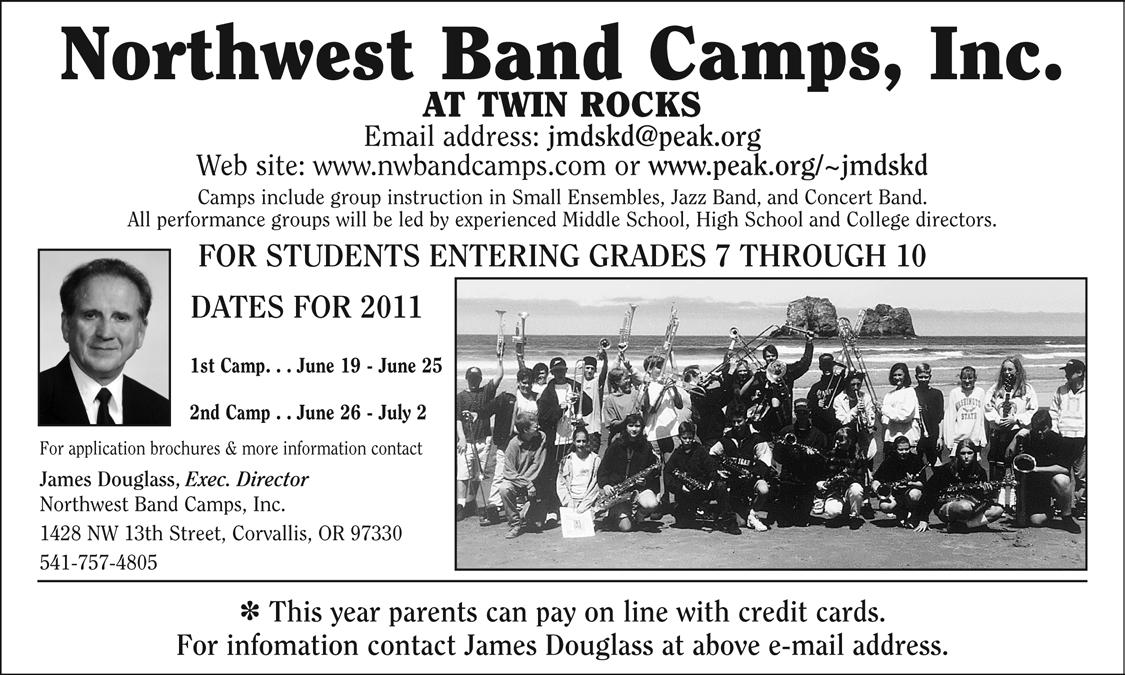
Jupiter Band Instruments • Maja sommerlatte PO Box 90249, Austin, TX 78709-0249 mrosch@jupitermusic.com, www.jupitermusic.com
JW Pepper • Pat Howland PO Box 9800, Tacoma, WA 98409-9800 phowland@jwpepper.com, www.jwpepper.com
Kemtone Repair & Music Company • Charles "Randy" Kem 1450 21st st. NE, salem, OR 97301 http://kemtone.com
Marcinkiewicz Co. • Zack Marcinkiewcz 593 sE 1st Ave, Canby, OR 97013 www.marcinkiewicz.com
Mr. Formal • Jennifer Hagedorn 1205 sE Grand Ave., Portland, OR 97214 jhagedorn@mr-formal.com
Neil A. Kjos Music Co. • David Paul 4380 Jutland Dr., san Diego, CA 92117 dpaul@kjos.com, www.kjos.com
New Horizons Tour & Travel • Tish Brown/Adam Chipman 2727 spring Arbor Rd , Jackson, MI 49203 adam@nhtt.com, www.nhtt.com
Oregon symphony • Monica Hayes 921 sW Washington, ste. 200, Portland, OR 97205 mhayes@orsymphony.org, www.orsymphony.org
Pepwear • Paul Proctor 1031 Eastgate Dr., Midlothian, TX 76065 les@music-ts.com
Peripole-Bergerault, Inc. • sylvia Perry and Andrew Perry PO Box 12909, salem, OR 97309-0909 contact@peripolebergerault.com www.BergeraultusA.com
Portland state university Music • Debbie Glaze P.O. 751, Portland, OR 97207 glazed@pdx.edu
Portland Youth Jazz Orchestra - PYJD • Michelle Medler 3631 sW Huber st, Portland, OR 97219 shell@medlerstudios.com, www.pyjo.com
Portland Youth Philharmonic • Ingrid Arnott 421 sW 6th Ave, ste 1350, Portland, OR 97204 ingrid@portlandyouthphil.org
sheet Music service • Gordy Reece 810 sE sherman st, Portland, OR 97214-4657 www.sheetmusicservice.com
university of Oregon school of Music scott Barkhurst/Ceci Lafayette 1225 university of Oregon Eugene, OR 97403-1225 scottb@oregon.uoregon.edu/music.uoregon.edu
Wally’s Music shop • steve Bond 607 Washington st., Oregon City, OR 97045 wallysmusic@wwi.com
World Projects, Inc. • Keith Bishop 195 Glen Cove Marina Road, ste #201 Vallejo, CA 94591-7291 www.world-projects.com, keith-bishop@world-projects.com
Yamaha Corporation of America Band & Orchestra Division
Larry Chamberlain/Melanie Walker 11410 NE 124th st, PMB 521, Kirkland, WA 98034 lchamberlain@yamaha.com, www.yamaha.com/band
Yamaha Corporation of America Music in Education Adria Lewis/sallie McCaffery/Christi Brown 6600 Orangethorpe Ave, Buena Park, CA 90620 csoto@yamaha.com, mjwalker@yamaha.com
This article should be chock full of items pertaining to the upcoming NW Divisional Conference in BELLEVuE; THE NEW BELLEVuE. But first, some exciting news about the health of MENC and NWMENC – which will also connect to BELLEVuE.
sometimes the leadership side of MENC gets very lost in the events, publications, and the seeming bureaucracy of such a big, national entity. I’m happy to report that you, as members of both the state MEA and the national organization have been really well represented by your current state President, Jeff simmons. He has seamlessly stepped into the shoes left by Christopher silva and has continued to represent the music teachers in Oregon quite admirably. He recently attended the 2-day Northwest Board meeting in Portland, where we were led by our new MENC Executive Director, Michael Butera, and new MENC National President, scott shuler. We participated in two days of discussion and information sharing about the new directions and structures evolving in the national MENC agenda. Before I expound on these exciting new developments, I want you to know that you can meet and hear from these national guys in February at the conference in BELLEVuE! Both Michael and scott will be giving sessions and be happy to meet and converse with their new friends in the Northwest Division. I hope you will take the opportunity to seek them out in BELLEVuE, either at the MENC Resource shop, or anywhere you spot them.
The NW Board meeting in Portland was especially important because it marked the FIRsT TIME that MENC had funded every officer from every state in the division to meet together and discuss important topics and trends. Presidents, Past-Presidents and Presidents-Elect from six states were invited and almost all were able to attend. As well, the importance of the event was
underscored by the appearance of the National President AND the Executive Director. The energy, focus, and commitment to serving the grassroots music teacher by the national organization is front and center in Michael Butera’s agenda, and you will quickly find that he has the bandwidth, depth of experience, and personality to transform the “feel” of MENC to those of us in the western united states. scott shuler’s work on music education in the 21st Century is important, controversial, and guaranteed to start a spirited conversation. Just ask JEFF about it! All of this leadership energy and vision adds up to a more visible, a more intentional, and a more supportive structure from our National Office.
Now, on to the NW Conference:
If you’re looking for:
Professional performances in a world-class acoustic: Pinchas Zukerman Solos With The Seattle Symphony In Benaroya Hall Local Advocacy Pre-Conference Workshop Featuring Gerald schwartz, Peter Boonshaft, Michael Butera, scott shuler, Pinchas Zukerman, to name just a few dignitaries
Debbie Glaze MENC NW Division President
MENC NW Division President
Great headliner clinicians in Band, Orchestra, or Choir: Peter Boonshaft, Robert Gillespie, And Ethan Sperry
New ideas for General Music classes: John Feierabend (Keynoter And Kodaly Sessions), Rick Layton And Jaque Schafer (Orff Sessions), John Jacobson
New Literature Ideas
Thursday Night Reading Sessions For Choir, Band, Orchestra, And Elementary Drumming
Concert Hours By Groups From Throughout The Northwest Great Conductors and Performers in Concert All Northwest Band, Choirs, And Orchestra In Benaroya Hall
sessions for Particular Interest Groups: Small Schools Gurus Advocacy And Leadership Focus Teachers of the Future Collegiate Strand Of Focused Sessions Social Time With Collegiates From Throughout The Nw Leadership Focus
Fun! Social And Hang Time! Connection With New And Old Friends!
Bellevue; The New Grand Hyatt Hotel, The Many Great Restaurants, Theatres, And Night Spots Within Walking Distance.
All details are available on www.wmea.org s EE YOu THERE!
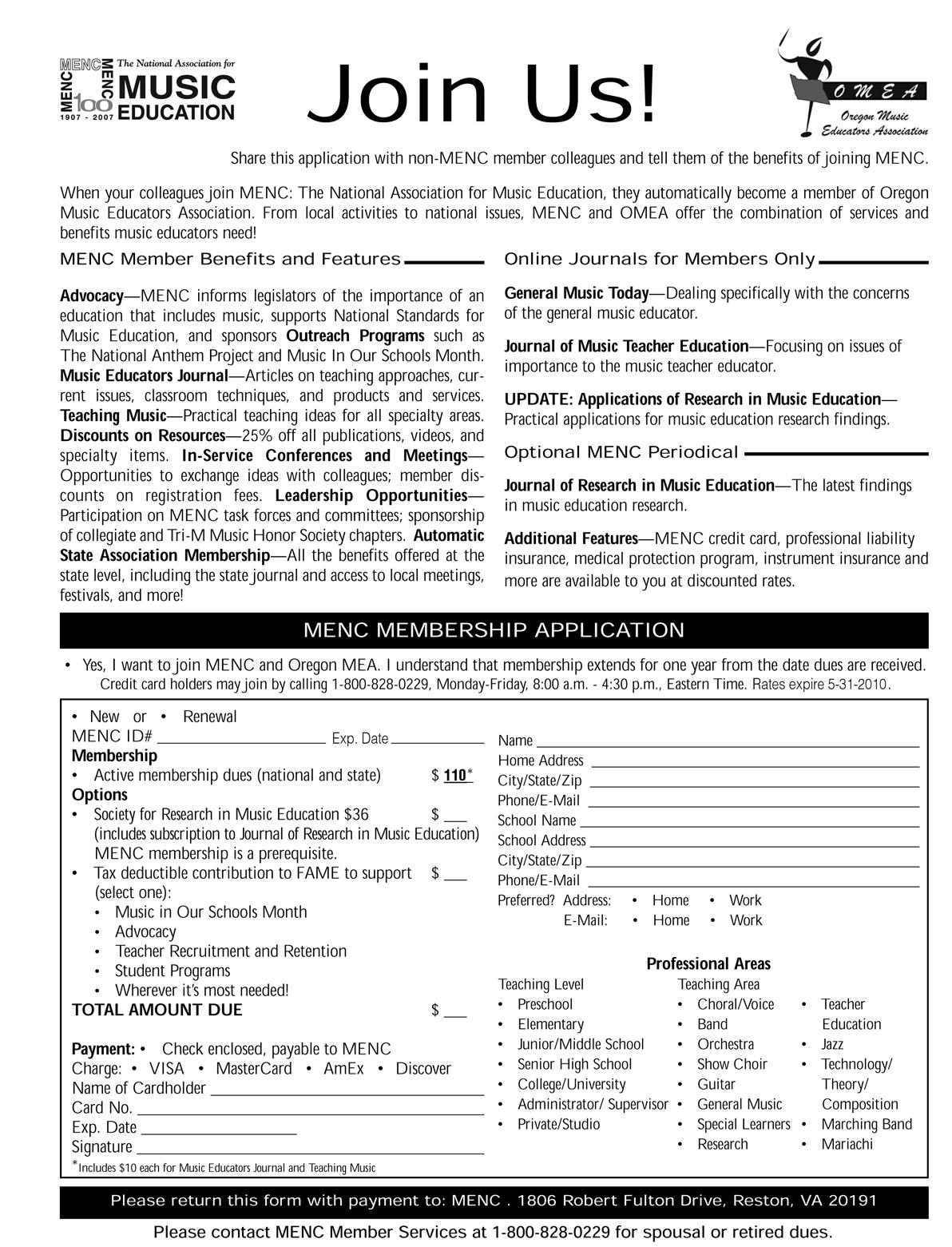
Greetings Friends and Colleagues!
As I write to you, the temperature has just broken zero, there is eight inches of snow in the yard, and we are preparing to host family and friends for the Thanksgiving holiday. You and I are preparing ourselves and our students for our annual gathering of friends in Eugene in January, and OMEA has begun a new friendship with the Oregon Department of Education (ODE).
spread across the state, OMEA has over 1200 members in every corner of the state. As we move into these more tumultuous budgetary
times in the coming year, your OMEA board is working to create friendships with organizations and politicians who can help our cause and who are dedicated to music education. We need your help on this venture. Within our classrooms, we have, or have had, students or children or grandchildren, of people that are involved in Oregon politics. We are looking for politicians who will champion “Music Education taught by Music Educators”.
Please send us the names of the people that you have influenced with our profession that you would consider a friend of music education. You can e-mail me, or contact the OMEA office, tell your district chair, or shout it from a mountain top - just let us know.
Our sense of family is important within OMEA, and our other friends are just are important. We
Jeff simmons OMEA Presidentneed them now. Our new friends at ODE have agreed to work with us to include music in the reporting of the educational progress of schools and students.
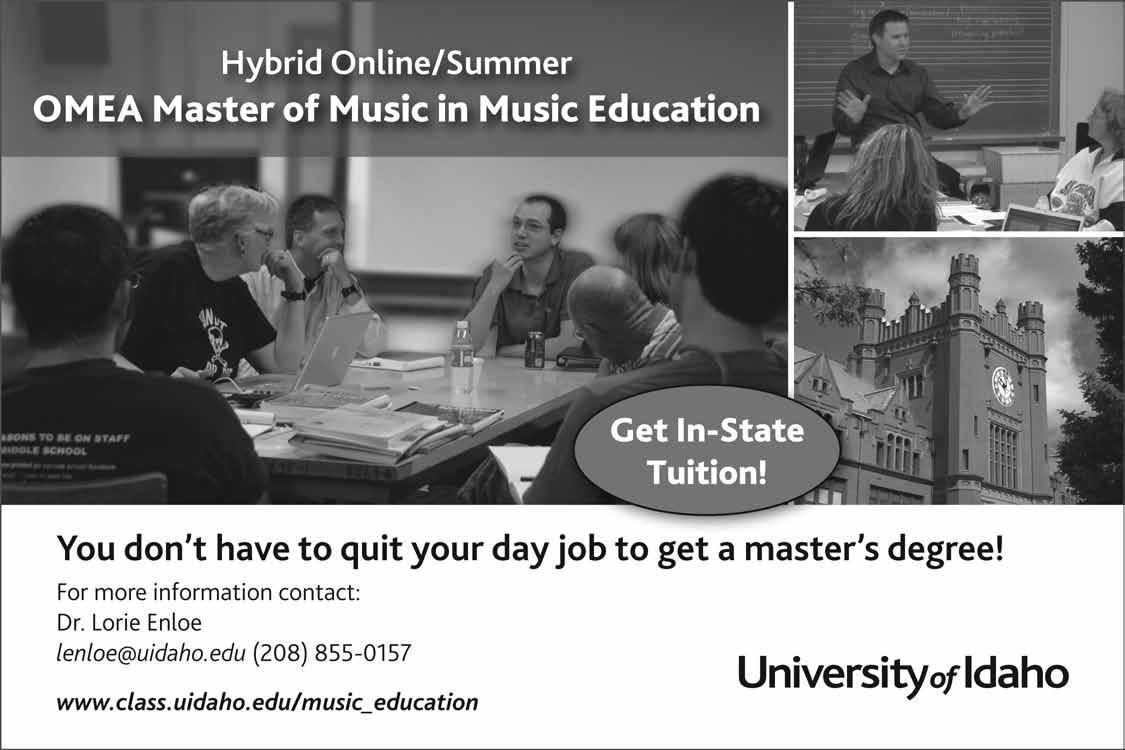
Did you know that NCLB lists the Arts as a core subject? This bit of news was information to our new friends at the ODE, and I was honored to share that information on your behalf. I would be equally honored if each of our members was to share that piece of information with one policy maker or leader within our state, be it a Principal, school board member, city councilor, state Legislator, or a voter.
We can never have too many friends, and we all need to work towards rallying and empowering all of our friends to help our cause. I look forward to seeing all of you in Eugene!
Jeff simmons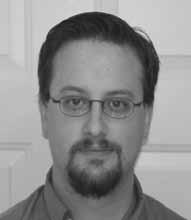


Part Three of Three- Introductory Comments from the All State Middle School Performance, January 2010
When I was growing up in southern California, music touched my life one morning in a very personal way and I will always remember that day. It was my father’s birthday, and early in the morning we heard a knock at the door. It turned out to be my grandmother and my stepgrandfather. They had brought a record with them and a hi-fi -that’s what we called stereos back in those days. And I remember them plugging in the hi-fi and putting on the record and hearing a mariachi band play “Las Mañanitas,” which is a traditional Mexican song that’s played for you on your birthday.
I won’t sing it here.... Trust me; you don’t want me to sing it here. But here’s a bit of the translated lyrics of “Las Mañanitas,” which literally means “The Little Mornings”:
Wake up, my love. Wake up and see the sunrise.
The birds are singing; the moon has set. The morning is coming now; the sun is giving us light.
Let me tell you, that song sends me back to that moment all those years ago. That’s the power of music in our lives. When we hear or play music, we respond in the deepest core of our being.
Anthropologists tell us that song started with the cavemen, that it even predates language. They speculate that our prehistoric ancestors sang and clapped hands, maybe even drummed on the hollow skulls of wooly mammoths.
That’s why a Gallup Poll taken some years ago, but which I think it still relevant today, indicated that 95% of Americans consider music part of a well-rounded education. There are also some studies out there indicating that students who take music do better in math and reading and even score higher on the sATs. What remains indisputable is that music awakens our minds and our spirits to new possibilities.

And I mean that literally. Music is integral to
neural development, getting those synapses firing in our brains.
And music feeds our souls. Who isn’t moved to tears by “Ode to Joy”? Who can’t help but smile when they hear “Louie Louie”? Or dance when they hear “It Don’t Mean a Thing If It Ain’t Got that swing”?
But sadly, as I’m sure everyone here is aware; music education has taken a hit in our schools. All kids suffer when music gets cut -- and none more so than those children on the wrong side of the achievement gap. They may not have the resources to access the arts outside of school. so when their school is forced to cut a music program, that student’s chance to learn an instrument, to really learn music, may disappear. And that’s a tragedy.
so I am asking everyone in this room to redouble their commitment to the arts -- and especially music -- in our schools. Let your school boards know how much you value music in your curriculum. Tell your principals and teachers, too, and ask them what you can do to support music in the classroom. Do anything and everything you can to keep music alive in our schools... ALL our schools.
Val Ellett – General Music Chair for OMEA and K-5 general music specialist in the David Douglas school District. Her strengths lie in her ability to rally a community to attend music events and performances. Val likes to get people involved.
As the new Chair, of the new Advocacy Committee for the Oregon Music Educators Association, I am excited and ready to lead this extremely talented and dedicated committee. As we begin to learn the most beneficial and expeditious ways to advocate for music programs throughout the state we will rely on you to keep us posted as to your specific needs. Advocacy can be defined as the act of pleading for, supporting, or recommending; active espousal. We as music educators need to learn to be our own best cheerleaders and begin to promote and lobby for our own programs.
I would like to take this opportunity to introduce our Advocacy Committee members:
(Chair) Cherie-Anne May – 30-year teacher with experience at K-12 music (general, orchestra, band, and choral) and mathematics. Currently, Cherie-Anne, is a TO s A with David Douglas school District serving as Coordinator of Gifted Programs and Music. Cherie has seen programs come and go over her tenure in Portland and David Douglas public schools..
Jane Howell – Co-Executive Director of OMEA. Jane is the former director of a Regional Arts Council in Eastern Oregon. she was a founding member of the Oregon Alliance for Arts Education. Jane has been an advocate for arts education for over 20 years.

Frank Petrik – Currently teaching band at sherwood High. Frank has experience at the middle and high levels. During his tenure in Portland, Frank saw many students in North Portland that needed theatre, arts, and music classes to provide them with the inspiration they needed to express who they were.
Tracy Ross – OMEA Treasurer and currently director of bands at sheldon H s in Eugene. Tracy has experience at all levels and was the WHOLE program in Harrisburg for 3 years. s he has a wealth of experience that ranges from opening a brand new school to being a TOsA.
Christopher silva – OMEA Past President and currently vocal director at David Douglas High school. Christopher has elementary middle and high school choral backgrounds. Christopher previously taught in salem, and led the u of O Children’s Choir.
Kathleen Gould – Currently teaching band at sherwood Charter school. Kathleen believes that sharing information about how students who are successful in music are also successful in school and life could be a key way to advocate.
As a result of our first meeting in November, we developed the following three goals:
• Create a usable, accessible toolkit for advocacy to distribute at the 2011 All- s tate Conference.
• Collect data from individual members and non-members in the state to communicate the fidelity of existing programs. Parse that data to drive our future steps.
• To develop an active communication network to support music education in Oregon.
As we move forward into our next meetings we hope to provide OMEA members with usable tools to begin to advocate for their own individual programs. Too often we bring in the troops after the major battle has already been fought. Being proactive and sharing the wonderful things we all do with students can help us in our task to keep music alive in Oregon. Look for these tools in future editions of the OMEA journal and in literature that will be available at the conference in January. Please contact any of the committee members with the ideas and resources that have been successful in your programs or ideas you would like to see considered as we move forward. Join our advocacy efforts by looking at the “save the Music Foundation- Toolkit” http://wwwvh1savethemusic.com/node/46 and start advocating for your programs today!

Now is the time… where all of your actions will determine the
As anyone reading this article knows, it's tough out there right now for schools; it's even thougher out there right now for most music programs. Districts across the country are facing steep budget cuts in the face of increased accountablility and punitive outcomes for not meeting annual yearly progress requirements. Tet, in light of this bleak educational landscaape, there are districts that are making the arts available for their students.
s ure, you say — the very wealthy suburbs where parents are almost overly involved in the school system and demand arts programs with their voice, votes and wallets. Absolutely. Yet, districts like Indianapolis Public schools, where the overall free and reduced lunch rate stands at 84%, and 75% of the students come from single parent homes, they recently restored instrumental music programs in all of their schools.
My question to all districts out there is: if Indianapolis can completely restore instrumental music education in their district with their challenges during this fiscal climate, then why can't every district have a strong, vibrant arts program? It takes a committed administration and staff –from the superintendent and school Board to the classified staff – who not only undersstand the value of arts education for their students, but who proioritize the arts alongside the other core academic subjects. That's where we arts educators and advocates must get to work.
I assume that most readers of TRIAD are currently music educators concerned about keeping and strengthening their existing programs. My experi-

ence also tells me that you may view advocacy as a great unknown that demands a tremendous amount of time you don’t have. As a certified music teacher, I can relate to the fact that advocacy is not often taught in teacher training programs, and finding extra time in, your already expanded work hours is fanciful, at best. It’s probably not listed in your job description; yet, here it is looking you in the face. In a perfect world we would focus all of our time on teaching and learning, but the reality of the music teacher is not so simple. Here’s the good news – advocacy is not as difficult and painful as you might imagine.
The first thing you should know about advocacy is that it is never too soon to start, Moreover, if you wait for a crisis, or even a threat of a crisis, it may be too late.
start your advocacy work by getting your students in front of as many people as possible as often as possible. This can be as simple as having an ensemble performing in the entry of your school building as students are arriving in the morning. Advocacy starts with visibility; this is one place we have a wonderful advantage over our reading and mathematics colleagues. Find opportunities to have students perform during teacher professional development days, staff meetings, school board meetings, during any gathering of adults or students—PTA, Parent Teacher Conference days, etc. Make sure that everyone knows about your students’ accomplishments. Imagine the possibility of the English teacher struggling to reach Kyle in her class while seeing him shine in a brass quintet. Those moments can do more to strengthen your program than years of talking about the benefits of arts education.
Fill your school with music and then reach out into the community. Find any hub of activity in your community where you might be able to
have an ensemble perform, and then make the offer. If you live in a community of commuters, find those transit hubs, bus stations, park and rides and take students there. Go to preschools, senior centers, and nursing homes, and hospitals. Think about the entire population of your community, and make an effort to reach as many of the various groups as possible. They vote or their parents vote. They need to KNOW what’s happening in their schools - not what they hear in the media. I mentioned Indianapolis at the beginning of this article—I’m amazed that after 10 years of rebuilding music programs and making concerted efforts to tell that story in the media, many people still assume there is no arts education in Indianapolis Public schools. (How many of you are aware that Cincinnati Public schools is closing in on the same accomplishment?) Too often the general public is led to believe that no good news is coming from their school district. Be the voice that tells them otherwise. Convince them they must vote for the next tax levy that will fund your program and why they need to be aware of a future school board member’s stance on issues like arts education. This is advocacy.
The next step in advocating for your program is to build your “army.” Do this now; do this often. s tart by forming a “boosters” group with the parents of your current students, They are an amazing resource and are coimpletely engaged with their children and your program. Don't think of them solely as your sales team to fund the next Disney trip or next set of Orff instruments. Your boosters have a powerful voice in the school community, and are your most passionate supporters. However, your troops should be larger in number and diverslty than just the Boosters. your current and former students are great source of support, as are their parents and grandparents. The question is how to engage these people. Technology you may already be using can come into play—Facebook. I’m constantly amazed at the power of social media. As a quick example: a band director in one district walked into her

classroom at the beginning of the year and found an empty supply closet despite her strong, growing program. she smartly put together a request through DonorsChoose.org and asked for support. After a few weeks went by and little had happened, she posted her request to her Facebook page, Friends saw this and supported the request—AND—then posted their support to THEIR Facebook pages. Within two days the request was fully funded and her students had the reeds, mouthpieces, etc. they needed. While this is a fundraising example, the same principle applies to advocacy. start a Facebook fan page for your school music program and let your students know you are doing it. Connect with them, their parents and grandparents, and with your former students and their parents—you get the idea. Build your army, and keep them engaged. update your page often by posting photos and videos from concerts. Advertise your upcoming concerts and community outings. use this as another way to remind your students to bring their uniforms to school tomorrow for their performance. They are more likely to login to Facebook when they get home than read the piece of paper you asked them to take home. Make sure you have the appropriate permissions, but use these free tools to your advantage. If you have your army assembled, it is far easier to do battle when the crisis comes.
One important and related note about advocating for your music program is that when it comes time to make the question or the demand, the music teacher should take the back seat. Regardless of the content of the message, when a music teacher is the one making the question or demand, it sounds like that person is concerned about his or her job. When a parent or student makes the same request or demand, it is clear they are talking about the students. Assemble your army, give them their marching orders and speaking points, and then buckle up in the backseat.
That leads to my most important note, advocacy should always be kept student centered. Most everyone involved in education—from the school board, to the superintendent, principals, teachers and librarians—all got involved to help students. The adult issues get in the way and occupy far more of our time than we'd like; but at the heart, we're all in this for the kids and
you need to remind everyone of that. Every argument you make, every statistic you quote should be about what the arts can do for your students. If you are advocating for a staffing position—perhaps an Arts supervisor at the District Office—your argument should be about what that position does (or can do) for the overall arts education program in your district and what that means for students. The moment you mention a name, it becomes about their job and that becomes an argument about finances. That is much harder to combat when you are trying to balance a budget.
I sincerely hope these brief thoughts on advocacy have changed your perception of what can often seem a daunting task. It's not as difficult as it seems and often fits nicely into what you are already doing. Knowthat you are not alone. There is a field of people out there in the trenches willing to share experiences and advice. Feel free to take a look at the resources on our website—www.vh1savethemusic.com— look for the Advocacy Toolkit under the “What You Can Do” section. Take a moment to read “25 Things You Can Do Today” under that section. It’s a list of ideas to help you think of a multitude of ways you can advocate for your program. If you see something we are missing—let us know!
Also make sure to look at supportMusic.com. This site has wonderful resources and through supportMusic, you can connect to a wonderful community of arts education advocates. Music teachers and district representatives are encouraged to join in the monthly conference calls. And don’t forget about the resources in your own backyard: Ohio Music Education Association advocacy materials (http://www.omea-ohio2.org/ Resourccs/Advocacy.html); the Ohio Alliance for Arts Education (www.OAAE.net); and Ohio Citizens for the Arts (www.OhioCitizensForTheArts. org). Together we can create many opportunities for advocacy locally, statewide, and nationally.
Finally, do not expect to find a magic bullet—it doesn’t exist. Every community is a bit different. And approaches that may fail in one place but work like a charm in another. We music teachers are a creative and resourceful lot—make sure to draw on that. You know your community better than anyone else, and have a sense of what will and will not work. similarly, don't expect someone to swoop in and save the day. Advocacy that strengthens, and at times, saves programs, happens at the grassroots level. While federal and state policy certainly affect education, dayto-day decisions happen at the district, and most often the school level. That's not to say you shouldn't reach out to other communities and organizations for advocacy support; just use that as a small piece in your overall plan. Despite these challenging times, decisions are being made in communities all around the country to support the arts. In can happen!
Rob Davidson serves as Program Director for VHI save The Music Foundation, working with, among many others, the Baltimore, Boston, Cincinnati, Hamilton Local, Houston, Indianapolis, Little Rock, Philadelphia and Washington DC s chool Districts to advocate for and restore music education programs. Rob joins VH1 save The Music after ten years experience in Education and Orchestra Management. Most recently, Rob served as the Director of Education and Community Engagement with the Brooklyn Philharmonic where, during his tenure, he doubled the number of services offered for NYC public school students and brought the organization inot the National music education advocacy arena. Before Brooklyn, Rob spent four years in the Education and Community Engagement Department at the Pittsburgh symphony Orchestra. Prior to his Orchestra Managemtn experience, Rob taught music and performed with Mendelssohn Choir of Pittsburgh in Pittsburgh, PA. Rob lives in New York City with his wife, Kristi and son, Jonah.
Reprinted with permission of TRIAD, the official publication of the Ohio Music Education Association, Lisa Hanson, editor. Not for further reproduction without permission of OMEA. Advocacy: It’s Never Too Early, Rob Davidson: Volume 78 (1), pp. 43-46, October/November 2010.

Michael-
Membership in MENC has not saved music specialists jobs here in Oregon or elsewhere. Closer to home it did not save my classroom. I am teaching in more than one school. Our school district cut music programs to balance the budget lst year. We are being told that music jobs will be the first to be cut this spring. HOW CAN A MEMBER s HIP IN MENC HELP?????
Thank you for listening to a frustrated elementary specialist.
(Email based on a compilation of emails)
Thank you for your very sincere and heartfelt note. Your message spotlights the deeply-troubling challenge that all of us on the MENC staff and our colleagues in the MENC membership are trying to face as a profession and as an association. In a world of test score mania and public unwillingness to pay for education, we individually and organizationally must struggle to find the necessary tools to win this fight and maintain teacher positions. It is a challenge worth our efforts!
The situation you describe in Oregon is like many others around the country where music programs are cut in a short-sighted attempt to enhance learning in other core subjects. I understand that it is difficult to see the value of MENC membership for an individual teacher, particularly when you have lost a job that you knew could have a positive impact on student learning.
All of us at MENC take our core mission -- to advance music education by encouraging the making and study of music by all -- very seriously. We work with any number of other groups to help decision-makers in education understand that for today’s students to succeed tomorrow; they need a comprehensive music education taught by exemplary music educators. That is, we try to help control the environment within
which music education functions so that you and other teacher can do your jobs.
I can offer you a summary of what we are doing to help educators like you have a secure and respected position in schools.
MENC serves as the national voice for music education, providing and seeking support for music programs at the federal, state and local levels. We actively seek out and participate in national-level policy discussions about education reform - giving a voice to music educators. s ome of the work we do involves legislation. A recent example of this is our involvement in the passing of the $10 Billion “edujobs” bill signed this summer in an attempt to save music programs and teachers’ jobs. That bill provided $117,949,095 for Oregon. Its impact on Oregon teacher jobs is to save an estimated 2000 positions. We know it was not enough. At the same time, 2000 or so of our colleagues are teaching today because of that effort. We wish every one of them was in music, but we cannot be divided by discipline, level or site. This is a struggle that requires solidarity for all of us.
some of the work we do is on a conceptual or public-relations level: for example, we’ve worked with the Partnership for 21st Century skills to point out the connections between music study and the skills that kids need to participate in the future. We partner with other arts education associations and also other education organizations to advocate for music programs for all students.
We provide teachers with professional development tools through our journals, conferences, and website that help them to improve their skills and enhance their professional learning networks.
We create and make available to everyone resources to help them save and support music programs in their community. MENC assists members by acting as a resource and advocacy hub, constantly analyzing data, identifying important new trends and converting research documents into user-friendly advocacy materials to be shared with potential music education supporters.
We’re working to train members in advocacy skills, provide personal support for those seeking immediate assistance on the ground, and formulate creative new methods of involving members in advocacy initiatives
We recognize that some of these efforts can seem to be too little, too late. We had occasion to talk to some reporters on the education beat in Oregon who told us that, in your state, the edujobs money merely plugged other leaks that the school board had identified in their funding, rather than helping bring back jobs from cuts that had been made in the spring. We are sincerely sorry that we were not able to do more to help the situation in Oregon.
But your real question, I believe, is about the future. Why indeed should you belong to MENC? You should belong because as a professional you have a stake in the long-term solidity of the profession, and MENC and our state federated associations are the groups that are doing the most to fix that long-term picture. As difficult as things might seem now, we can work better on these issues if we work together.
Your experiences both as a classroom teacher for 18 years and as a teacher whose position was eliminated are very valuable to us - and we can learn from you so that we can help others. If you wouldn’t mind, I would like to have our lead advocacy staff member, Chris Woodside, call you and talk with you about your experience. By listening to individual teacher’s stories, we can learn how to better serve you and the profession.
It is my sincere hope that you will soon be back in a classroom of your choice. Like you, I want to thank you for listening to our efforts. It’s understandable that, when you’re personally impacted, you try to find ways to conserve resources. I understand your frustration, but we can’t let our discouragement defeat our resolve to foster the value that music education brings to the student experience--or to support the individuals and organizations that devote their every work hour to correcting the problem. I hope that you will reconsider your membership decision.
Again, thanks for sounding off. We need people like you to continue the fight!
P. s . I have included below some additional information about MENC’s activities in support of music educators and our profession.
In the wake of the Obama administration’s release of its blueprint for the reauthorization of the Elementary and s econdary Education Act, MENC worked with the Association for supervision and Curriculum Development and a broad coalition of partners to develop a series of consensus recommendations for how the federal government can better support core subjects beyond reading and math—these recommendations are referred to as the “Whole Child Initiative.”
In conjunction with our partners in the arts, MENC developed a national and unified statement regarding the benefits of arts education— the statement identifies a series of legislative goals and is now being circulated for sign-on by a wide variety of organizations and other stakeholders within and outside the arts community
MENC was active in working to improve the “Race to the Top” and “Investing in Innovation Fund” rules
In addition to our continuing involvement with the reauthorization process for the Elementary and secondary Education Act, MENC is advocating for the inclusion of significant measures
Michael A. Butera Executive Director MENCfor music programs in all education reporting, including mandated report cards.

sincerely,
Michael Michael A. Butera Executive DirectorMENC: The National Association for Music
Education1806 Robert Fulton Drive
Reston, VA 20191
MichaelB@MENC.org

Oregon Music Educators Association
2011 State Conference
January 13th thru 16th
Hilton Eugene & Conference Center
Hult Center for the Performing Arts Welcome
Key Note Speaker- Peter Boonshaft
Banquet Performers- Trombones De Costa Rica
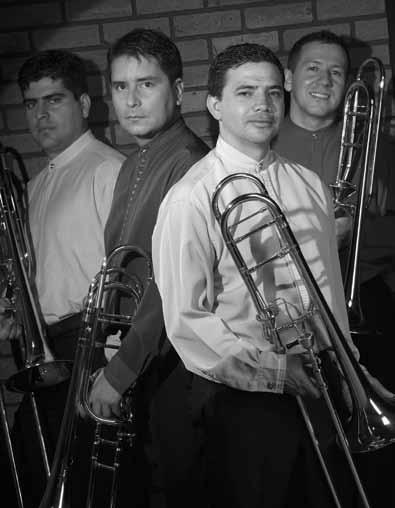
Special Guest- Scott Shuler, MENC President
All- state Choir Conductors
Elementary Choir- Judy Herrington
M s Young Mens Choir- steve Peter
M s Young Womens Choir- Mia Hall savage
H s Mens Choir- Jo-Michael scheibe
H s Womens Choir- sharon Paul
All- state Band Conductors
M s Band- Timothy Loest
symphonic Band- Eric Hammer
Wind Ensemble- Gary Green
Jazz Band- Wycliffe Gordon
All- state Orchestra Conductors
M s Orchestra-Gabriel Villasurda
H s Orchestra- Neal s tulberg
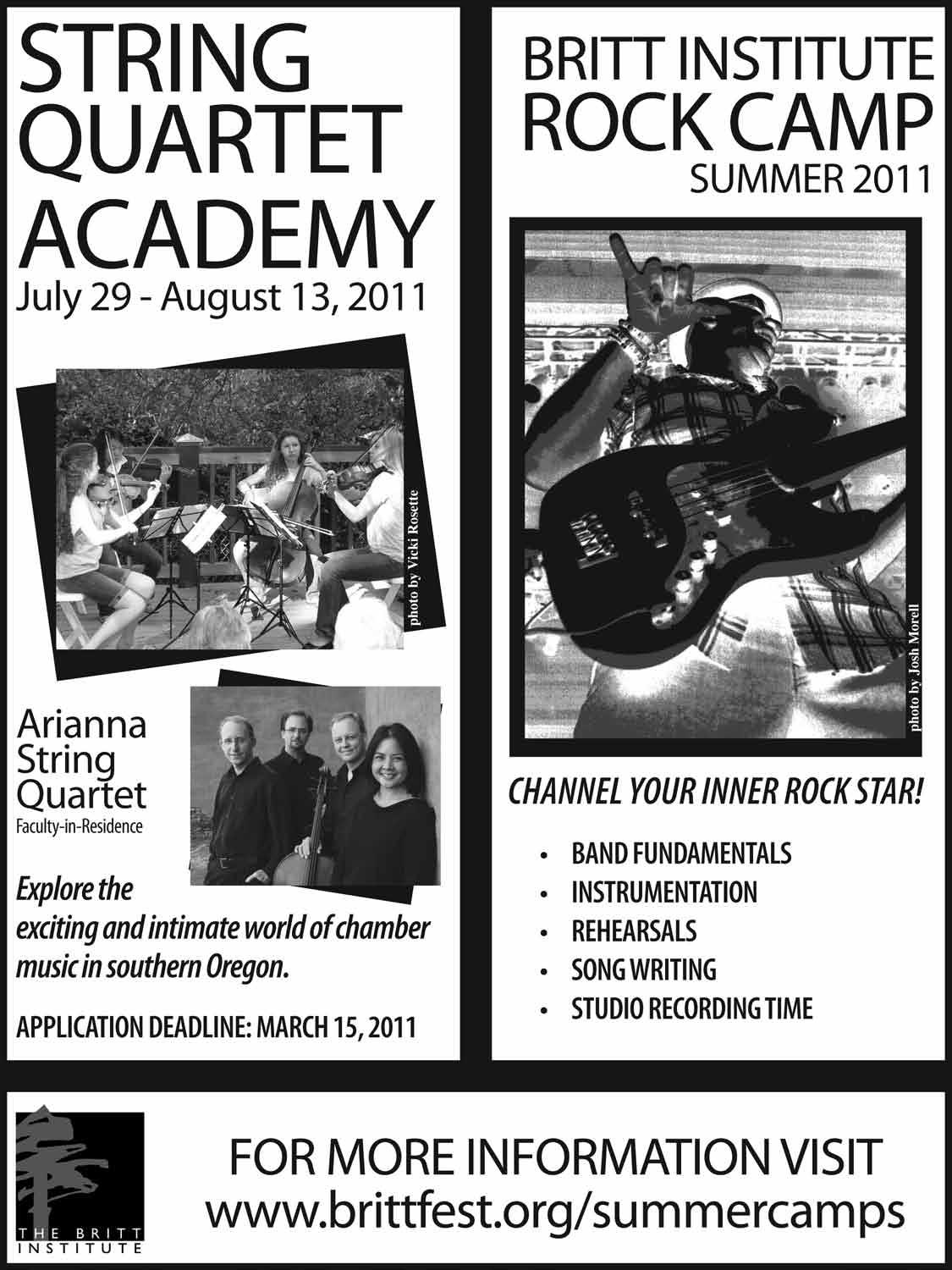
Greetings and welcome to the 2011 state Conference “Planting the seed of Inspiration”. It has been an exciting two years serving as your conference chair, thank you for your support and for allowing me to serve. I am grateful for the experiences I have had, the lessons I’ve learned, and the friends I have made. It has truly been an event I will never forget.
I am looking forward to seeing us join together for the saturday Evening Banquet and Celebration. The evening social hour will start at 5:30pm in the Hilton Lobby, there with food, drinks, friends and music from the Oregon state university steel Drum Band. At 6:30 the Banquet will start featuring a new Caribbean inspired menu. We will hear from MENC President, scott shuler as well an inspiring speech by Peter Boonshaft. The banquet will end with our guest performing group Trombones De Costa Rica. I guarantee it will be an exciting and memorable evening.
Our conference would not have been possible with out the hard work from the 2011 Conference Planning Team. The members of this team have put in countless hours working diligently to provide a quality conference for you and your students. An organization like ours cannot survive without people who are willing to sacrifice personal and family time to help the greater good. As an organization we need to thank them for the service they give year after year. If you see any of these people during the conference please give them your heartfelt thanks.
Elementary Co-Manager
Elementary Music Chair and Co-Manager
General Music Chair
Middle school Band Manager
Middle school Orchestra Manager
Middle school Girls Choir Manager
Middle school Boys Choir Manager
High school symphonic Band Manager
High school Wind Ensemble Manager
Donna Kagan
Kelsie Demianew
Val Ellet
Gene Burton
Brenda simmons
Julie Cherry
Brice Cloyd
Jennifer Brooks-Muller
David Hodges
High school Orchestra Manager Mark Barnard
High school Men’s Choir Manager
High school Women’s Choir Manager
Jazz Ensemble Co-Chair
Jazz Ensemble Co-Chair
Band sessions
Orchestra sessions
Choir session
Collegiate Chair
Bussing and Meals Coordinator
Housing Chair
Housing Assistant
Vendors and Booth Manager
Audio Visual Manager
Equipment Manager
Kim Kroeger
Robert Hawthorne
Joel Tanner
Larry Coates
Tom Muller
sean Williams
Joe Demianew
Dick Elliott
Brad Townsend
Mary Ann Vidourek
Ted Burton
Al Kato
stuart Welsh
Branden Hansen
Finally, I would like to thank our Executive Directors Jim and Jane Howell. Words cannot express the gratitude I have for them both. This conference could not have happened without them.
sincerely,
Ben Lawson Conference Chair/2nd Vice President
Times and locations subject to change.
A Comprehensive Musicianship Approach to Band
Touches: the Last Few Rehearsals before the Big Concert
No Place to Hide: Trials and Triumphs of the small Program
5:00 p.m. All- state Jazz Concert Wycliffe Gordon, Conductor Tina Bull soreng
5:30 p.m. Pre-Banquet Entertainment and salsa Bar, Oregon state steel Drum Band
6:30 p.m. Banquet and Celebration, ......................................................... Featuring Trombones De Costa Rica Hellman/Williams/O'Neill
Peter Boonshaft & scott shuler
use of Poetry and Rhyme in Your Music
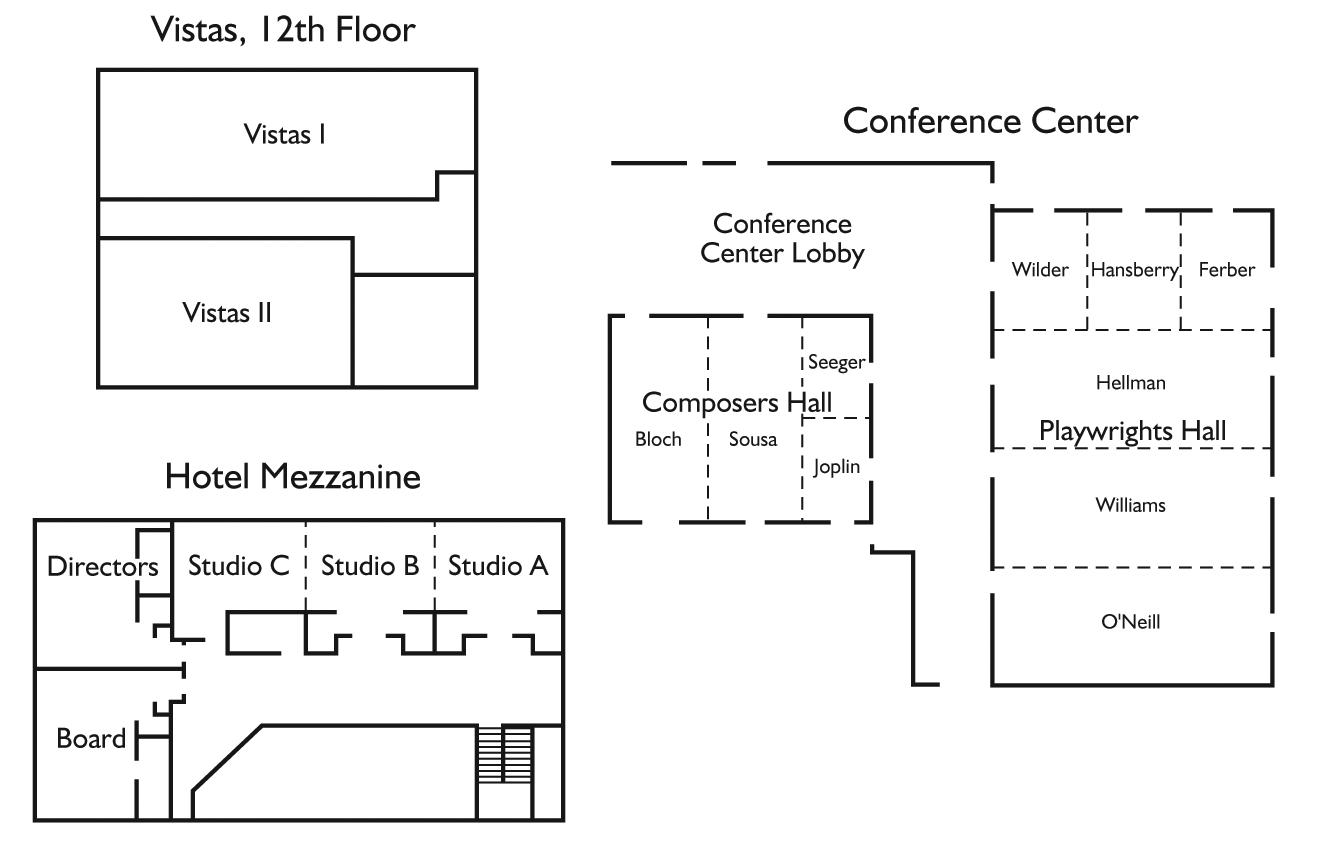
Vistas, 12th Floor
Hotel Mezzanine
(studio 1 - is in the Hult Center)
Hult Center (not shown)
silva Hall (Main Hall) soreng studio 1 (Downstairs)
Educational Travel
JW Pepper
Lewis & Clark
Marylhurst University
Masterpiece Fundraising
Mr. Formal
Noteworthy
Pearson
Peripole-Bergerault
Portland State University
Portland Youth Philharmonic
Southern Oregon University
University of Oregon Music
Wally's Music
Yamaha Musical Instruments
OMEA Advocacy Booth
Gracewinds Music
George Fox University
Oregon State University
Pep Wear
Beacock Music

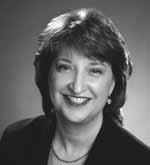
Concert: Saturday - 10:00 a.m.
Soreng Hall
Judith Herrington is the Founder and Artistic Director of the highly acclaimed Tacoma Youth Chorus, a choral education program of seven select choirs, grades 2 through 12, serving more than 240 young people in the south Puget sound region of Washington since 1991. Noted for its collaborations, Tacoma Youth Chorus, celebrating its 20th season, has performed with the Tacoma symphony Orchestra, Northwest sinfonietta, Tacoma Opera, Choral union, Northwest Repertory singers, the university of Puget sound Adelphians, and BalleTacoma. under Ms. Herrington’s direction, the Chorus has performed for National Orff-schulwerk Conventions, Northwest MENC convention and the Northwest ACDA conventions (1998, 2002, 2006, 2010). The Chorus has performed internationally as well, with cathedral tours in France, Eastern Europe and in Britain, Wales, and Ireland.
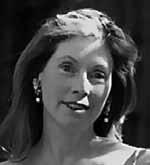
Tacoma Youth Chorus includes in its mission the opportunity for its members to study with outstanding directors including Jo-Michael sceibe, David Flood, Rodney Eichenberger, Rollo Dilworth, Henry Leck, Andre Thomas, Paul schultz, Geoffrey Boers, Brian Tate as well as composers Rollo Dilworth, Donna schultz, Brian Tate, Richard Nance and stephen Hatfield.
Ms Herrington brings more than thirty-five years of teaching and conducting experience to her work at Tacoma Youth Chorus and Charles Wright Academy in Tacoma, Washington, where she has received the Inspirational Faculty Award and the Murray Foundation Chair for Teaching Excellence. A graduate of the university of Oregon, Ms. Herrington earned her Master of Education degree from Lewis and Clark College in Portland, Oregon. she has furthered her conducting studies through master classes with Rodney Eichenberger and Henry Leck. she has served on the Washington ACDA Board as R&s Chair for Childrens’ Choirs, President and Past-President of the Board.
Ms. Herrington is highly regarded as a guest conductor, workshop and choral clinician. Most recently, Ms. Herrington has conducted all-state and regional honor choirs and festivals in Texas, Oregon, Washington, California, Hawaii, Montana, Wyoming, Pennsylvania, Alaska, Tennessee and Tokyo. A noted composer and arranger, she has published choral compositions, arrangements and co-authored choral teaching texts through Pavane Publishing, Hal Leonard Publishing and Colla Voce Publishing. she also edits a choral series for Pavane Publishing.
Saturday - 3:00 p.m.
Sousa/Seeger/Joplin
Develop skills that will make your music rehearsals and lessons more successful; skills that will make your teaching stick. Learn about timing, activities that energize, ways to inspire and motivate, physical movements that correct vocal problems, student management strategies that bring out the best in your singers, and specific teaching techniques that will make your ideas stick. This workshop is applicable for teaching all ages of students.
Vicki Brahbam is a local pianist, singer, arranger, and music educator. she is a music instructor and choral conductor at Lane Community College, where she directs the vocal jazz choir “spectrum”, as well as the Lane Gospel Choir. Vicki is an original member of the shedd Institute’s “Emerald City Jazz Kings” and can also be seen conducting musical theater projects in schools and community theater throughout the year. she accompanies the Women’s Choral society, Oregon’s oldest female ensemble. Vicki has enjoyed accompanying the All- state Elementary Choir since its beginning seven years ago. In her spare time, she enjoys cooking, travel, Duck Football, crossword puzzles, a good cup of coffee, and the everyday joys of life with her partner and 2 kids, Rene (11) and samuel (6).
Friday - 11:00 a.m.
Sousa/Seeger/Joplin
Experience a variety of seeds which inspire creative movement. Participants will experience a practical approach to including movement that is full of fun within the confines of a music curriculum. The session will be process based, but with outcomes worthy of performance.
Friday - 3:00 p.m.
Sousa/Seeger/Joplin
Music in early childhood should be full of whimsy, fun, and frolic . . . but with outcomes that cultivate the roots of musical competence; steady beat and singing in tune. serve up your primary lessons with a side of frivolity!
Saturday - 2:00 p.m.
Sousa/Seeger/Joplin
Explore creative ways of presenting classical music that your students will clamor for. Take it from a chore and a bore to music they’ll adore! Listening Lessons unlimited!
Bio: Darva Campbell is a career music educator. Her training includes an M.M.in Orff schulwerk from the university of Memphis, and all coursework for a D.M.A. in Music Education from the university of Memphis. she has certificates of Orff schulewerk training for Levels I, II, III, and Masterclass, and level I Kodály. Darva has taught music at every level from preschool through post-graduate, including posts at the university of Nevada, Las
Vegas; California state university, Chico; in the Alturas school District in California and the Beaverton school District in Oregon. Darva has been a movement specialist in Orff level training courses for many years, having taught Level I, and Levels I, II, and III movement at universities across America. In addition, she frequently presents clinics and in-services on the process of Orff- schulwerk throughout the united states and abroad.
Darva currently teaches music part time in two private schools in the san Francisco Bay area. she was born and raised in Oregon, and is happy to be back “home!”
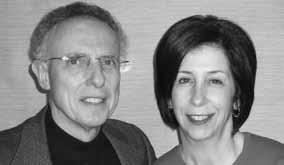
Saturday- 9:00 a.m.
Sousa/Seeger/Joplin
Come join us in a workshop that is designed specifically to meet the needs of K-3 music teachers. Music for beginning vocalists, movement and dance activities, introduction to drama and story theater, and teaching beginning rhythms are just a few of the many exciting topics that will be addressed. Free packets of educational materials will be distributed to attendees.
Saturday- 1:00 p.m.
Sousa/Seeger/Joplin
As both an art form and a valuable vehicle for interdisciplinary instruction, administrators and classroom teachers recognize the important contribution that music makes to the curriculum. This workshop identifies a number of approaches that can be used to incorporate other disciplines into the vocal music classroom. Character education, ecology, history, and readers theatre are just a few of the cross curricular topics to be shared with attendees.
Saturday- 4:00 p.m.
Sousa/Seeger/Joplin
Come sing with us in a workshop that will provide your students with a sound vocal foundation and immediate success as they begin their choral journey. A sequential approach to choral development will be shared beginning with simple rounds, partner songs, call and response, echoing, and building to traditional two part choral literature.
Bio:Dr. Michael and Jill Gallin have achieved national prominence as the country’s foremost composers of musical plays and choral music for youth in elementary, middle, junior and senior high schools. Their clever creations in story and song have consistently won awards from the Parents Choice Foundation , American Library service and As CAP. Their music has been featured and performed on the Disney Channel, The World’s largest Concert, PBs, the Macy’s Thanksgiving Day Parade, sing for the Cure, The New York Philharmonic, The Boston Pops, and in a documentary on children’s rights for the united Nations. In addition, the Gallinas
are recipients of the stanley Austin Alumni Award from the College of New Jersey for their many accomplishments in the field of composition.
Both Michael and Jill received B.A. degrees in music from the College of New Jersey. Jill was an elementary school music teacher before becoming a full time composer. Michael completed a masters degree in music from the College of New Jersey as well as a doctorate in administration and supervision from Rutgers university. In addition to his writing collaborations with Jill, he is the former elementary principal of the Angelo L.Tomaso school in Warren, New Jersey and author of “Making the scene”, an illustrated “how to” book for building sets, props and scenery, etc., for musical productions.
The Gallinas are inspiring teachers all across the English speaking world with their music and educator workshops. They have presented in service clinics at numerous state Music Educator conferences such as TMEA, OMEA, NJMEA, GMEA, CMEA, NCMEA, VMEA, FMEA, as well as colleges and universities including, Villanova, Lsu, College of NJ, Concordia College, Westminster Choir College and many more.
Their chorals have sold millions of copies and their musical plays have thousands of performances across the globe each year. They are educating, enlightening, and engaging youth of today with their consummate talents and creativity.
More information regarding the Gallinas and their music can be obtained by visiting their web site, www.gallinamusic.com or contacting them at michaelandjullgallina@gmail.com or www.halleonard.com
Elementary Reading session
Sunday- 9:00 a.m.
Sousa/Seeger/Joplin
The session will be a reading session on elementary school choirs music provide by JW Pepper and Oregon ACDA.
Bio: Debi Noel holds a Music Education Certification from the university of Oregon and Masters of Education from Oregon state university. she is an energetic, passionate teacher of music. she has been an elementary music specialist for more than 20 years, adjunct instructor at the university of Oregon, Pacific university, and Oregon state university, and is a certified Orff instructor. Debi has enjoyed directing and choreographing musical theatre productions for many area theatre companies including the Rose Children’s Theatre, Cottage Theatre and the Very Little Theatre.
Debi currently teaches music and directs the vocal music program at Oak Hill school in Eugene, Oregon. she is an instructor in the Department of Music at Lance Community College where she teaches music classes and directs the Concert Choir. Debi also directs the youth choir at the First Congregational Church.
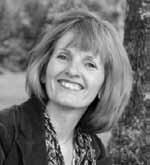
Friday- 2:00 p.m.
Sousa/Seeger/Joplin
For any number of reasons, modern American kids’ brains crave constant stimulation. Keep kids’ brains engaged by playing instrumental ensembles. Kids can play, sing, and create sophisticated music that will keep them engaged and give them ownership for the music they play. This session will cover how to teach ensembles, how to guide the kids’ arrangements, and how to differentiate for a variety of learners.
Sunday- 9:00 a.m.
Sousa/Seeger/Joplin
Get your youngest students playing the classroom percussion instruments in a meaningful way that prepares them for more advanced ensemble playing down the road. When instrumental parts are tied into the lyrics of folk songs, kids can develop a sense of beat and rhythm as well as learning correct names and techniques for standard classroom instruments. This session will cover how to link folk songs with hand percussion parts, correct instrument techniques, and classroom management during instrument rotations.
Bio: Mari schay teaches K-5 general music, choir, beginning band, and marimba band at Earl Boyles Elementary school in Portland, Oregon. she is a regular contributor to Activate! Magazine and has written three books for general music teachers: Behind Bars and Tube Jams, both available through Heritage Music Press, and Folk Music for Young Folk, available through West Music.
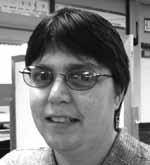
Mari holds degrees from Willamette university and Cincinnati CollegeConservatory of Music. she has performed and recorded with a variety of orchestras, new music ensembles, and pop music groups and is a former member of Boka Marimba, a Zimbabwean-style band in Portland.
Friday- 10:00 a.m.
Sousa/Seeger/Joplin
Hands-on drumming/singing/movement/xylophone/recorder session exploring root traditions that are the foundation of the World Music Drumming curriculum — now in thousands of schools throughout the world.
Friday- 1:00 p.m.
Sousa/Seeger/Joplin
A hands-on, voice-on, movement session that explores hand drumming in the Middle East, Europe, and the Americas. Learn how to teach the other 80% of students we’re not now reaching.
Friday- 4:00 p.m.
Sousa/Seeger/Joplin
Hal Leonard’s new Essential Elements for Guitar by Will s chmid and Bob Morris will help you teach a comprehensive curriculum - great pop/rock tunes, solid sequence, attractive audio support. Learn how active learning through guitar can reach more students.
Bio: Will schmid holds a B.A. from Luther College and a Ph.D. from the Eastman school of Music. His public school teaching included general music, choral music and band. He taught at Winona state university, university of Kansas, and university of Wisconsin-Milwaukee. Will is also a past-president of MENC — The National Association for Music Education.
schmid is a program author for Pearson’s 2002 and 2005 silver Burdett Making Music series. He is the principal author of the world’s #1 selling Hal Leonard Guitar Method and over seventy other books/CDs/DVDs for drumming, guitar, banjo, strings, and choral. Dr. schmid is also the principal author/editor of an 8-volume high school choral textbook, something New to sing About (Glencoe/G. schirmer). He has given workshops throughout the united states and in Australia, Canada, Japan, Mexico and Europe. After a two-year $ 140,000 national pilot project in twenty schools nationwide, Dr. schmid launched the World Music Drumming curriculum (included in Drumming units of Making Music grades 6-8) which brings the excitement of African and Latin drumming and singing to schools throughout the united states. Recent additions to the World Music Drumming publications include New Ensembles and songs (Hal Leonard), the World Music Drumming Choral series (Hal Leonard), and More New Ensembles and s ongs.

Dr. schmid is the recipient of the 1996 Distinguished Alumnus Award from the Eastman school of Music. In 2002 he was named a Lowell Mason Fellow by MENC and given the Distinguished service Award from the Music Industry Conference (MIC). In 2006, he was named the inaugural winner of the DeLucia Prize for Innovation in Music Education given by the Mockingbird Foundation.
During his presidency of MENC (1994-96), Dr. schmid worked to reestablish the importance of active music making in schools and in America at large. MENC created new partnership initiatives in the areas of guitar, keyboards, strings, drumming, and singing as exemplified by the Get America singing . . . Again! Campaign and the GAMA/NAMM/MENCsponsored Teaching Guitar workshops.
Sunday- 10:00 a.m.
Sousa/Seeger/Joplin
This session will inspire you to release creativity within your students. Imagination is awakened by setting up your classroom as a “Free Expression” environment. It opens the door to your students’ creativity in dance, drama, and music. We will be using “Poetry in Motion.” This
includes movement, body percussion and drama to interpret rhyme. To facilitate your students’ abilities to write and express themselves creatively, we will be using imaginative choreography through student-led compositions. These ideas will inspire you to begin working with your students in a brand new way.

Bio-Lavonna Zeller-Williams-Bratschi For over 20 years, Lavonna ZellerWilliams-Bratschi has been a much sought after vocal instructor in the Portland, Oregon metropolitan area. she is a professional musician and music educator. specializing in teaching music and movement to children from kindergarten to sixth grade, Zeller-Williams-Bratschi has organized a vibrant curriculum based up the Brain Dance methodology but taking it to different levels.

Concert: Friday - 7:15 p.m.
Silva Hall
With more than 25 years of choral education experience, Mia Hall savage is known for her excellence in choral artistry, along with her enthusiasm and passion for conducting young people.
Mia is the Artistic Director and founder of the Pacific Youth Choir, which has grown to include 240 singers in eight choirs since 2003. since its inception the choirs have enjoyed collaborations with Portland’s finest artistic groups including: The Oregon symphony, Oregon Ballet Theater, Whitebird Dance, Portland symphonic Choir, Portland Chamber Orchestra, Portland Youth Philharmonic, Pink Martini, and Aurora Chorus.
Pacific Youth Choir was greatly honored March 2009 to perform at the 50th Anniversary National Convention of ACDA in Oklahoma City. In 2008, PYC was also honored to perform at the Northwest Regional Conference of ACDA, in Vancouver, Canada.
This past season the choir performed with The Oregon symphony in three performances, Oregon Ballet Theater, Chanticleer, The Pink Martini Band both in recording and concert, with Hirvo surva from Tallin Estonia, as well as ending the season with Poulenc’s Gloria in collaboration with Portland Youth Philharmonic Orchestra.
Mia holds Bachelor’s and Master’s degrees in Music from the university of Oregon. she studied further in stuttgart, Germany while singing in choirs under Helmuth Rilling and Frieder Bernius. she has continued her conducting studies with Rodney Eichenberger. Mia currently serves on the university of Oregon, school of Music Advancement Council, served as Membership Chair on the ACDA state Board, and was co-chair for the ACDA 2006 NWACDA Middle school Honor Choir.
Session: Saturday - 3:00 p.m.
Vistas 1
Concert: Friday - 6:30 p.m.
Silva Hall
Mr. Peter began his teaching career in Wichita, Kansa in 1975. While with the Wichita Public schools he taught all grade levels, elementary through high school music. In 1984 he relocated to Portland, and taught for Portland Public schools at Roosevelt High school and Portsmouth Middle school before he transferred to Reynolds High school and H.B. Lee Middle school in Troutdale. In 1988 he returned to Portland’s Cleveland High
school where he spent 18-years as Director of Choirs. In 2006, he transferred to Wilson High school hoping to revitalize their choral program. While at Cleveland and Wilson High schools, Mr. Peter’s choirs qualified every year for the state Choir Championships (May 1989-May 2010). Cleveland’s, “A” Choir appeared at the 1995 NW MENC Conference in spokane, the 1996 OMEA Conference in Eugene, the 2003 NW MENC Conference in Portland, and the 2006 NW ACDA Conference in Portland.
steve is an active adjudicator specializing in sight-reading and choral literature; he has also served as Repertoire & standards chair for both the High school and Multicultural/Ethnic Committees.


When not working with choirs, he likes climbing mountains, having logged hundreds of hikes (and vertical feet) in the Columbia River Gorge, the western united states and British Columbia. As a recent retiree, my partner and I even managed to take a Yosemite National Park vacation this past september... during the school year...and there were no crowds.
Session: Saturday 9:00 a.m.
Vistas 1
Concert: Sunday - 1:00 p.m.
Silva Hall
sharon J. Paul is chair of vocal and choral studies and director of choral activities at the university of Oregon, where she teaches graduate courses in choral conducting, repertoire, and pedagogy, and conducts the Chamber Choir and university singers. she earned her D.M.A. in choral conducting from stanford university, an M.F.A. in conducting from uCLA, and a B.A. in music from Pomona College.
From 1984 to 1992, Dr. Paul served as director of choral activities at California state university, Chico, where she directed a large choral program and taught undergraduate and graduate courses in conducting, choral literature, and the humanities. In 1991 Dr. Paul received the Outstanding Teacher Award at C su, Chico.

Dr. Paul served as artistic director of the san Francisco Girls Chorus (s FGC) and conductor of Chorissima and Virtuose, the organization’s acclaimed performance ensembles, from 1992 to July 2000. under her leadership, the chorus released four compact discs, premiered major works by composers such as Chen Yi and Jake Heggie, represented the united s tates at four international festivals, and performed at the CMEA state conference, the ACDA Western Division conference, and the International s ociety for Music Education’s international conference.
Dr. Paul has presented interest sessions at regional, state, division, national, and international music conferences. she appears frequently as adjudicator,
clinician, and honor choir director throughout the country, with recent engagements in Pennsylvania, Florida, New York, California, and Hawaii. university of Oregon choirs under her direction have performed at MENC state and divisional conferences, and at ACDA Northwestern Division conferences. In April 2011, the university of Oregon Chamber Choir will represent the united states at the 12th International Choir Festival in Tallinn, Estonia.
Session: Sunday 9:00 a.m.
Vistas 2
Concert: Sunday - 2:00 p.m.
Silva Hall
Jo-Michael scheibe chairs the Thornton school’s Department of Choral and sacred Music and serves as National President-Elect of the American Choral Directors’ Association (ACDA). Over the past two decades, scheibe has conducted ensembles at six national ACDA conventions, and has collaborated with Luciano Pavarotti, José Carreras, salvatore Licitra, Maria Guleghina, Helmuth Rilling, sir Colin Davis (London symphony Orchestra), Franz Welser-Möst (Cleveland Orchestra), and Michael Tilson Thomas (New World symphony). Recordings of ensembles under scheibe’s direction have been released on the Albany, Cane, Naxos, and ANs labels. scheibe champions contemporary music and composers; several music publishers distribute the Jo-Michael scheibe Choral series internationally.
scheibe’s appointment at usC in April of 2007 follows fifteen years as Director of Choral studies at the university of Miami’s Frost school of Music, and previous faculty appointments at Northern Arizona university, Long Beach City College, Vintage High school (Napa), and Huntington Beach High school. scheibe received the D.M.A. from usC and the B.A. and M.M. from California state university at Long Beach.
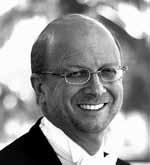
Session: Sunday 10:00 a.m.
Vistas 1
Saturday - 4:00 p.m.
Vistas 1
Bio: Katherine FitzGibbon is Assistant Professor of Music and Director of Choral Activities at Lewis & Clark College, where she has conducted three choirs: a select mixed ensemble, a women’s chorus, and a community group that serves undergraduates, alumni, faculty and staff, and community members. In her first two years at Lewis & Clark, the program has quadrupled in size, from 35 to 150 choir members, and she has conducted concerts including Mozart’s Requiem, Orff’s Carmina
Burana, Carol Barnett’s Bluegrass Mass, Britten’s Ceremony of Carols, and music ranging from medieval chant to Chinese folk music.
This year, Dr. FitzGibbon founded a new professional choral ensemble in Portland, Resonance Ensemble, dedicated to exploring the resonances between music and art, politics, history, literature, and culture (see www. resonancechoral.org). she also served in her thirteenth year on the musical staff at the summertime Berkshire Choral Festival, where she is now Head of Faculty.
Dr. FitzGibbon has conducted undergraduate choirs at Harvard, Boston, Cornell, and Clark universities, and at the university of Michigan. she has been Assistant Conductor of the professional ensemble Boston secession, Chorusmaster of the Windsor symphony Chorus in Windsor, Ontario, guest conductor of the Windsor symphony Orchestra, and a staff conductor at the Rome Opera Festival in Rome, Italy. she has directed secondary school choral programs, guest conducted honor choirs, and adjudicated solo and choral competitions, and she serves on the boards of the Northwest division of the American Choral Directors Association and the National Collegiate Choral Organization. A lyric soprano, Dr. FitzGibbon is a frequent recitalist and concert performer of early through new music.

Dr. FitzGibbon holds a Bachelor of Arts degree in music from Princeton university, Master of Music degree in conducting from the university of Michigan, and Doctor of Musical Arts degree in conducting at Boston university.

Friday - 9:00 a.m.
Vistas 1
After recording and producing three full albums and many other small projects Peter has gained thousands of studio hours of experience. Having the opportunity to work with Bill Hare on countless projects including past OTR and Divisi albums has given him the chance to work alongside one of the most experienced producers of contemporary a cappella in the world. He continues to learn from his fellow colleagues and enjoys working closely with many producers in the field. He learns something new each day from his work and from his clients and is determined to achieve a cappella bliss! His extensive experience with the latest contemporary a cappella studio techniques will assure that you and your group are extremely comfortable, relaxed and confident in the studio.
Bio: Peter Hollens is dedicated to fostering the growth of a cappella throughout the Northwest and beyond. He fell in love with a cappella in middle school and looked forward to eventually singing in a group, even if he had to create one himself!
His first experience with a cappella was in high school when he spontane -
ously put together a group to perform Billy Joel’s version of “The Longest Time” at graduation. still dreaming of the a cappella experience, he arrived at the university of Oregon and joined forces with Leonardo silva. They created uO’s "On the Rocks" in the summer of 1999, the first of a fast growing community of contemporary Northwest collegiate a cappella groups.
Peter is a graduate of the university of Oregon where he earned a Bachelor of Music in Voice Performance. During his collegiate years he sang with “On the Rocks” from 1999 – 2005 and won multiple Best soloist awards in ICCA competitions. He placed in the top three in ICCA competitions with OTR in 2002 and 2003 and for several months toured and sang with the nationally acclaimed Boston based professional group, “Ball in the House.” While singing professionally on the East Coast he discovered a passion for recording, production, and the magic of the studio and decided to make a cappella production his life’s work.
Peter served as recording engineer and producer for university of Oregon’s premier all-female a cappella group “Divisi” for their debut CD Red Hot. He recorded, edited and produced the newest On the Rocks and Divisi albums: Full Coverage and undivided. Both albums have been nominated in every single category possible for the CARAs (Contemporary Acappella Recording Awards) Cornell’s “Last Call,” Yale’s “Dukesmen,” BY u’s’s” Coalescence,” Harvard Fallen Angels, Oregon state’s Outspoken and southern Oregon’s Dulcet are some of his most recent clients. Peter also has his own voice studio and teaches private and group voice lessons. He excels at coaching the best possible sound out of each individual in the studio.
Sunday- 9:00 a.m.
Sousa/Seeger/Joplin
The session will be a reading session on elementary school choirs music provide by JW Pepper and Oregon ACDA.

Bio: Debi Noel holds a Music Education Certification from the university of Oregon and Masters of Education from Oregon state university. she is an energetic, passionate teacher of music. she has been an elementary music specialist for more than 20 years, adjunct instructor at the university of Oregon, Pacific university, and Oregon state university, and is a certified Orff instructor. Debi has enjoyed directing and choreographing musical theatre productions for many area theatre companies including the Rose Children’s Theatre, Cottage Theatre and the Very Little Theatre.

Debi currently teaches music and directs the vocal music program at Oak Hill school in Eugene, Oregon. she is an instructor in the Department of Music at Lance Community College where she teaches music classes and directs the Concert Choir. Debi also directs the youth choir at the First Congregational Church.
Friday - 10:00 a.m.
Vistas 1
On-task behavior can be defined as participating appropriately in an instructional task. singers are more likely to talk, daydream, and be disruptive when they have been sitting for too long with nothing to do. This session will present numerous “Off-Task scenarios” paired with “OnTask strategies” to address and correct these behaviors. Techniques will include guided questioning, movement, critical analysis and comparative performances.
Friday - 2:00 p.m.
Vistas 1
This session will be an interactive exploration of methods and strategies that can be used to raise and maintain singer interest (and artistry) in your rehearsals. Topics will include: Ways to turn off “autopilot,” multi-modal instruction, creating functional approval and disapproval ratios, dynamic pacing, and honing a positive approach to teaching.
Friday - 4:00 p.m.
Vistas 1
This session will examine practical ways to empower students through a positive approach to the ensemble rehearsal. Recent findings in the studies of “mirror neurons” and “social intelligence” will be applied to the rehearsal setting and the conductor/student relationship. This session can be beneficial for band, choral and general classroom educators.
Saturday - 1:00 p.m.
Vistas 1
Where are all those guys? Close harmony a cappella songs can challenge and motivate men to become better singers, better listeners, and better mixed choir members too. The session will include appropriate literature choices and will demonstrate techniques and training tools you can use that will start guys on the road to success and a lifetime of music! Free literature packet provided. (sponsored by Hal Leonard)
Bio: Christopher Peterson is an Associate Professor of Music at California state university, Fullerton where he directs the CsuF Concert Choir, the Titan Men’s Chorus, and teaches classes in choral music education. From 2001–2007 he was Assistant Professor of Music at the university of Wisconsin-Milwaukee. Dr. Peterson taught music in the public schools of Maine for nine years, including elementary, middle, and high school music instruction. He is the author of articles published in the Music Educators Journal, is a contributing author for the textbook series Experiencing Choral Music, published in the united states by Glencoe, and is series Editor and a choral arranger for Hal Leonard’s Close Harmony series for Men and the Close Harmony Collection. Recently he held the position of state Choral Representative for the California Music Educators Association (CMEA), and is currently the CMEA southern section President.
Peterson also is the Western Division Repertoire and standards Chair for Men’s Choirs for the American Choral Director’s Association (ACDA). For six years Chris conducted the Milwaukee Youth Chorale, a mixed honor choir for high school students affiliated with the Milwaukee Children’s Choir. Dr. Peterson maintains an active schedule as a choral clinician, guest conductor, and judge for festivals and choral performance events across the united states and internationally. Recent engagements have taken him to England, sweden, Tokyo, and New Zealand. In his spare time, Chris sings bass with the Masters of Harmony, seven-time International Men’s Chorus Champions of the Barbershop Harmony society. He earned the Bachelor of science in Music Education from the university of southern Maine, and the Master of Music in Choral Conducting from the university of Maine. He earned the Doctor of Philosophy in Choral Music Education and Conducting from Florida state university where he studied with Rodney Eichenberger, Andre Thomas, and Clifford Madsen.
Saturday - 2:00 p.m.
Vistas 1
Bio: Dr. Ethan sperry was born in New York City, Ethan sperry began studying conducting at the age eight, cello at the age of twelve, and singing at the age of eighteen. He has earned a bachelor’s degree in Philosophy from Harvard College and Masters and Doctoral degrees in Choral Conducting from the university of southern California. Ensembles under his direction have toured to Bermuda, Estonia, Finland, France, Germany, Guadeloupe, Italy, Jamaica, Japan, Korea, Luxembourg, Puerto rico, Russia, and Taiwan, and have performed at major venues in the united states including the Kennedy Center, The Washington National Cathedral, st. Patrick’s Cathedral in New York City, The Nassau Coliseum, Cincinnati’s Music Hall, and Boston’s symphony Hall.

Ethan sperry is currently a Professor of Music at Portland state university.
Friday - 1:00 p.m.
Studio 1
This interest session will include performances by the choirs of Cheldelin Middle school directed by Emily Thielen-Mercado. Dr. steven Zielke, director of choirs at Oregon state university, will demonstrate how to develop pitch matching, tone quality, and the head voice. He will also demonstrate how to place students in the correct voice part and select appropriate music for the middle school voice.
Bio: steven M. Zielke, director of choral studies at Oregon state university, directs the Osu Chamber Choir and teaches choral conducting and choral music pedagogy. He earned his doctoral and master’s degrees in choral conducting from The Florida state university where he studied with Andre Thomas and Rodney Eichenberger, and held the prestigious Clayton Krehbiel Fellowship, funded through the generous efforts of the late Robert shaw.

Prior to his graduate work, Zielke received a BME from Friends university (Wichita, Ks) and taught middle and high school choral music in the Kansas public schools. Following his graduate work, Zielke was the associate director of choirs at the university of Arizona where he conducted the symphonic Choir and worked as a colleague with the late Dr. Maurice skones.
Zielke is a frequent clinician and guest conductor, and has recently worked in Oregon, Washington, Idaho, California, Nebraska, Missouri, Nevada, and Kansas. He also guest conducted the Academic Orchestra of the university of stuttgart and the university of Tübingen Chamber singers in Tübingen, Germany. Choirs under his direction have appeared at state, regional, and national conference, as well as the Festival of Light in Bulgaria, and the Prague Musica Ecumenica concert series, Next fall, Zielke will guest lecture and conduct at sichuan Conservatory of Music, in sichuan Province, China.
Zielke is the current past-president of the Oregon Music Educators Association, and is a contributing editor to Walton Music. He is also the founder and music director of the Corvallis Repertory singers, a semi-professional ensemble devoted to exemplary performances of the finest in choral literature and serves as the Director of Music at the First Congregational united Church of Christ in Corvallis. Despite an exhilarating schedule, he enjoys playing with his children, watching college football, and gardening with his wife Nicola.
Bio: Emily Thielen-Mercado, the choir director at Crescent Valley High school and Cheldelin Middle school, is in her fifth year of teaching choir. In 2006 she received her Master in the Arts of Teaching and her Bachelor of Arts in 2005 from Oregon state university graduating summa cum laude. she is in her third year as associate conductor of the Corvallis Reparatory singers and has also enjoyed working as a staff member on two trips to Europe with the Oregon Ambassadors of Music.
Cheldelin Middle school is one of two public middle schools in Corvallis with an enrollment of approximately 600. There was not a choir program when Emily Thielen-Mercado was hired in 2006, but the program has now grown and she currently has a 6th, 7th, and 8th grade choir along with the four groups she also teaches at Crescent Valley High school.
Dr. steven Zielke and Emily Thielen-Mercado From Bari-Tenor to Barely There: Developing the Middle school Voice

Heralded by the Los Angeles Times as “. . .a shining example of podium authority and musical enlightenment,” the American conductor and pianist Neal stulberg garners consistent international acclaim for performances of clarity, insight and conviction.
In North America, Mr. stulberg has led the Philadelphia Orchestra, Los Angeles Philharmonic, Atlanta, Houston, Indianapolis, Milwaukee, National, New Jersey, New World, Pacific, saint Louis, san Francisco, utah and Vancouver symphonies, st. Paul Chamber Orchestra and Los Angeles Chamber Orchestra, among others. He is a recipient of the seaver/National Endowment for the Arts Conductors Award, America’s most coveted conducting prize, and has served as assistant conductor of the Los Angeles Philharmonic under Carlo Maria Giulini and music director of the New Mexico symphony Orchestra.

Mr. stulberg’s European career was launched in september 1997 when he stepped in on short notice to conduct the Netherlands Radio symphony Orchestra and Chorus in a program of Bartok and Kodaly. He was immediately re-engaged by that orchestra to conduct on the prestigious VARA series in the Amsterdam Concertgebouw and has subsequently appeared in Holland with the Netherlands Radio Chamber Orchestra, North Holland Philharmonic, Gelders Orchestra, Netherlands Ballet Orchestra and Nieuw sinfonietta Amsterdam. Engagements in Germany include the WDR Rundfunkorchester Köln and the orchestras of Augsburg, Bochum, Dortmund, Herford, Freiburg, Muenster, Nürnberg, Oldenburg and Rostock. In september 2000 he made his scandinavian debut with the stavanger symphony Orchestra, and recently led performances with the Athens state Orchestra, London Royal Ballet sinfonia, Barcelona Liceu Orchestra and Norwegian National Opera Orchestra.
A native of Detroit, Mr. stulberg is a graduate of Harvard College, the university of Michigan and the Juilliard school. He studied conducting with Franco Ferrara at the Accademia Nazionale di santa Cecilia in Rome, piano with Leonard shure, Theodore Lettvin, William Masselos and Mischa Kottler, and viola with Ara Zerounian. He currently serves as Professor of Music and Director of Orchestral studies at the university of California, Los Angeles, and Director of Chamber Music at the Elizabeth Mandell Music Institute of the Crossroads school in santa Monica.

Sunday - 9:00 a.m.
Studio B/C
Today’s music school graduates face a challenging professional future. What kind of training should music schools offer to best prepare them to succeed as music professionals? How can we best nurture the next generation of musical leaders? And how can an aural art form survive in a visual world?
A native of Detroit, Villasurda attended The university of Michigan at Ann Arbor where he earned Bachelor and Master degrees in Music Education . He studied violin with Gustave Rosseels and Arthur Tabachnick and conducting with Elizabeth Green and Theo Alcantara. He has held school posts in New York, Michigan, Indiana, Hawaii, and London, uK and college posts in Hawaii and Ohio. summer teaching at the Interlochen Arts Camp spanned 35 years.
He has done numerous clinics and adjudications in Michigan, Hawaii and many major in-service conferences. He served as an AsTA state officer, chair of the string Committee of the Michigan school Band and Orchestra Association, and president of the Hawaii state MENC chapter. He is author of the website www.stringskills.com which offers free teaching materials for school orchestra teachers.
Saturday - 9:00 a.m.
Vistas 2
Build flexibility and accuracy in first and second year mixed string classes by using a five prong approach to learning all the “black keys” on the fingerboard. Prepare your students to play fluently in all keys and modes in the first position with good intonation. Directors: bring instruments to this session

Saturday - 3:00 p.m.
O’Neil
Build the ability of your orchestra or band to read and interpret common conducting gestures by including a baton-reading component in the warm-up segment of the daily rehearsal. This session offers a sequential and progressive curriculum for maximizing visual communication and increasing rehearsal efficiency.
Friday - 2:00 p.m.
Vistas 2
session summary: strategies for keeping the younger student focused and active in the group lesson setting.
Bio: Dave DeRoest is a second-generation orchestra teacher in salem, Oregon. A graduate of Oregon state university and university of Portland, Dave has spent the last 18 years teaching elementary and middle school string students. He has served as OMEA state Orchestra Chair, and is currently the Electives Department Head at Waldo Middle school. When not teaching, Dave enjoys small town life with his wife and two kids in nearby stayton.
Friday - 11:00 a.m.
Room: O’Neill
session summary: Learn how to set up a beginning cellist with the correct instrument size and equipment. What is a cello chair anyway? Learn cello calisthenics. special attention will be given to violinists wanting to learn about cello posture and playing skills. Audience participation is strongly encouraged. Bring your cellos.
Bio: Ann Grabe is principal cellist of the Oregon Mozart Players, the Osu/ Corvallis symphony and plays with the Eugene symphony. Ann currently has an active suzuki cello program in Corvallis, Oregon. she also teaches string techniques and cello at Oregon s tate university.
Ann received a Musikerziehung and Aufbaustudium Diplom from the Musikhochschule in stuttgart, Germany, and a BA specializing in performance and suzuki education from Ithaca College in New York. During her five years of studies in Germany she taught cello at two music schools and performed extensively.
Ann lived in Lyon, France for seven years. she taught at l’Institut Musical suzuki de Lyon, which was housed in a centuries-old silk factory on the banks of the Rhône. While there she became the first recognized Teacher Trainer of suzuki Cello in France. she founded their cello program. Ann taught teachers in France, spain, Finland, sweden, scotland, and England. Ann is also a recognized Teacher Trainer by the suzuki Association of the Americas.
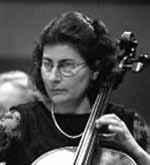
Ann plays a cello built before the signing of the Declaration of Independence by Jean Louvet, a renowned maker of lutes and hurdy-gurdies.

Sunday - 10:00 a.m.
Studio B/C
session summary: Often string players are so preoccupied with the mechanics of string playing, they fail to connect emotionally with the music. While chamber music is often a great way to boost your students’ interest, sometimes players still don’t commit themselves to the music, leaving their teachers frustrated and their colleagues uninspired. While this can at times seem like adolescent rebellion, often it is more due to a lack of understanding of what the music is trying to convey. The Kairos Quartet will explore ways to help young musicians discover how to more fully invest themselves in the music by using such tools as narrative, choreography, theatre, and popular culture.
Bio: The Kairos string Quartet, established in 1993, has been the quartetin-residence at Central Washington university since 1998. Violinists Carrie Rehkopf and Heather Netz, violist Timothy Betts, and cellist John Michel have extensive chamber music experience and have toured internationally. In addition to traditional concert performances, the Kairos Quartet is committed to educational outreach and to performing in unlikely venues in which they seek to break down the barriers between audience and performers.
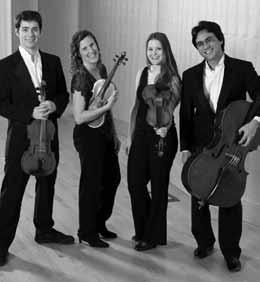
(All instruments including voice)
Saturday - 9:00 a.m.
Boardroom
session summary: Improvisation is integral to most styles of music in the world. sadly, American students tend to be exposed to this art form through jazz—the most challenging form. Julie will focus on the art of improvisation without concern for style. Participants will learn how to negotiate within a number of forms.
Points of focus, such as “slices of silence,” “question and answer,” “soloistic architecture,” “multi-level listening,” riff-oriented versus melodic, two- and four-bar phrases, and partner soloing will be presented as well. (Based on Julie Lyonn Lieberman’s books, The Creative Band and Orchestra, Improvising Violin, and The Contemporary Violinist)
(Bring Your Instrument)
Saturday - 2:00 p.m.
Studio B/C
session summary: This open reading session will familiarize you with some of the string orchestra literature focused on American vernacular and world styles.
Julie will include rehearsal techniques designed to help your students quickly capture the rhythmic groove, appropriate phrasing, and potent left- and right-hand techniques. Achievable approaches to improvisation, when called for in the score, will also be covered. Alfred Publishing will supply the scores, and the session will include a raffle for a free score.
(All instruments — but you do not need to bring your instrument unless you’d like to volunteer.)
Saturday, 4:00 p.m.
Studio B/C
session summary: When you know how to use your body-mind effectively, you can protect yourself from injury and create effortless speed, fluidity, and agility on your instrument simultaneously.
Julie has presented her “Playing Healthy” clinic (based on her critically acclaimed book, “You Are Your Instrument” and its five spin-off DVDs), throughout the world over the last 20+ years to professionals, conservatory, and pubic school students. she developed this clinic to help music educators convey quality, injury-free music-making concepts to their students in a more inviting package. Most young people don’t feel deleterious effects until it’s too late and show little or no interest in the topic; packaged as access to speed, it’s a whole different ball-game. Ears perk up and minds register the same body of information!
Bio: Julie Lyonn Lieberman, (www.JulieLyonn.com) is an eclectic styles violinist and vocalist, who specializes in improvisation and American vernacular as well as world styles. Ms. Lieberman has helped build what she calls “21st century music education” over the last thirty+ years through her work as an educator, author, radio producer, composer, recording artist, journalist, and performer.
Ms. Lieberman has just finished developing the creative curriculum for the American string Teachers National Curriculum Committee and is the Artistic Director for the summer program, strings Without Boundaries. she is the author of eight music books, two National Public radio series, six DVDs, and over fifty magazine articles. she helped launch the alternative styles component for AsTA’s yearly conference in 2003 and chaired the committee in 2004; in 2007, wrote and produced the DVD, Alternative string styles in the Classroom, for American string Teachers Association and NAMM.
Ms. Lieberman’s 2010 national eco-music project, The Green Anthem debuted nationwide in early 2010 (www.greenanthem.org). It offers a free eco-music curriculum to music educators. MENC: Music Educators National Conference included the song, The Green Anthem, in The World’s Largest Concert, March 2010, and ran The Green Anthem Lyric-Writing Competition. six million students sang The Green Anthem nationwide.
Lieberman is a J. D’Addario Elite Clinician. Alfred Music and Kendor Music publish her alternative-style string orchestra scores, which include "Midnight's Celtic Run," "Folk Dance from Provence," "Rockin' It," "Lebedike Honga," (Klezmer), "Hotter Than Blues," and Twin sisters (old-time with a Celtic twinge), and Flop Eared Mule (old-time). Her books and DVDs are distributed by Hal Leonard Corp.
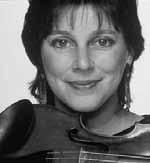
Book titles include The Creative Band and Orchestra, The Contemporary Violinist, 12 Rock strings Lesson Plans, Improvising Violin, Rockin’ Out With Blues Fiddle, You Are Your Instrument, Planet Musician and Alternative strings: The New Curriculum. DVD titles include Violin and Viola Ergonomics: Determine the Optimum Playing Position and support For Your Body Type, Rhythmizing the Bow, Techniques for the Contemporary string Player, The Violin in Motion, and Vocal Aerobics.
Friday - 10:00 a.m.
Hellman
session summary: How to create awareness for the finished product from the outset of new literature.
Bio: stephen Nelson was raised in the salem area, and is a product of the salem/Keizer school system, graduating from North salem High school in 1968. He received his first studies on the violin and piano from Mr. and Mrs. Dalbert Jepsen, also of salem, and continued studies in violin performance with Alfred Boyington at Washington state university. After
completing degrees at Wsu, stephen joined the Tacoma Philharmonic, and while performing with that ensemble and the seattle Tacoma Opera Orchestra, he completed coursework for his Music Education degree at the university of Puget sound.
He then became the assistant conductor of the Wenatchee symphony. In 1979, stephen returned to his alma mater, North salem High school, to take over the string program, and to revive the salem Youth symphony. stephen was awarded the prestigious Rackham Fellowship at the university of Michigan for doctoral studies in education, conducting, and violin performance. During his doctoral studies he conducted the Michigan Youth symphony and famed Interlochen Music Camp.
Mr. Nelson returned to s alem in1985, taking over a struggling string programs at sprague High school and Judson Middle school. Mr. Nelson’s orchestras have won 21 state championships; three international competitions in Vienna, Austria; one Grammy for being the finest music program in the nation; and he has garnered Teacher of the Year awards on three separate occasions.
Nelson’s students are performing and teaching music all over the world today. His own daughter was the first instructor for orchestras at West salem High school, and at least eight other past students are currently teaching in the s alem/Keizer schools alone. s tephen, recently came out of retirement, is now teaching in his second year at Crossler Middle school, where he is training future students for his previous assignment, sprague High school.
Friday - 4:00 p.m.
Vistas 2
session summary: Her method connects musical imagination to the motion of the performer, and thus to the posture. Posture has to serve the music, and any bad postural habits can hurt the very promising musician in the future - maybe very much.
All of the members of the siskiyou Violins ensemble who performed earlier in the day in the Hilton Hotel’s O’Neill Ballroom will be part of the clinic. They will be used in demonstrating separately how to overcome obstacles that would hurt the music if appropriate attention was not paid to them. A 7 year old student will be included to demonstrate a few age-related methods of instruction.
Ms. Podolnaya will share with the audience her “tinsel stacking method” of concentrating on each feature of violin playing (e.g., intonation) until it is polished and shiny (as a piece of Christmas tree tinsel) before going on to the next feature. she will show the chart she uses for each student, with ten major features of violin playing.
Bio: Faina Podolnaya, a private violin instructor in Ashland, OR, had a dream to lead a group of her best students to perform at Carnegie Hall. Ms. Podolnaya, born in a small village in the ukraine, began playing violin herself at the age of 7. Ms. Podolnaya earned a Diploma in Music studies from Konotop school, a Bachelor’s Degree in Music and Teaching from Karaganda College of Music; and a Master’s Degree in Music Teaching and Performance from the Kazakhstan s tate university.
she was the leading violin teacher at the most prestigious music school in most prestigious music school in Kazakhstan, former republic of the ussR, the Music College for Gifted Children of Almaty state Conservatory. In addition, she was Dean of the Music Department in Prokofiev Music school in Almaty (the capital of Kazakhstan) for a number of years. Also included among her honors are the Excellence of Teaching medal from the government of Kazakhstan and her selection as soviet union Laureate Teacher of the Year.
Ms. Podolnaya’s student soloists and ensembles in Kazakhstan took first prizes in numerous high- level international competitions. some of her students were granted green cards in the us for being outstanding violinists. Ms. Podolnaya also travelled with her students, performed and lectured in many music schools in Kazakhstan.
Ms. Podolnaya came to the us in 1999, to be reunited with her family. she settled in Ashland, Oregon, where she started a small private music studio for violin and viola students. she serves as the Associate Conductor of the Youth symphony of southern Oregon (YssO). she is also the Artistic Director of the siskiyou Violins, a youth ensemble with members from throughout the Rogue Valley of s outhern Oregon.

Gary Green is a Professor of Music and Director of Bands in the Frost school of Music at the university of Miami. In addition to supervising all band activities, he is the conductor of the Frost Wind Ensemble and Chairman of Instrumental Performance. He supervises all graduate conducting students in the wind and percussion area. Prior to coming to Miami, Professor Green served for ten years as Director of Bands at the university of Connecticut in storrs, Connecticut. He is a member of the American Bandmasters Association, the College Band Directors National Association, the Music Educators National Conference, the Florida Bandmasters Association, and the Florida Music Educators Association, and received the Phillip Frost Award for Excellence in Teaching and scholarship in the Frost school of Music in 2002. In March 2007, he joined the ranks of Frederick Fennell, William Revelli, and John Paynter in the Bands of America Hall of Fame.
since his arrival at the university of Miami, Professor Green has continued the commissioning and performance of important new repertoire for the wind ensemble. under his direction, the Frost Wind Ensemble has performed on two separate occasions for the convention of the American Bandmasters Association as well as the national convention of the College Band Directors National Association.
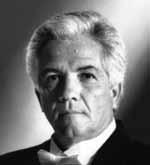
Recent commissions and consortia from composers include David Gillingham, David Maslanka, Michael Daugherty, Elliott Carter, Christopher Theofanidis, John Harbison, James syler, Eric Whitacre, Frank Ticheli, Thomas sleeper, H. Robert Reynolds, and Ken Fuchs. urban Requiem by Michael Colgrass was commissioned by the Abraham Frost Commission series and has become a standard in the repertoire for wind ensemble. Among other new compositions written for winds and percussion is the commission for the Frost Wind Ensemble of Christopher Rouse’s Wolf Rounds.
Professor Green is an active conductor and clinician and has appeared with international, national, and regional bands and intercollegiate bands in most of the fifty states. He has also recently conducted in Taipei, Taiwan where he appeared with the Republic of China Army Band and the Taiwan National Wind Ensemble.
Session: Sunday - 10:00 a.m.
O’Neill
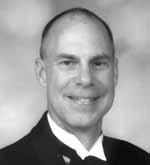
Dr. Eric Hammer is serving his eighteenth year as Director of Bands and Professor of Music Education at the university of the Pacific Conservatory of Music in stockton, California. At Pacific, Eric leads the symphonic Wind Ensemble and university Concert Band and teaches courses in Brass Pedagogy, Conducting/score Analysis, Rehearsal Techniques and Band Development. He also hosts the Pacific Western Concert Band Festival, advises the Pacific Pep Band, supervises student teachers, and Chairs the Recruitment/ scholarship Committee. Additionally, Eric conducts the Diablo Wind symphony and the Pacific Concert Band while maintaining an active, calendar of guest conducting, clinics, and adjudication.
Eric’s background includes an Iowa upbringing, sixteen years of public school teaching experience and a Doctor of Musical Arts degree from the university of Oregon. He is currently the President of the Western Division College Band Directors National Association and has also held leadership positions with California Music Educators Bay section, Pacific Music Camp, the California unit of the International Association of Jazz Educators, and the Yuba County Arts Council. Eric is a member of the College Band Directors National Association, the National Association for Music Education, California Band Directors Association, Nor Cal Band Association, National Band Association, Pi Kappa Lambda, Phi Mu Alpha sinfonia, and the World Association of symphonic Bands and Ensembles. Among his honors are the university Faculty mentor Award and the Conservatory’s Most Inspirational Professor Award in 2009-2010.
Sunday - 9:00 a.m.
O’Neill

Timothy Loest is a name in instrumental music synonymous with creativity, versatility, and accessibility. His works for young band are performed worldwide, and his best selling “Warm-ups and Beyond” is used in band rooms throughout the united states. Recently, Tim coauthored MEAsu REs OF suCCEss: A Comprehensive Musicianship Band Method.
Tim had his first work published in 1995. Today he is an exclusive composer and arranger for The FJH Music Company Inc. As a clinician, Tim delivers engaging and thought-provoking presentations on various aspects of instrumental music. He frequently guest conducts bands in Illinois and has made appearances in Indiana, Wisconsin, Ohio, Texas, California, Georgia, and Oregon.
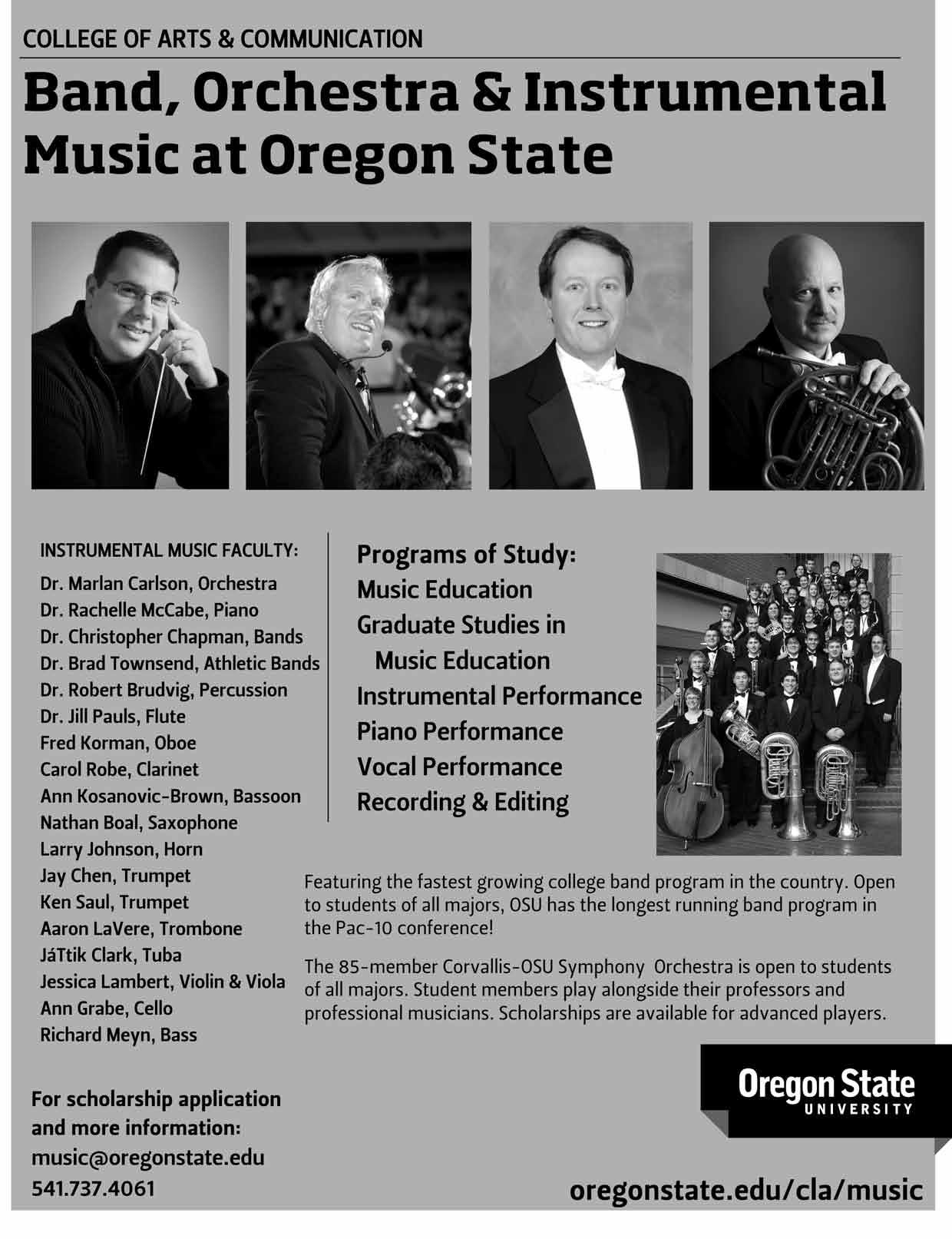
Tim received his Bachelor of Music Education degree from Illinois state university and his Master of Music degree from Northwestern university. He is band director at F.E. Peacock Middle school in Itasca, Illinois, where he has taught for 25 years. Tim holds membership in the Music Educators National Conference (MENC), the Illinois Music Educators Association (IMEA), the Illinois Grade school Music Association (IGs MA), the American society of Composers, Authors, and Publishers (As CAP), and the Christian Educators Association International (CEAI).
An AsCAP award-winning composer, Tim strives to broaden instrumental music education through his writing and teaching. Tim lives in Wheaton, Illinois with his wife Cindy and sons stefan and soren.
Saturday - 9:00 a.m.
O’Neill
Conference Keynote
speaker: Dr. Peter Loel Boonshaft
Even a Fool Knows You Can't Touch The stars...
Saturday - 10:00 a.m.
Soreng
Keynote speech: “Even A Fool Knows You Can't Touch The stars...” A poignant and uplifting description of what is at the heart of being a music teacher: the essence of what we do and why we do it.
Friday - 3:00 p.m.
O’Neill
This session will offer suggestions to improve our ability to motivate and inspire our students in rehearsals, while providing a disciplined environment. By implementing these simple strategies we can make any rehearsal more enjoyable, productive, exciting, controlled, and educational. useful for conductors of any level and type of ensemble.
Called one of the most exciting and exhilarating voices in music education today, Peter Loel Boonshaft has been invited to speak or conduct in every state in the nation and around the world. He is the author of the critically acclaimed best-selling books Teaching Music with Passion, Teaching Music with Purpose, and Teaching Music with Promise. As well, his first book for all educators, Teaching with Passion, Purpose and Promise will be released in May 2010. He is also co-author of Alfred Music Publishing’s new beginning method book series, sound Innovations for Band and sound Innovations for strings. He is currently on the faculty of Hofstra university in Hempstead,
New York, where he is Professor of Music and Director of the Graduate Conducting Program. Dr. Boonshaft has received official proclamations from the Governors of five states and a Certificate of Appreciation from former President Ronald Reagan, as well as performing for former President and Mrs. George Bush, former President Bill Clinton, and for Margaret Thatcher, former Prime Minister of the united Kingdom. His honors also include being selected three times as a National Endowment for the Arts
“Artist in Residence,” three times awarded Honorary Life Membership in the Tri-M Music Honor society, and being selected for the Center for scholarly Research and Academic Excellence at Hofstra university.
Extremely active as a guest conductor, clinician and speaker for conferences, festivals, concerts and workshops nationally and internationally, he has guest conducted the MENC (The National Association for Music Education) All-Eastern Band, MENC All-Northwest Band, MENC All-Eastern Directors Band, and Goldman Memorial Band. He was also named conductor of the MENC National High school Honors Band for the National Convention in Nashville, Tennessee. He has served as a speaker for the Canadian Music Educators Association National Convention, MENC National Conference, Midwest International Band and Orchestra Clinic, Music For All/Bands and Orchestras of America symposium, samuel Barber Institute for Music Educators, Music Education Center of America, Conn- selmer Institute, NEsA Council of Overseas schools Conference in Bangkok, Thailand, and as keynote speaker for the MENC Northwest Division Conference, MENC southern Division Conference, MENC Eastern Division Conference, European Music Educators Convention, National Convention of the American string Teachers Association, National Convention of the American school Band Directors Association, ACDA Western Division Conference, and numerous state and regional music education conferences.


Sunday- 10:00 a.m.
O'Neill
Bio: Dr. Robert Brudvig is the director of Percussion studies and an Assistant Professor of Music at Oregon state university. He holds a Doctor of Musical Arts in percussion performance from The university of Arizona. He also holds a Master of Arts in Teaching from Portland state university and a Bachelor of Music from Oregon state university.
An active performer, Dr. Brudvig has held professional engagements with the Tucson symphony, Oregon symphony, Oregon Ballet Theater, Portland Opera, Arizona Opera, Oregon Coast Music Festival, Cascade Festival of Music and the Ernest Bloch Music Festival. He has performed throughout the united states, including Carnegie Hall, as a solo performer, as a member of the Orkota Percussion Duo, and as a member of starfire – a trio of two harps and percussion. International performance engagements include tours of Japan, China, and Germany. He has performed as percussion soloist with the Osu/Corvallis symphony Orchestra, university of Arizona Orchestra, and the Portland s tate university Orchestra.
Dr. Brudvig is a member of the Education and Pedagogy committees of the Percussion Arts society (PAs) and is secretary of the Oregon Chapter of PAs. He is also a member of the Oregon Music Educators Association and MENC. In addition to his percussion duties at Osu, Dr. Brudvig teaches Music Theory, Aural skills, Applied Lessons, Percussion Methods, The History of Rock and Roll, and conducts the Osu Campus Band.
Friday - 9:00 a.m.
Vistas 2
As a renowned oboist Fred Korman incorporates his unique background and varied talents, along with his passion for people and performance. Discussion, dialogue, performance, demos, focusing on the psychology of performing, and in particular, the ensemble preparation experiences of an individual and an ensemble. Osu’s “Double Reed Ensemble” and their Director Christopher Chapman will participate in this nationally acclaimed leader’s workshop.
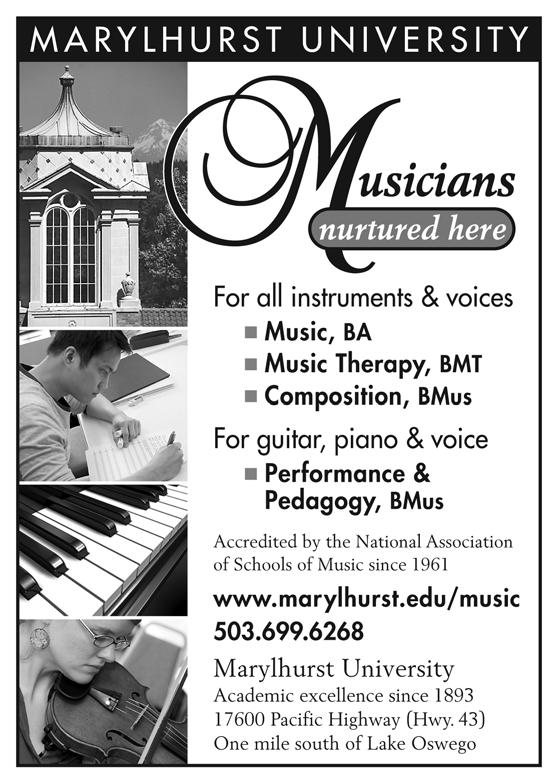
Saturday - 1:00 p.m.
O'Neill
Clinic by Dr. Chris Chapman, Oregon state university and stuart Welsh, West Albany High school
This clinic will feature the West Albany High school symphonic Band in an on-stage clinic by Chris Chapman. several rehearsal techniques and strategies will be employed to help the high school and middle school concert band gear up for the upcoming festival. Topics include: conductor interpretation, the two kinds of instrumental balance, blend within sections, and intonation across the ensemble.
Bio: Dr. Christopher Chapman is the Director of Bands for the Oregon s tate u niversity Department of Music, where he conducts the Wind Ensemble, Wind symphony, Jazz Ensemble and Chamber Winds, and teaches courses in music education and graduate and undergraduate instrumental conducting. Prior to his appointment at Osu he served as the Associate Director of Bands at Florida Atlantic university, where he founded the athletic band program and symphony Band. From 2002-2005 Chapman worked as the Graduate Assistant Director for the university of Washington band program and before then served as the Director of Bands at Foothill High school in Henderson, Nevada. Originally from Columbus, Ohio, Chapman holds a bachelor’s degree in music from The Ohio state university, a master’s degree in music from the university of Nevada, Las Vegas, and a doctorate of musical arts degree from the university of Washington.
He has studied conducting with Richard Blatti, Thomas Leslie, Takayoshi “Tad” suzuki, and Timothy salzman. Dr. Chapman is a sought-after clinician, adjudicator, and conductor, and has worked with bands regionally,

nationally and internationally including Oregon, Ohio, Florida, Nevada, New York, Arizona, Illinois and Japan. He has been a contributing author in A Composer’s Insight: Thoughts, Analysis and Commentary on Contemporary Masterpieces for Wind Band, a series of books on contemporary wind band composers for Meredith Music Publications, a subsidiary of the Hal Leonard Corporation and Teaching Music through Performance by GIA Publications. He is an honorary member of the Kappa Kappa Psi Honorary Band Fraternity where he has served as the Co-Governor of the Western District, and an honorary member of the Tau Beta sigma honorary band sorority. He currently serves as President-elect for the Northwest division of the College Band Directors National Association and the Oregon state representative for the National Band Association. Other organizations include the Oregon Band Directors Association, Music Educators National Conference, and Oregon Music Educators Conference.
Saturday - 2:00 p.m.
Vistas 2

Friday - 10:00 a.m.
Vistas 2
What is your Circle of Acceptance? What are the expectations you set for yourself?… for your ensemble? Manage your time and focus on key ingredients for developing maximum performance potential with your instrumental program. In this session, we will look at several approaches for solving the most common wind band performance errors as identified by an adjudicator survey. We will also explore rehearsal methods for engaging students in the music making process while elevating their standard of “acceptable” performance. Become more aware of your ensemble’s Circle of Acceptance and learn how to prepare each rehearsal with an appetite for excellence!
Friday - 2:00 p.m.
O’Neill
Participants will explore key points of successful band rehearsal techniques gathered from some of the best music educators in the field. This session will share tips for approaching common performance errors in an effort to prioritize music making in the rehearsal. Whether a beginning or veteran teacher, this clinic will help you manage your time and focus on key teaching ingredients for administering effective rehearsal techniques.
Bio: s helley M. Jagow Associate Professor of Music at Wright s tate university, where she is director of the symphonic Band and saxophone Quartet, and professor of saxophone and Music Education courses. she earned Music Education degrees from the university of saskatchewan (Canada), the university of Missouri (Columbia), and the union Institute & university (Cincinnati). Music mentors have included Frank Battisti, Timothy Foley, Marvin Eckroth, Dale Lonis, and Edward Wingard. Dr. Jagow is active as a selmer Artist Clinician for both saxophone workshops and conducting rehearsal clinics. she has commissioned works for solo saxophone and ensembles from both national and international composers, and has presented clinics and performances at OMEA (Ohio Music Educators Association), MENC (Music Educators National Conference) and NAsA (North American saxophone Alliance). Her publications can be found in the College Music symposium Journal, TRIAD, National Association of College Wind and Percussion Instructors, Canadian Winds, Music Educators Journal, the Canadian Band Journal, and in her book Developing the Complete Band Program (Meredith Music Publications). (e-mail: shelley.jagow@wright.edu)
Friday - 9:00 a.m.
Vistas 2
As a renowned oboist Fred Korman incorporates his unique background and varied talents, along with his passion for people and performance. Discussion, dialogue, performance, demos, focusing on the psychology of performing, and in particular, the ensemble preparation experiences of an individual and an ensemble. Osu’s “Double Reed Ensemble” and their Director Christopher Chapman will participate in this nationally acclaimed leader’s workshop.
Bio: Fred Korman A native of Brooklyn, New York, Mr. Korman maintains a private counseling practice in Portland where he sees adults in individual counseling. In addition, Mr. Korman presents master classes and workshops at major universities and music festivals around the united states for performers of all levels and mediums focusing on the psychology of performance. The uniqueness of his combined expertise allows him to provide a richness of experience both as a therapist and a musician.
The Principal Oboist with the Oregon symphony from 1978-2006, Mr. Korman is a frequent soloist in the Northwest. He has received critical praise for his “flawless playing”, “tour-de-force” performances and “lyric flair”. His performances of George Rochberg’s Oboe Concerto with the Oregon symphony drew robust approval from music critics who said: “Korman played passionately . . . his oboe rang clear and true” (The Columbian) and “He cleanly etched Rochberg’s mournful and erratic themes . . . against the score’s constantly shifting patterns” (The Oregonian). His playing in the critically acclaimed Oregon symphony recording of strauss’ Don Juan was praised by the CD Review.
Before beginning his tenure with the Oregon symphony, Mr. Korman held positions with the New Orleans and Hartford symphony Orchestras. In addition to his recordings with the Oregon symphony, Mr. Korman has recorded both classical and jazz on labels including Delos, Opus One, Koch, and a premier recording of the Wind Quartet by Gieseking on the Centaur label. He has participated as Principal Oboist in music festivals including Tanglewood, Chamber Music Northwest, Peter Britt, Centrum, s henandoah Valley, Festival of the Amalfi Coast (Italy) and the s aint Barthelemey Music Festival (French West Indies).


Session: Friday - 4:00 p.m.
O’Neill
Concert: Saturday - 7:30 p.m.
Hellman/Williams/O'Neill
Bio: Trombones De Costa Rica, winners of the Costa Rican National Award of Music in 1997 and the City of Passau ´s special Price in Germany in 1999, is one of the most innovative and virtuosistic brass ensembles of the American Continent.
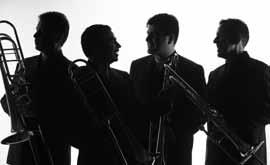
since its foundation in 1991, TCR has distinguished itself for its clear projection to varied audiences through recitals and educational programs. The variety of this group’s repertoire is evident in their recordings entitled Contrastes, Imágenes, and Trombonismos which present a mix of standard classical and Costa Rican music.
They have traveled extensively throughout the American continent the Caribbean and Europe. In addition to ensemble recitals, TCR has performed as guest soloist with major ensembles such as the Costa Rican National symphony, the united states Army Band, the Oregon state university symphonic Band, the Carroll College Wind Ensemble, the university of Miami Wind Ensemble, the National symphony Orchestra of Ecuador, and the university of Costa Rica Wind Ensemble.
In 2001 the ensemble developed the Trombones de Costa Rica International Festival which brings to Costa Rica prominent guests artists and students from Latin America and united states.
Trombones de Costa Rica is sponsored by the Edwards Instrument Company.
Saturday - 4:00 p.m.
Vistas 2
Learn comprehensive strategies for teaching transferable rhythm skills, to enable any individual or ensemble to perform complex rhythms at sight. Rhythm, the fundamental element of all music, is perhaps the most problematic aspect of musical performance—this is especially true for beginning and intermediate instrumental and voice students, since their concentration is divided between rhythm, pitch, expression, ensemble, and technical skills. By isolating rhythm and utilizing
a system of “rhythm-syllable association,” rhythms and rhythmic devices common to Western art and popular music from the Renaissance to today are introduced and developed. The end result is the development of a rhythmically fluent student capable of performing rhythms on their instrument or voice from any style or historical period.
Included: Examples of materials used including DVD of clinician working with students in a rehearsal setting.
Bio: Garwood Whaley is the author of more than twenty highly acclaimed method books for percussion instruments, two supplementary band methods (co-author), solos and ensembles and numerous articles for music journals. His many publications for percussion instruments have become standard texts worldwide.
Whaley received his undergraduate education at Juilliard, and the Doctor of Musical Arts Degree at the Catholic university of America. While completing graduate work, he performed for six years with the united states Army Band (“Pershing’s Own”). As a popular clinician and conductor, he has appeared at major music conventions throughout the united states.
Whaley serves as conductor emeritus of the Bishop Ireton symphonic Wind Ensemble (Alexandria, VA) and adjunct professor of music at the Catholic university of America. He is former chief editor for Music for Percussion Inc., former curriculum coordinator of instrumental music for the Diocese of Arlington (VA) schools, and past president of the Percussive Arts s ociety.
Saturday - 3:00 p.m.
Vistas 2
Bio: Eric Wiltshire, Assistant Director of Bands and Assistant Professor of Instrumental Music Education, received his Ph.D. in Music Education from the university of Washington in seattle in 2006, and an MA in Music from Washington state university, Pullman, in 1994.


Before coming to uO, he was assistant professor of music at the university of Dayton (Ohio), where he was director of the “Pride of Dayton’ Marching Band, among others, and taught courses in marching band pedagogy, instrumental conducting, arranging, literature and resources, and low brass pedagogy.
Wiltshire’s research and publication interests include topics such as the marching band’s role in education, composer Gregory Youtz, and arranging for the small marching band. He is a member of the Music Educators National Conference and the College Band Director’s National Association.

Jazz Concert: Saturday - 5:00 p.m.
Soreng
Wycliffe Gordon enjoys an extraordinary career as a performer, conductor, composer, arranger, and educator, receiving high praise from audiences and critics alike. Gordon tours the world performing hardswinging, straight-ahead jazz for audiences ranging from heads of state to elementary school students. Gordon received the Jazz Journalists Association 2008, 2007, 2006, 2002 and 2001 Award for Trombonist of the Year, and the Jazz Journalists Association 2000 Critic's Choice Award for Best Trombone.
In addition to a thriving solo career, he tours regularly leading the Wycliffe Gordon Quartet, headlining at legendary jazz venues throughout the world. Gordon is a former veteran member of the Wynton Marsalis septet, Lincoln Center Jazz Orchestra and has been a featured guest artist on Billy Taylor's "Jazz at the Kennedy Center" series. Gordon's extensive performance experience includes work with many of the most renowned jazz performers of the past and present.
Gordon's musical prowess has been captured on numerous recordings, including thirteen solo CDs and seven co-leader CDs. His latest effort “Cone and T- staff,” released in February 2010, is a quintet recording featuring trumpeter Terell stafford. Gordon is featured on numerous recordings with the Wynton Marsalis septet, Lincoln Center Jazz Orchestra, and many others as evidenced in his extensive discography.
Wycliffe Gordon is also a gifted composer and arranger. He was commissioned to compose a vibrant new score for the 1925 classic silent film "Body and soul" (notable as the screen debut of Paul Robeson) which was premiered at the Lincoln Center Jazz Orchestra's 2000-01 season opening night performance at Avery Fisher Hall, and was released on DVD in 2008. Gordon's "I saw the Light," a musical tribute to Muhammad Ali, was commissioned and premiered by the Brass Band of Battle Creek in March 2004, and is scheduled for release on DVD in 2010. He is currently working on an extensive commission for the Jazz Arts Group Columbus, Beyond the Blackberry Patch, that will premiere during the Columbus bicentennial celebration 2012.
Gordon's compositions have been performed by the Lincoln Center Jazz Orchestra, the Wynton Marsalis septet, the Wycliffe Gordon Quartet, the Brass Band of Battle Creek and numerous other ensembles, and performed in programs throughout the u s. and abroad including concert halls in New York, Los Angeles, Aspen, Georgia, Pennsylvania, New Jersey, Germany, London, Finland and switzerland. Two of Gordon's arrangements are also featured as a part of the PBs series "Marsalis on Music." Recent concert seasons have included premieres of compositions by Gordon for a variety of ensembles both in the united states and internationally. The first in a series of print editions of his big band, small ensemble and choir compositions will be available in 2010.

Gordon's television appearances have included the Grammy Awards, the PBs special documentary " swingin' with the Duke," and two Live from Lin -
coln Center broadcasts with the Lincoln Center Jazz Orchestra – " uptown Blues, Ellington at 100" (a collaboration with the New York Philharmonic) and "Big Train." Gordon also appeared in Ken Burns' documentary "Jazz."
Other television appearances include "A Carnegie Hall Christmas Concert" and "Live from Lincoln Center: The Juilliard school at 100 Years." Gordon is featured in BET's 13-part series "Journey with Jazz at Lincoln Center" and was guest artist and commentator in NPR affiliate WVIA's special program on Tommy Dorsey (along with the late skitch Henderson, just days before Henderson's death). Gordon also appeared with the Wynton Marsalis septet in the feature film "Tune In Tomorrow" starring Peter Falk, Keanu Reeves and Barbara Hershey.
Gordon is rapidly becoming one of America's most persuasive and committed music educators, and currently serves on the faculty of the Jazz Arts Program at Manhattan school of Music. His work with young musicians and audiences from elementary schools to universities all over the world is extensive, and includes master classes, clinics, workshops, children's concerts and lectures — powerful evidence of his unique ability to relate musically to people of all ages. Gordon is currently working on a collection of trombone quartets, trios and duos to be entitled "Trombone Majesty," with expected publication in 2011. In addition, his first method book "Basic Training, Exercises and suggested studies by Wycliffe Gordon," a compilation of the materials, exercises and approaches he uses in his teaching and in his own practice regimen, will be released in 2012.
Gordon teamed with trombonist Joseph Alessi of the New York Philharmonic and students in both of their studios at Juilliard in creating and presenting the master class "Two sides of the slide" for Jazz at Lincoln Center. The master class is available in its entirety as part of a streaming video series offered by the Education Department of Jazz at Lincoln Center. Gordon is the youngest member of the u s statesmen of Jazz, and in many tour performances has served and continues to serve as a musical ambassador for the u s state Department.
Born in Waynesboro, Georgia, Gordon was first introduced to music by his late father, Lucius Gordon, a classical pianist and teacher. His interest in the trombone was sparked at age twelve by his elder brother who played the instrument in his junior high school band. Egged on by sibling rivalry, Gordon's relentless pleading of his parents led to his first trombone. A year later, an aunt bequeathed the Gordon Family her jazz record collection, and so began his passion for jazz music.
Wycliffe Gordon is a Yamaha artist and endorses Greg Black mouthpieces. For additional information visit www.wycliffegordon.com or contact Brumfield & Associates,
Session: Sunday - 11:00 a.m.
Vistas 2
(All instruments including voice)
Saturday - 9:00 a.m.
Boardroom
session summary: Improvisation is integral to most styles of music in the world. Jazz improvisation is one of the most challenging forms, so Julie will focus on teaching the art of improvisation without concern for style. Participants will learn how to negotiate within a number of forms.
Points of focus, such as “slices of silence,” “question and answer,” “soloistic architecture,” “multi-level listening,” riff-oriented versus melodic, two- and four-bar phrases, and partner soloing will be presented as well. (Based on Julie Lyonn Lieberman’s books, The Creative Band and Orchestra, Improvising Violin, and The Contemporary Violinist)
Bio: Julie Lyonn Lieberman, (www.JulieLyonn.com) is an eclectic styles violinist and vocalist, who specializes in improvisation and American vernacular as well as world styles. Ms. Lieberman has helped build what she calls “21st century music education” over the last thirty+ years through her work as an educator, author, radio producer, composer, recording artist, journalist, and performer.

Ms. Lieberman has just finished developing the creative curriculum for the American string Teachers National Curriculum Committee and is the Artistic Director for the summer program, strings Without Boundaries.
she is the author of eight music books, two National Public radio series, six DVDs, and over fifty magazine articles. she helped launch the alternative styles component for AsTA’s yearly conference in 2003 and chaired the committee in 2004; in 2007, wrote and produced the DVD, Alternative string styles in the Classroom, for American string Teachers Association and NAMM.
Ms. Lieberman’s 2010 national eco-music project, The Green Anthem debuted nationwide in early 2010 (www.greenanthen.org). It offers a free eco-music curriculum to music educators. MENC: Music Educators National Conference included the song, The Green Anthem, in The World’s Largest Concert, March 2010, and ran The Green Anthem Lyric-Writing Competition. six million students sang The Green Anthem nationwide.
Lieberman is a J. D’Addario Elite Clinician. Alfred Music and Kendor Music publish her alternative-style string orchestra scores, which include "Midnight's Celtic Run," " Folk Dance from Provence," " Rockin' It," "Lebedike Honga," (Klezmer), "Hotter Than Blues," and Twin sisters (old-time with a Celtic twinge), and Flop Eared Mule (old-time). Her books and DVDs are distributed by Hal Leonard Corp.
Book titles include The Creative Band and Orchestra, The Contemporary Violinist, 12 Rock strings Lesson Plans, Improvising Violin, Rockin’ Out With Blues Fiddle, You Are Your Instrument, Planet Musician and Alternative strings: The New Curriculum. DVD titles include Violin and Viola Ergonomics: Determine the Optimum Playing Position and support For Your Body Type, Rhythmizing the Bow, Techniques for the Contemporary string Player, The Violin in Motion, and Vocal Aerobics.


Friday - 9:00 a.m.
Studio B/C
Friday - 2:00 p.m.
Studio B/C
Saturday - 2:00 p.m.
Boardman
Bio: Dr. Willie Hill is Director of the Fine Arts Center at the university of Massachusetts/Amherst and a Professor in Music Education. He received his B.s. degree from Grambling state university and earned M.M. and Ph.D. degrees from the university of Colorado-Boulder. Dr. Hill was a Professor in Music Education, and the Assistant Dean at the College of Music at the university of Colorado-Boulder for eleven years; and, Director of Education for the Thelonious Monk Institute in Los Angeles, California. Prior to his tenure at the university of Colorado, Hill taught instrumental music for 16 years and served as instrumental music supervisor for four years in the Denver Public schools (DP s).
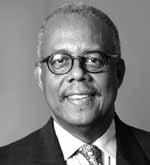
His professional activities in the Denver/Metro area included the following: a former member of the Denver Broncos Jazz Ensemble, a regular performer at the Denver Auditorium Theater, Paramount Theater, Boettcher Concert Hall and a variety of nightclubs; guest soloist with the Garden City Community College, Hastings College, the university of Colorado, and the university of Denver Jazz Ensembles; a freelance performer with
George Burns, Liza Minneli, Lena Horn, Lou Rawls, Ben Vareen, Lola Falana, Johnny Mathis, sammy Davis Jr., Dizzy Gillespie, James Moody, Jon Faddis, and many others. As a woodwind specialist, he has been a faculty member of the Clark Terry Great Plains Jazz Camp; Founder and Co-Director of the Rich Matteson-Telluride Jazz Academy, and Founder of the Mile High Jazz Camp in Boulder, CO. The Colorado Clarinet Choir was chosen to represent the united states in London, England at the International Clarinet symposium and Dr. Hill was a member of that touring organization. His conducting experiences include numerous Citywide Honor performances, All- state Jazz Ensembles, All-County Bands, Musical Director at The schwayder and Bonfils Theaters.
He is Past-President of MENC: The National Association for Music Education (MENC); Past-President of the International Association for Jazz Education (IAJE); Past-President of the Colorado Music Educators Association, and Pi Kappa Lambda National Music Honor s ociety; and, was a member of the writing team for MENC’s Vision 2020. He is currently a member of the national board of directors for Young Audiences Arts for Learning, Inc.; and, a trustee for the Community Foundation of Western Massachusetts. In January 2001, Dr. Hill was the recipient of the prestigious Lawrence Berk Leadership Award presented by the International Association for Jazz Education. In 1998, he was inducted into the Colorado Music Educators Hall of Fame; and in 2008, Hill was inducted into Grambling state university’s Hall of Fame. A national artist/clinician for Yamaha Musical Instrument Company, he is co-author of Learning to sight-Read Jazz, Rock, Latin, and Classical styles (Ardsley House Publication), the author of The Instrumental History of Jazz (N2K, Inc.), Approaching the standards (Warner Brothers Publication, 1999); and Jazz Pedagogy: The Jazz Educator’s Handbook and Resource Guide (Warner Brothers Publication, 2002). Hill is listed in the first edition of Who’s Who among Black Americans, Who’s Who among International Musicians, and Who’s Who in America.
Hartt school, Eastman school of Music, and New England Conservatory; and served as Associate Professor and Coordinator of Music Education at California state university, Long Beach. He earned his B.Mus. at the university of Michigan, his M.s. at the university of Illinois, and his Ph.D. at the Eastman school of Music.
Friday - 11:00 a.m.
Studio B/C
Debbie Glaze is currently the President of the NW Division of MENC and Associate Professor of Music Education at Portland state university in Portland, Oregon. she teaches choral methods and literature courses, childhood and introductory music education courses, conducts the Madrigal singers, and supervises student teachers. she is Past President of the Oregon Music Educators Association and a former Music supervisor of the Lake Oswego, Oregon schools. she conducted high school choirs for over seventeen years in California and Oregon, and was the choral conductor for four concert tours of Europe with the Oregon Ambassadors of Music Program. she is active in the Northwest region as a clinician and adjudicator. she holds a Bachelor of Music Education degree from Colorado state university and MMEd. with emphasis in Choral Conducting from san Jose state university. Her particular passions at the moment include brain research applied to the music classroom and effective teacher training using current best practices.


Saturday - 9:00 a.m.
Studio B/C
In this highly interactive session specially designed for high school students who are considering a career in music education, MENC National President scott shuler poses key questions to help these future leaders make choices appropriate to their dreams and passion.
Saturday - 1:00 p.m.
Studio B/C
In this session specially designed for collegiate members, MENC National President scott shuler elicits reflection and provides a bit of inspiration through provocative questions and ideas based on his career of teaching and leadership, which has spanned Grades 3– Postgraduate, seven states, and almost every specialty area of music education.
Bio: scott C. shuler, MENC President for 2010-2012, is the Arts Education specialist in the Connecticut state Department of Education. He has served as Assistant superintendent for Curriculum and Instruction for the simsbury Public schools; taught 3-12 instrumental and general music and conducted church choirs in Michigan, Delaware, and Wisconsin; taught music education courses at several universities, including the
Dr. shuler has authored many publications, served on MENC’s u PDATE editorial board, and presented countless workshops on topics such as music program development and assessment, teacher preparation, advocacy, and the role of the arts in middle schools. He was a member of the task force that developed America’s National standards in music; helped design and interpret the 1999 federal arts education survey and 1997 National Assessment of Educational Progress (NAEP) in the Arts; co-chaired the Council of Chief state school Officers’ s CAss multi-state arts assessment consortium; and served as president of the National Council of state supervisors of Music. He is currently president-elect of MENC: The National Association for Music Education, and will assume the presidency July 1, 2010.
shuler received Arts Education Policy Review’s “Young Writer’s Award” for excellence as an author; the Educational Press Association’s “Distinguished Achievement Award” for editing the MEJ special issue focusing on “Music and At-Risk students;” “Distinguished service” and “Outstanding Administrator” awards from Connecticut’s music, art, and theatre associations; California state university’s “Meritorious Performance Award,” Wisconsin’s “Legislative Citation for Excellence,” and the National Federation Interscholastic Music Association’s regional “Outstanding Music Educator Award.”
Saturday - 4:00 p.m.
Boardroom
Bio: Dr. Willie Hill is Director of the Fine Arts Center at the university of Massachusetts/Amherst and a Professor in Music Education. He received his B.s. degree from Grambling state university and earned M.M. and Ph.D. degrees from the university of Colorado-Boulder. Dr. Hill was a Professor in Music Education, and the Assistant Dean at the College of Music at the university of Colorado-Boulder for eleven years; and, Director of Education for the Thelonious Monk Institute in Los Angeles, California. Prior to his tenure at the university of Colorado, Hill taught instrumental music for 16 years and served as instrumental music supervisor for four years in the Denver Public schools (DP s).
He is Past-President of MENC: The National Association for Music Education (MENC); Past-President of the International Association for Jazz Education (IAJE); Past-President of the Colorado Music Educators Association, and Pi Kappa Lambda National Music Honor s ociety.

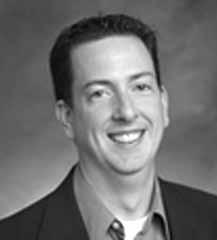

Friday - 1:00 p.m.
Boardman
Frank M. Diaz is an assistant professor of music education at the university of Oregon, where he teaches graduate and undergraduate classes in research methods, music in school and society, curricular strategies, and psychology of music. His research interests include music perception and cognition, mindfulness and attention during musical tasks, and motivation in educational settings. He has presented research at several venues, including the Music Educators National Conference, Texas Music Educators Association Conference, and the American Music Therapy Association Conference, and has publications appearing in the Journal of Band Research, Contributions to Music Education, and the Kansas Music Review. Currently, he serves as chair-elect of the Affective Response special Research Interest Group for the Music Educators National Conference and is the editor for their bi-yearly newsletter.
Diaz received a bachelor and Ph.D. in music education from Florida state university, and a Master’s in instrumental conducting and trombone performance from the university of south Florida. At the university level, Diaz has taught classes in music education, conducting, and applied trombone at both the university of south Florida and Florida state university. Additionally, he has served as an assistant conductor for the university of south Florida Wind Ensemble and symphony Orchestra, The Florida state university symphony Orchestra and Philharmonia, and for various youth orchestras and honor groups throughout the Eastern united states. As a public school teacher, Diaz taught instrumental music at the elementary, middle, and high school levels, and his groups have performed at national conferences such as the Midwest Band and Orchestra Clinic and the Music Educators National Conference.
Saturday - 4:00 p.m.
Boardman
Description: This session will consist of a small panel of successful music educators who lead high-achieving programs while operating within the parameters of block scheduling. In the presentation, we will present tips and techniques to show teachers the educational benefits possible within block scheduling.

Friday - 11:00 a.m.
Boardman
Effective advocacy for music education requires two components: a compelling message and a quality product. Drawing on years spent helping teachers defend music/arts programs statewide, MENC National President scott shuler blends marketing and visioning to help participants make a case convincing to varied audiences, from school administrators focused on test scores to businesses seeking creative, hardworking employees. The MENC/NAMM supportMusic.com site will be featured. Participants will have opportunities to pose questions and discuss answers.
scott C. shuler, MENC President for 2010-2012, is the Arts Education specialist in the Connecticut s tate Department of Education. He has served as Assistant superintendent for Curriculum and Instruction for the simsbury Public schools; taught 3-12 instrumental and general music and conducted church choirs in Michigan, Delaware, and Wisconsin; taught music education courses at several universities, including the Hartt school, Eastman school of Music, and New England Conservatory; and served as Associate Professor and Coordinator of Music Education at California state university, Long Beach. He earned his B.Mus. at the university of Michigan, his M.s. at the university of Illinois, and his Ph.D. at the Eastman school of Music.
Dr. shuler has authored many publications, served on MENC’s u PDATE editorial board, and presented countless workshops on topics such as music program development and assessment, teacher preparation, advocacy, and the role of the arts in middle schools. He was a member of the task force that developed America’s National standards in music; helped design and interpret the 1999 federal arts education survey and 1997 National Assessment of Educational Progress (NAEP) in the Arts; co-chaired the Council of Chief state school Officers’ s CAss multi-state arts assessment consortium; and served as president of the National Council of state supervisors of Music. He is currently president-elect of MENC: The National Association for Music Education, and will assume the presidency July 1, 2010.
shuler received Arts Education Policy Review’s “Young Writer’s Award” for excellence as an author; the Educational Press Association’s “Distinguished Achievement Award” for editing the MEJ special issue focusing on “Music and At-Risk students;” “Distinguished service” and “Outstanding Administrator” awards from Connecticut’s music, art, and theatre associations; California state university’s “Meritorious Performance Award,” Wisconsin’s “Legislative Citation for Excellence,” and the National Federation Interscholastic Music Association’s regional “Outstanding Music Educator Award.”
Middle School Gala Concert
Silva, Hult Center • Friday January 14th
5:00 p.m. Middle school Band Concert
5:45 p.m. Middle school Orchestra Concert
6:30 p.m. Middle school Young Men’s Choir
7:15 p.m. Middle school Young Women’s Choir
Elementary Gala Concert
Soreng, Hult Center • Saturday January 15th
10:00 a.m. All- state Elementary Choir
All-State Jazz Concert
Soreng, Hult Center • Saturday January 15th
5:00 p.m. All- state Jazz Concert
All-State High School Gala Concert
Silva, Hult Center • Sunday January 16th
1:00 p.m. All- state Women’s Choir
2:00 p.m. All- state Men’s Choir
3:00 p.m. All- state Orchestra
4:00 p.m. All- state symphonic Band
5:00 p.m. All- state Wind Ensemble
Eugene Hilton and Conference Center
Middle School Band and Orchestra
66 E 6th Ave
Eugene, OR 97401
Hult Center for the Performing Arts
All Student Concerts
1 Eugene Center
Eugene, OR 97401-268
University of OregonSchool of Music
HS- Wind, Orchestra and Choirs
1225 university of Oregon
Eugene, OR 97403-1225
Timothy Loest, Conductor
Gabriel Villasurda, Conductor
steve Peter, Conductor
Mia Hall savage, Conductor
Judy Herrington, Conductor
Wycliffe Gordon, Conductor
sharon Paul, Conductor
Jo-Michael scheibe, Conductor
Neal stulberg, Conductor
Eric Hammer, Conductor
Gary Green, Conductor
First Christian Church
Middle School Choirs
1166 Oak st
Eugene, OR 97401-3585
First Baptist Church of Eugene
Symphonic Band
3550 Fox Meadow Rd
Eugene, OR 97408-7424
John G. Shedd Institute for the Arts
Jazz Band
868 High street
Eugene, OR 97401
Lane Events Center
Middle School Band and Orchestra
796 W 13th Ave.
Eugene, Oregon 97402
Burke-Griffith Hall
Elementary Choir
Northwest Christian College
828 East 11th Ave.
Eugene, OR 97304
Time: Friday, 11:00 a.m.
Soreng Theatre-Hult Center
Sam Barlow High School and U of O Wind Ensemble

Sam Barlow High School- Paul Nickolas, Director
After growing up in Armonk, New York, and playing in a high school band of 30, Paul Nickolas attended Indiana university in Bloomington, Indiana. After graduating with high distinction from its Music Education program, he began teaching middle school band and elementary school general music in Morris, Illinois. Three years later, Paul returned to Indiana university on a full assistantship program to study Wind Conducting with renowned conductor Ray E. Cramer. At Indiana, he had the opportunity to conduct concert ensembles of all levels, as well as football, basketball, and soccer pep bands. upon graduating with high distinction, Mr. Nickolas accepted the position at sam Barlow High school, being its second director in its 41 year history.
Mr. Nickolas’ bands at sam Barlow have received many conference, state, and regional awards. They have numerous top five finishes at the OsAA state Band Contest, performed at the Oregon Music Educators Association Conference and at the MENC All-Northwest Conference. Paul also initiated an active chamber music curriculum that has resulted in several regional and state acknowledgements. As a member of the Music Educators National Conference, Paul has served as the Oregon Music Educators Association band chairman for three years. Through these years, he has submitted several articles for the Oregon Music Educator Journal. starting in 1998, he has been a regular contributor to Richard Miles’ Teaching Music Through Performance in Band.
Frenergy by John Estacio, transcribed by Fraser Linklater
One Life Beautiful by Julie Giroux
Strange Humors for Saxophone Quartet and Djembe by John Mackey Handel in the Strand by Percy Grainger
Oregon Wind Ensemble- Bob Ponto, Director
Bio: Robert Ponto is associate professor of conducting and director of bands at the university of Oregon. He conducts the Oregon Wind Ensemble, supervises the graduate program in wind conducting, and serves as coordinator of recruitment and outreach.
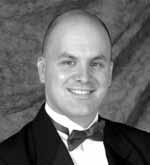

Originally from Milwaukee, Wisconsin, he received degrees from the university of Michigan and the university of Wisconsin-Eau Claire. Prior to his appointment at the university of Oregon in 1992, Ponto held conducting/teaching posts at the Oberlin Conservatory of Music, East Carolina university, Pacific Lutheran university, and in the public schools of West st. Paul–Mendota Heights, Minnesota.
Ponto’s frequent appearances as guest conductor include the Detroit Chamber Winds, the Interlochen Arts Academy Band, and numerous state and regional honor bands throughout the united states. Ponto has also earned respect as a creative and inspiring teacher of conducting, working with students throughout the united states, Canada, and the united Kingdom. His ensembles have appeared at state, regional, and national MENC conferences, regional CBDNA conferences, and at the Bang On A Can contemporary music festival in New York City.
As an instrumentalist, Ponto’s performance credits include the world premiere of Karlheinz stockhausen’s opera, saturday from Light at La scala in Milan, Italy, as well as many appearances with the Emmy Award-winning Washington Brass Quintet.
Ponto is an active member of the Music Educators National Conference and past president of the Northwest Division of College Band Directors National Association.
Time: Friday, 1:00 p.m.
Room: O’Neill
In addition, she was Dean of the Music Department in Prokofiev Music school in Almaty (the capital of Kazakhstan) for a number of years. Also included among her honors are the Excellence of Teaching medal from the government of Kazakhstan and her selection as soviet union Laureate Teacher of the Year.
Ms. Podolnaya’s student soloists and ensembles in Kazakhstan took first prizes in numerous high- level international competitions. some of her students were granted green cards in the us for being outstanding violinists. Ms. Podolnaya also travelled with her students, performed and lectured in many music schools in Kazakhstan.
Group Information: siskiyou Violins is a group of exceptionally talented young violin students from southern Oregon and northern California. Originally born from a handful of advanced violin students of local instructor Faina Podolnaya who would occasionally perform ensemble pieces at student recitals, the group has grown to become an independent organization. Currently we have both an Advanced Ensemble and Juniors Ensemble totaling close to 60 students who range from as young as 4 years old through college age.
siskiyou Violins is a registered nonprofit corporation in the state of Oregon, and has qualified for 501(c)(3) nonprofit status. We are open to any violin student who desires to participate and demonstrates ability to perform at this level by auditioning with our Artistic Director, Faina Podolnaya, and who is able to attend required rehearsals, regardless of financial circumstance.
siskiyou Violins Mission s tatement:
“We enable talented young students to pursue their passion for the violin through inspired leadership, high expectations, self-discipline, and appreciative recognition. We provide opportunities to perform in concerts in southern Oregon and beyond, and in competitive festivals globally. We seek opportunities to perform in school settings to motivate students - and parents - into engaging in musical training. We encourage public investments in school-based music and arts education for all students. We support other music and arts groups in s outhern Oregon.”
Bio: Faina Podolnaya, Ms. Podolnaya, born in a small village in the u kraine, began playing violin herself at the age of 7. Ms. Podolnaya earned a Diploma in Music s tudies from Konotop s chool, a Bachelor’s Degree in Music and Teaching from Karaganda College of Music; and a Master’s Degree in Music Teaching and Performance from the Kazakhstan s tate university.
she was the leading violin teacher at the most prestigious music school in most prestigious music school in Kazakhstan, former republic of the ussR, the Music College for Gifted Children of Almaty state Conservatory.

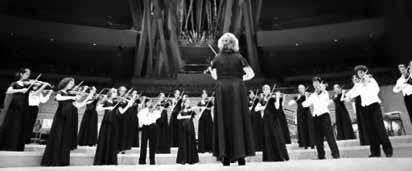
Ms. Podolnaya came to the us in 1999, to be reunited with her family. she settled in Ashland where she started a small private music studio for violin and viola students. Her stellar teaching skills soon placed her services in high demand once more. since opening her studio in the us, increasing numbers of her students have become professional musicians. Many have entered professional music schools, and have become soloists and symphony players throughout the world. she also serves as the Associate Conductor of the Youth symphony of southern Oregon (YssO).
Waltz by E. Doga
Russian Folk s ong
La Cumparsita by Rodriguez / Arranged by McLean
Over the Rainbow by Harold Arlan / Arranged by Bob Cerulli
Balbrown by Brusilovsky
Romance by Georgy sviridov
Concerto in A minor by Antonio Vivaldi
smoke Gets in Your Eyes by Jerome Kern
Joke – souvenir by Frolov
Fandango by Michael McLean
Theme from schindler’s List by John Williams
Perpetuum Mobile by K. Bohm
Beaumont Rag
Time: Friday, 1:00 p.m.
Soreng Theatre-Hult Center
Warrenton High School- John Hammond, Director
Bio: John Hammond is in his 34th year of teaching and 8th year at Warrenton. His duties have included teaching band grades 5-12 and choir 7-12. Currently he is semi-retired and teaches only at the High school, Jazz Band, Concert Band and Concert Choir. During most of his time at Warrenton, Mr. Hammond has been the only music teacher in the district. Now Mr. Michael McClure teaches music at the grade school. During his tenure at Warrenton, Mr. Hammond’s bands have qualified for the state Band Contest five times bringing home a 3rd and three 1st places. The choir has qualified twice for the state Choir Contest coming in 5th last year. Prior to coming to Warrenton, Mr. Hammond taught at Colton, Neah-Kah-Nie, Beaver (Nestucca District) and Tillamook.
Mr. Hammond has his MM in trombone performance from the university of Nebraska and Bs in math and music from Oregon College of Education (WOu). He is the principal trombonist in the North Coast symphonic Band and directs a church choir. His private students have been accepted for All state and state solo Contest on every band instrument except the double reeds. Mr. Hammond is a member of the WOu sports Hall of Fame as a member of the 1972 track team and has coached basketball and track.
Mr. Hammond and his wife of 32 years, Donna, have a daughter and a grandson.

Matthew Hoffman has been director of instrumental music at Triad school in Klamath Falls since 2007. under his leadership, the Triad high school band has received high marks at the district festival, advancing to the state competition the past three years and placing third in the state in 2009.
Mr. Hoffman received his musical training at Willamette university, studying under Dr. Martin Behnke (band), Dr. Wallace H. Long, Jr. (choral) and Dr. Paul T. Klemme (pipe organ). He is also Director of Music at sacred Heart Catholic Church in Klamath Falls where he directs two choirs and is principal organist.
He and his wife, Rachel, have three children.
Time: Friday, 3:00 p.m.
Soreng Theater - Hult Center
Youth Symphony of Southern Oregon

Dr. Cynthia Hutton, Director
The Gladiator
John Philip sousa arr. Andrew Balent
On a Hymnsong of Philip Bliss
Victory at sea
Transcribed by Robert Russell Bennett
David R. Holsinger
Richard Rodgers
Group Information: The Youth symphony of southern Oregon (YssO) is dedicated to providing young people with opportunities to expand their knowledge of classical music by learning and performing challenging orchestral and chamber music repertoire. The mission of the YssO is to provide exceptional performance experiences under the leadership of professional conductors and music coaches and to foster a lifelong appreciation of classical music and the arts.
Beginning with one ensemble and a season of three concerts in 1988, the YssO now includes Youth strings, Youth Orchestra and Youth symphony. The 2010-2011 concert season marks the YssO’s 23rd year of performances. The YssO presents three multi-performance Concert series in professional venues in Ashland, Medford and Grants Pass, as well as

Chamber Music series concerts, a Concerto Competition for advanced Youth symphony musicians and Community Outreach Concerts at the Rogue Valley Manor. Each season YssO musicians learn and perform standard orchestral literature, concerti, arrangements for preparatory orchestra and string ensemble, and chamber music. Participation in the YssO is by annual audition and placement in an ensemble. Throughout its more than two decades of providing music programs, concerts of classical music and training, the YssO has been dedicated to artistic quality, access to music opportunities, educational excellence, fiscal integrity and responsible stewardship of resources. The YssO provides positive and enriching opportunities for young people and extraordinary performances for the public.
Bio: Dr. Cynthia Hutton has served as Music Director of the Youth symphony of southern Oregon (YssO) and Conductor of Youth symphony and Youth Orchestra since 1995. In addition to her work with the YssO, Dr. Hutton is Associate Professor of Music and Director of Bands at southern Oregon university where she teaches classes in conducting, music theory, brass methods and instrumental music education. she is a member of the Rogue Valley symphony and the sOu Faculty Brass Quintet. Dr. Hutton has served on the boards of the Oregon Music Educators Association and the College Band Directors National Association - Northwest Division. Dr. Hutton is a recipient of the Alteria M. Bryant Award honoring women in the arts, as well as sOu’s Elmo stevenson Presidential Award. Prior to coming to southern Oregon, Dr. Hutton served as Director of Bands and horn instructor at the university of California, san Diego, and was Assistant Conductor of the La Jolla Civic university Orchestra. she received her doctorate in conducting from the university of Colorado at Boulder.

Youth Symphony of Southern Oregon (YSSO) Program
Youth Symphony Brass Ensemble
Fanfare from La Péri Paul Dukas (1865-1935)
Youth symphony La muse et le poète, op. 132 Camille saint- saëns (1835-1921)
Ashley Hoe, Violin & Chas Barnard, Cello
2010 YssO Concerto Competition Winners
Le chasseur maudit César-Auguste Franck (1822-1890)
Time: saturday, 1:00 p.m.
Soreng Theater - Hult Center
West Salem High School Chamber Orchestra and Portland State University Symphony
West Salem High School Chamber Orchestra
Daryl Silberman, DirectorBio: Daryl silberman has been the director of orchestras at West salem High school in salem, OR, since August 2007. under her leadership, the orchestra has traveled to Boston and hosted the salem-Keizer District Orchestra festival annually, and her Chamber Orchestra has also qualified and performed at the OsAA state Orchestra Championships annually. Daryl studied viola at the university of Colorado at Boulder (B.M.), san Francisco Conservatory of Music, and u s.C. she was a national clinician for Knilling string Instruments for years before coming to Oregon. she had a private teaching studio and freelanced as a violist and violinist in Los Angeles area with regional orchestras, movie studio orchestras, chamber groups, and baroque ensembles. In addition, Daryl was a licensed Kindermusik instructor, teaching early childhood music. Daryl and husband, violist Danny seidenberg, have two performing groups that keep them busy — unBande (two violas, cello and guitar playing classical crossover, jazz, pop and blues) and salem Baroque (two baroque violins, cello and harpsichord) — in addition to parenting two active children,Emma and Teddy.
West Salem High School Chamber Orchestra Program
Frolicsome Finale from simple symphony Benjamin Britten
Prelude and Fugue by Giannini
Tango by Michael McLean
Portland State University Symphony
Ken Selden, Director
P su Performance Information: under the direction of Ken selden since 2006, the P su symphony has been awarded three prizes in Adventurous Programming from As CAP and the League of American Orchestras. Recent concerto soloists with the orchestra include internationally acclaimed musicians Manuel Barrueco, Orli s haham, Matt Haimovitz, Richard Zeller and Awadagin Pratt, as well as P su faculty members Hamilton Cheifetz and Carol sindell. Yearly collaborations include opera, chorus and ballet. The symphony also hosts an annual Concerto Competition and a Composition Competition. Within the P su symphony, there is also a chamber orchestra, a string orchestra and a new music ensemble, as well as a principal string quartet, brass quartet and wind quintet. For more information, visit http://psusymphony.wordpress.com

Bio: Ken selden- In the fall of 2006, Ken selden was appointed Conductor and Music Director of the symphony Orchestra and New Music Ensemble at Portland state university. His first two seasons with the Psu symphony were awarded consecutive First Prizes in Adventurous Programming from AsCAP and the League of American Orchestras. Recent guest artists with the orchestra include Manuel Barrueco, Orli shaham, Matt Haimovitz and Awadagin Pratt, as well as Psu faculty members Hamilton Cheifetz and Carol sindell. since arriving in Portland, selden has appeared as guest conductor of the Oregon symphony, Third Angle New Music Ensemble, Portland Youth Philharmonic and the Newport symphony.
During the previous five years, selden led a series of performances as Assistant Conductor of two innovative ensembles – the Brooklyn Philharmonic and the Eos Orchestra. He also worked extensively with the Juilliard Pre-College Orchestras and the New Jersey Youth symphony, and was Music Director of orchestras at Brooklyn College and Columbia university.
A strong advocate for new music, selden has worked with composers Pierre Boulez, John Cage and Tan Dun, and has conducted recent world premieres of music by Peter Lieberson, Michael Nyman and stephen Paulus.
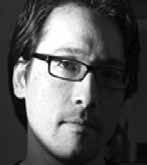
A graduate of New England Conservatory, Indiana university and Peabody Conservatory, selden studied violin with James Buswell and Yuval Yaron, and conducting with Gustav Meier and Markand Thakar. He also performed in masterclasses for Neeme Jarvi, Jorma Panula and Yuri Temirkanov, and attended the National Conducting Institute (Kennedy Center), where he worked with Leonard slatkin and conducted the National symphony.
selden made his debut with the National Arts Center Orchestra at the invitation of Pinchas Zuckerman, and subsequently appeared with orchestras of Denver, Baltimore, Minnesota and North Carolina, and at music festivals in the united states, Israel, Japan, Romania and switzerland. Additionally, he has performed with the Moscow Chamber Orchestra at the David Oistrakh Festival and conducted orchestras in Finland, Italy and Belgium.
PSU Symphony Concert Program symphony No. 6 in B Minor, Op. 74 “Pathetique”
Pyotr Ilyich Tchaikovsky (1840-1893)
Published by Breitkopf and Hartel
Time: saturday, 3:00 p.m.
Soreng Theater - Hult Center, Eugene
Shasta Middle School and OSU Jazz Ensemble
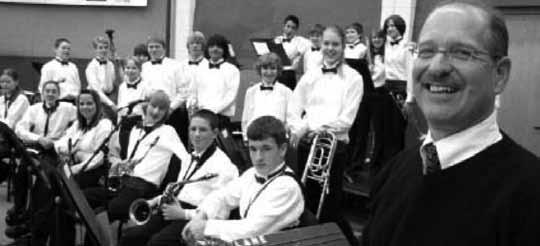
Shasta Middle School: Joe Ingram, Director
The shasta Middle school Jazz Band is an audition group that meets in the mornings before school, and is made up of 7th and 8th grade band students with an occasional 6th grade student. All shasta Jazz Band students must be in at least one other ensemble to be eligible to try out for the Jazz Band.
Joe Ingram has taught music for 33 years, the last 26 as the band director at shasta Middle school in Eugene. During that time his concert bands have consistently received superior ratings at festivals and his jazz bands have won festivals in Oregon, Washington and Idaho. Joe has traveled as a staff member to Europe with the Oregon Ambassadors of Music on three occasions and directors several jazz and concert band camps during the summer through Oregon Festival of American Music and Arts umbrella. In 1993 Joe was awarded the Presidential scholars Distinguished Teachers Award in a ceremony at the White House, and IN 2005 was selected as one of six Oregon Middle school Teachers of the Year.
More than 80 awards line the shelves in the band room at shasta Middle school. They are an ever present reminder of the consistently high standards achieved by the shasta Bands under the direction of teacher Joe Ingram. For more than two decades, Ingram has guided his young musicians with smiles, words of encouragement and a conductor’s authority. Ingram was the 1993 National Teacher of the Year and 2005 Oregon Middle Level Teacher of the Year, awards which he humbly accepted on behalf of his dedicated band students.
OSU Jazz Ensemble

Dr. Christopher Chapman, Director
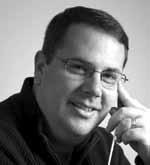
Group Information: The 20-member Osu Jazz Ensemble is under the direction of Dr. Christopher Chapman. The ensemble features the most outstanding jazz saxophones, trumpets, trombones and rhythm section players on the campus. The group performs professional level repertoire and holds concerts on campus and around the state of Oregon. Recent performances have included compositions from Kubis, Menza, Parker and Bellson.
Bio: Dr. Christopher Chapman is the Director of Bands for the Oregon state university Department of Music, where he conducts the Wind Ensemble, Wind symphony, Jazz Ensemble and Chamber Winds, and teaches courses in music education and graduate and undergraduate instrumental conducting. Prior to his appointment at Osu he served as the Associate Director of Bands at Florida Atlantic university, where he founded the athletic band program and symphony Band. From 2002-2005 Chapman worked as the Graduate Assistant Director for the university of Washington band program and before then served as the Director of Bands at Foothill High school in Henderson, Nevada. Originally from Columbus, Ohio, Chapman holds a bachelor’s degree in music from The Ohio state university, a master’s degree in music from the university of Nevada, Las Vegas, and a doctorate of musical arts degree from the university of Washington.
He has studied conducting with Richard Blatti, Thomas Leslie, Takayoshi “Tad” suzuki, and Timothy salzman. Dr. Chapman is a sought-after clinician, adjudicator, and conductor, and has worked with bands regionally, nationally and internationally including Oregon, Ohio, Florida, Nevada, New York, Arizona, Illinois and Japan. He has been a contributing author in A Composer’s Insight: Thoughts, Analysis and Commentary on Contemporary Masterpieces for Wind Band, a series of books on contemporary wind band composers for Meredith Music Publications, a subsidiary of the Hal Leonard Corporation and Teaching Music through Performance by GIA Publications. He is an honorary member of the Kappa Kappa Psi Honorary Band Fraternity where he has served as the Co-Governor of the Western District, and an honorary member of the Tau Beta sigma honorary band sorority. He currently serves as President-elect for the Northwest division of the College Band Directors National Association and the Oregon state representative for the National Band Association.Other organizations include the Oregon Band Directors Association, Music Educators National Conference, and Oregon Music Educators Conference.
Time: Friday, 11:00 a.m.
Studio 1-Hult Center

Sunset Middle School- Ken Graber Director
Group Information: sunset Middle school is a 7/8 Middle school within the Coos Bay school District. Nestled on the southern Oregon Coast, Coos Bay’s roots lie in the lumber and fishing industries. Although the community has been forced to rethink its economic potential, it continues to maintain its commitment to the arts. This is evident in the many local theater productions and art opportunities available to all ages, as well as the overall support of the music programs at sunset Middle school and Marshfield High school.
Vocal Ensemble is an auditioned group composed of 7th and 8th grade musicians. Their goal is to bring life to vocal music through the study of its history and genres. Over the past 8 years, Vocal Ensemble has performed at numerous community functions and as a guest ensemble with various high schools and colleges throughout the state.
Bio: Ken Graber was raised in Dallas, Oregon. He attended Bethel College in North Newton, Kansas, returning to Western Oregon university in Monmouth, to complete his degree in music education in 1989. He spent 7 years as the 7-12 choir director in Reedsport, Oregon and then took the choral position at Marshfield High school in the Coos Bay school District. In 2002, schedule adjustments allowed him to teach at sunset Middle school as well. He has enjoyed being a certified choral adjudicator which provides him the opportunity to work with middle and high school choirs around the state. He has been a member of the local barbershop chorus, a member of south Coast Harmony Quartet and director of his church choir. He also remains active in OMEA and ACDA as well as a variety of community choral events and shows. Ken and his wife Julie live in North Bend and have three wonderful children, Levi, Noah, and Hannah. In addition to musical activities, Ken enjoys working on old cars, especially his ‘68 saab sonnet, construction and working in the garden.
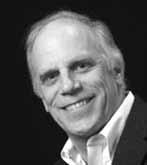

Sunset Vocal Ensemble Concert Program
Come to Me, O My Love
Can’t Buy Me Love
Dreams of Thee
Didn’t My Lord Deliver Daniel
Homeward Bound
Yemaya Asesu
Wind
Come Travel With Me
Allen Robert Petker
Arr. Mac Huff
Eric William Barnum
Arr. Roger Emerson
Marta Keen
Arr. Brian Tate
Carolyn Jennings
scott Farthing
Windy Nights ...................................................................... Cynthia Gray
The storm is Passing Over
Charles Albert Tindley
Russ Christensen, Director
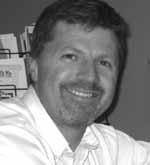
Bio: Russ Christensen In the spring of 2009, Russell Christensen completed his 16th year as choral director at sprague High school in salem, Oregon, and became the choral director for the Osu Meistersingers men’s chorus. Christensen holds a Bachelor of Arts in music education from the university of Oregon, and a Master of Arts in music education from Western Oregon university. Choirs under his direction have been selected to perform at national, regional, and state conventions of the American Choral Directors Association and Music Educators National Conference. During Christensen”s tenure at sprague, the school’s Concert Choir placed at the ACDA/OsAA state Choir Competition every year including winning nine championships. In 2000, the sprague music department was chosen as the National Grammy signature school by the GRAMMY foundation. Christensen was named Oregon Music Educator of the Year for 2007 by the Oregon Music Educators Association. In 2004, The Oregon symphony Association in salem recognized him as Music Educator of the Year. He is also the first recipient of the Western Oregon university Alumni Excellence Award in Music. Russ is a member of ACDA, OMEA, and MENC and has held various offices within these professional organizations.
Time: Friday, 3:00 p.m.
Studio 1-Hult Center
Rex Putman High School
Group Information: Rex Putnam High school is located at 4950 sE Roethe Road, Milwaukie, Oregon. It is ten miles south east of Portland, Oregon in Clackamas County and is part of the North Clackamas school District #12. It has an enrollment of approximately 1200 students grades Fresh-
man through senior. The Choir department is comprised of five choirs: A Cappella Choir (sATB audition), Choralaires (Chamber Choir), Vocal Point (select girls), Kingsmen Chorus (boys), Cantabile (girls). Mr. Baker also teaches Beginning Guitar. The A Cappella Choir and Choralaires have performed at state and regional ACDA and MENC Conventions. Last spring the choir performed in the NWACDA Convention in seattle, WA. In March of 2011 the A Cappella Choir will perform at the ACDA National Convention in Chicago, Ill. We are honored to perform at the OMEA Convention in January. “Do not let what you cannot do interfere with what you can do.” This quote, by John Wooden, serves as our inspiration to reach for our collective potential.
Bio: John Baker, Choir Director, graduated from Oregon College of Education in the fall of 1979. On February 11, 1980, he stepped into his current Choral teaching position at Rex Putnam H.s. Mr. Baker received his Master of Music in Education from Western Oregon state College (now Western Oregon university). He is a frequent clinician and adjudicator around the Pacific Northwest. In the fall of 2008, he served as festival clinician at the Bangkok International Choir Festival held in Bangkok, Thailand. Music literacy is a trademark of Mr. Baker’s teaching. He has a sight-reading/Theory program which is used at many high schools and middle schools throughout the Northwest. Developing complete choral musicians is his passion. One of Mr. Baker’s mentors, John Wooden, passed away earlier this year just months before his 100th birthday. The book, “They Call Me Coach” by John Wooden is a must read.

Group Information: The Re-Choired Element Chamber Choir is the select, auditioned choral ensemble of Linn-Benton Community College in Albany, Oregon. The ensemble is composed of approximately 25 mixed voices. The students in the ensemble represent a wide variety of musical backgrounds and include majors from across the college including music, theater, computer science, health occupations, mecatronics, and many others.
The Re-Choired Element Chamber Choir has performed throughout the Pacific Northwest and the united states. Performances have included invited performances in Washington, California, and New York City. They have received top honors for their performances in the Oregon ACDA small Ensemble Choral Festival, Heritage Music Festivals and Festivals
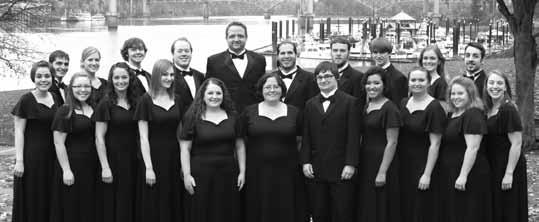
of Gold. In addition, the ensemble has performed for the Oregon state s enate, Oregon Music Educators Association Convention, Northwest ACDA Convention, Northwest MENC Convention, and Oregon school Board Association. In 2010, Re-Choired Element received 2nd place in the university and College Division of the American Prize in Choral Performance. In 2011, the ensemble will also compete in the American International Choral Festival in Reno, Nevada.
Bio: James Reddan is the Professor of Music & Director of Choral Activities at Linn-Benton Community College in Albany, Oregon. Prior to his arrival at LBCC in 2008, Reddan served as the Director of Choral Activities at Arbor View High s chool and Cannon Junior High s chool in Las Vegas, NV. Additionally, Reddan has served as the Artistic Director and Conductor of the Eugene Gleemen (Eugene, Oregon) and the Choir of st. Thomas Episcopal Church. He is now in his 3rd year at Linn-Benton Community College.

Ensembles under Mr. Reddan’s direction have been featured at local, regional, national, and international conventions and choral festivals regularly receiving superior and gold ratings. His ensembles have performed at Christchurch Cathedral (Dublin), Royal Academy of Music (London), Beijing Conservatory of Music (Beijing, PRC) amongst other international venues. Reddan has been recognized for his conducting of several world premiers with renowned composer Rebecca Oswald. In 2010, Reddan received the special Citation for Excellence in Music Education from the American Prize in Choral Conducting. Reddan has appeared as adjudicator, clinician, presenter and panel member throughout the united states.
Reddan is currently a Doctoral student in Music Education at Boston university. He is a cum laude graduate of McDaniel College (Maryland) with a BA in Music Education and holds MMus degrees in Choral Conducting and Music Education from the university of Oregon. Reddan studied conducting with sharon Paul, Richard Clark, and Margaret Boudreaux, and voice Kyle Engler, and Mark Beudert. Reddan has had additional conducting and vocal training at the Queensland Conservatorium of Music, Brisbane Australia and the Oregon Bach Festival.
Pastime With Good Company Henry VIII (Ed. Margaret Boudreaux)
O Vos Omnes Blake R. Henson
Innsbruck, ich muss dich lassen Heinrich Isaac Mirabile m-ysterium Taylor Davis
We Three Kings Arr. Darmon Meader sleep Eric Whitacre

Friday, January 14 8:00 a.m. Registration
a.m.
p.m. 3:00 p.m.
5:00 p.m. Middle school All- state Gala Concert silva Hall
8:00 p.m. Receptions
saturday, January 15
8:00 a.m. Registration and Visit Booths
9:00 a.m.
10:00 a.m. All- state Gala Elementary Choir Concert soreng
11:00 a.m. General session, Keynote: Peter Boonshaft soreng
1:00 p.m.
2:00 p.m.
3:00 p.m.
4:00 p.m.
5:00 p.m. All- state Jazz Gala Concert soreng
6:00 p.m. Pre-Banquet Entertainment and salsa Bar, Featuring Oregon state stelel Drum Choir Hilton Lobby
6:30 p.m. Conference Banquet and Celebration, Featuring Trombones De Costa Rica Hellman/Williams/O'Neill
sunday, January 16
8:00 a.m. Registration 9:00 a.m.
a.m. 11:00 a.m.
1:00 p.m. High school All- state Honor Concerts silva Hall
Cut out for your quick reference schedule
Boston university Tanglewood Institute (BuTI) is an intensive summer music program for gifted young classical musicians of high school age (14 to 18 years old). Located in the beautiful Berkshires of Lenox, Massachusetts just steps away from Tanglewood, BuTI is preeminent among summer programs of its type and is the only such program affiliated with a major professional ensemble, the Boston symphony Orchestra.
Please visit our website for full information about Bu TI – www.bu.edu/tanglewood A program brochure is available on our homepage.
Contact: Emily Culler or Jennifer Palmer
Deadline: February 8th, 2011
Nothing that compares to attending a worldrenowned orchestral performances –the sights, the sounds, the collaboration between the conductor and the musicians, and the community spirit among fellow classical music enthusiasts. The Los Angeles Philharmonic is embarking on an innovative program this year – LA Phil LIVE.
To make it easy for you to spread the word about this series to your students, the LA Phil has created an online toolkit. This toolkit includes promotional items such as event trailers, posters and other sharable assets, as well as ideas for creating your own events to help ingnite excitement from your students around LA Phil LIVE. More informations and the toolkit is available at www.laphil.com/laphillive
The salem Pops Orchestra’s scholarship Committee awards two types of music scholarships to music students from Marion and Polk counties: (1) A $1,000 cash award to a graduating senior and (2) music camp scholarships to
sophomores and juniors, up to $250. Complete information for the scholarships is available on our website: www.salempopsorchestra.org.
senior Cash scholarship: Finalists are required to audition for adjudicators selected by the salem Pops Committee. The winner will be announced at the March 12th concert and invited to perform with the s alem Pops on our May concert. Applications due January 31st, 2011.
Music Camp scholarships: These applications are not due until April 11, 2011 and the applications can be found online.
Contact : Hale Thornburgh
Deadline: senior- applications are due January 31st, 2011
Deadline: Camp- applications are due April 11, 2011
We are very pleased to announce the inaugural Toyota International Teacher Program to south Africa! The program will take place July 24 –August 10, 2011. Full-time classroom teachers of all subjects and librarians, grades 7 –12, are now invited to apply online.
The Toyota International Teacher Program is a fully-funded international professional development program for u s. educators. Funded by Toyota Motor sales, u s.A., Inc., and administered by the Institute of International Education, the program advances environmental stewardship and global connectedness in u s. schools and communities.
Thank you for considering this request to help us spread the word about this unique opportunity. Teachers can visit our website at www.iie.org/ toyota for application instructions, FAQs, and to apply online.
Contact: International Teachers- toyotateach@ iie.org or by phone at (toll-free) 877-832-2457
Deadline: Applications due by January 23, 2011 Young Musicians in Pacific NW Invited to Compete in KING-FM’s “Young Artists” Competition
Young musicians in Washington, Oregon and Idaho are invited to vie for a $1,000 scholarship and a chance to perform on stage at Benaroya Hall during the fourth annual “Ten Grands” concert on April 1, 2011.This award is sponsored by 98.1 Classical KING FM. The official contest rules and entry form, plus the judging timelines, are online at www.king.org
Deadline: Jan. 14, 2011
2011 symposium on Music Teacher Education: Intersections of Practice, Research, and Policy
september 15-17, 2011 at the university of North Carolina at Greensboro
The purpose of this fourth symposium is to sustain the professional conversations that have characterized the first three symposia held in 2005, 2007, and 2009; to engage a broad constituency of practitioners and policy makers in these conversations; and to articulate our shared responsibility for music teacher education.
Toward this shared responsibility, we invite participation from music teacher educators, deans/ directors of schools of music, state and local fine arts supervisors, state policy officials associated with certification, licensure, and school improvement, K-12 educators, and graduate students in music education.
The s ociety for Music Teacher Education is particularly committed to effecting change through informed collaborative action. We invite proposals for the 2011 symposium on Music Teacher Education that address critical issues and further our goals. As fits the theme of the symposium, we also encourage submissions that address the intersections of practice, research, and policy. For further information visit http://smte.us/aspa/
Contact: Michael Raiber, university of Oklahoma school of Music <raiberma@ou.edu>
Deadline: April 1, 2011: (submission proposals)
There is no doubt that our schools are facing a budget crisis; virtually 100% of the nation’s schools are currently facing this same crisis. But any “crisis” is also a potential opportunity. In this case, it’s an opportunity for school boards and administrators to take a fresh look at our educational goals, educational policies and educational practices, and to re-evaluate. what is truly important and what is not... what truly works and what does not. And then, it’s an opportunity to find new and creative ways to ensure the best possible education for our children. In some cases, it’s an opportunity to reassess and re-define what comprises "the best possible education for our children.”
We see many straight-A students unable to correlate their knowledge to real-life experiences, unable to adapt to our changing - and sometimes scary - world. so, we look for ways to make our children's education "relevant." Technology is "relevant," math and science are "relevant," we say. But then, the nation's top companies say that the characteristics they desire most in future emplyees, the skills they consider most relevant to real-world success, are are well-developed communication and iterpersonal skills, striving for excellence, and the ability to solve problems in creative and flexible ways - a totally different skill set.
Interestingly enough, these characteristics sought after by top corporations are all things that are fostered and developed in the music classroom... one of the first places administrators look to make cuts in times of “crisis.” A common knee-jerk reaction to budget cuts is to look first at eliminating programs like the arts, which are often deemed "extra- cuxricular” by uninformed administrators, educators, and parents alike. According to the EsEA (Elementary & secondary Education Act), the arts are defined as a core academic subject. According to u s secretary of Education Anne Duncan, they play a significant role in children's development and learning process. Yet music programs are constantly under threat of elimination,in part to help balance the educational budgets, and also
in part to put more money into increasing test scores in reading, math and science.
Ironically, music participation is a very key component in raising test scores, and in preparing our students to thrive in the 21st century workplace. The studies that prove this are manifold, and the research is irrefutable. Our almost panic-level concern for raising test scores in math and science, along with a concern for technology awareness, has caused us to discount countless studies that show that music participation in school has an effect on children’s education that no other subject has. A few examples:
• The College Entrance Examination Board found that students in music classes scored, on average, 50 to 100 points higher than students with no arts coursework (CEEB, 2004). The difference in scores becomes more dramatic as the years of music participation increases.
• students in top-quality music programs scored 22% higher in English and 20% better in math than students in deficient music programs, and these academic differeences were consistent across geographic areas (Journal of Research in Music Education, 2007).
• u s . Department of Education data shows that students with consistently high levels of involvement in instrumental music during the middle- and high-school years show significantly higher levels of math proficiency by grade 12 (Catterall, Chapleau Iwanaga, uCLA, 1997). For children of lower socio-economic status, the impact of instrumental music involvement was even greater, showing that instrumental music involvement has the ability to help "close the gap" for high-risk students.
• A 10-year study, tracking more than 25,000 students, shows that music-making improves test scores. Regardless of socioeconomic background, music-making students get higher marks in standardized tests than those who had no music involvement. The test scores studied were not only standardized tests, such as the sAT, but also in reading proficiency exams (Dr. James Catterall, u CLA, 1997)
• s tudents with one year of musicparticipation show an 11% increase in academic performance, students with two years show an increase of 14%, students with three years show an increase of 17%, and students with four years
of music participation show an increase of 23% (Dr. Tim Lautzenheiser, 2010).
• In California, where cuts in public school instrumental music programs caused a 57% statewide reduction in student participation, a downward trend of test scores resulted (Dr. John Benham, 2010).
Detractors of school music programs, focused on the assumed “cost” of retaining a music teacher, are ignoring a very simple fact: It costs more to cut a music teacher than to keep one. Dr. John Benham, of Music in World Cultures, has proven this unequivocally by looking at FTEs, class size, and other relevant factors.
As a result of the aforementioned music program cuts in California, the state cut 355 teaching positions, predicting an annual savings of $17.75 million. In reality, providingfor those same students in a regular classroom would require 473 teachers, costing the district approximately $23.65 million - an annual loss of nearly $6 million. As middle school program cuts resulted in declining music enrollment in the high schools, the financial loss to the district became even more significant. Our band and string teachers, many of whom teach at more than one school, have no scheduled lunch or planning periods, teach classes far greater in size than the average classroom teacher, and put in countless after school hours, are not a financial liability; in fact, quite the opposite!
More important than the financial justifications for sustaining school music programs are the effects cutting band and string programs will have on the children who currently benefit from these programs. How will we continue to ensure equal access for those children whose parents cannott provide music instruction after school, who cannot afford to purchase an instument or pay for private lessons? Theseare the very same children whom research proves benefit greatly from their involvement in school music (see Music, At-Risk students and the Missing Piece, s shuler, Music Educator Journal, Nov. 1991)
Music participation has been shown not only to help students develop important skills, but also to help them avoid the problems of frustration, alienation, and self-doubt that often place

students at risk of failure. Music participation has been shown to develop motivation, a sense of connection with school. and a sense of self-competence in at-risk students. It has proven successful in raising the level of taskengagement and productivity in at-risk students. Taking school music away from these children will exponentially increase the distance between the “haves” and the “have-nots” just as music participation had previously played a major part in "closing the gap.” Can that possibly be “the best possible education for our children”?
In many ways, a school music ensemble is a microcosm of society. Children in performing music classes learn to communicate, analyze, synthesize, evaluate, adapt, and cooperate. They learn to be unselfish, flexible; to accept the direction of a leader, as they come to realize the essential part they play in the group as they strive, for excellence both as individuals and as a whole. All characteristics deemed necessary for success in the future. They learn to be creative, and feel the joy of shared aesthetic experiences. On top of all that, they learn, through music, about history, culture, literature, language, physics and mathematics in ways that cannot be experienced in other classrooms.
Yes, we are facing a crisis. But let’s not allow it to throw us into a panic so severe that we lose track of our educatioinal goals, of what is truly important and what is not. We have poured countless dollars and hours into creating new programs, new tests, new ways to improve test scores... and while some have been successful, a large number have not. Now, we are talking about eliminating the very programs that have been unequivocally proven to help us reach our goals, to teach our children what is important for success, and to prepare them for success in the future.
The majority of today’s college freshmen will interview four years from now for jobs in fields that do not even exist yet. What skills will they need? What they take with them as the most important and relevant learning experiences of
their school careers? Let’s step back a minute and take i fresh look at our educational goals, educational policies and educational practices. Let’s reassess and re-define what comprises “the best possible education for our children.” And let’s re-define it to acknowledge the proper role of music study in our children’s education.
The author earned her B.M. and M.M. Degrees in music education from syracuse university, and has done additional coursework twards a Ph.D. at the Eastman s chool of Music. A music educator with nearly 40 years' teaching experience, she is a member of the s C Music Educators Association, Music Educators National Conference, supportMusic.com Coalition, and the National Association of school Music dealers. she currently serves as president of the Foothills Philharmonic Orchestra in Greenville, s,; and also performs with the Palmetto Concert Band in Columbia, s C.
This article was first printed in “School Music News” the New York State Music Education Association’s May/June 2010 Journal
Sincere thanks to the “School Music News” staff for sharing this insightful article.
In many ways, a school music ensemble is a microcosm of society. Children in performing music classes learn to communicate, analyze, synthesize, evaluate, adapt, and cooperate.
In early November, I attended a small task force committee working on “Advocacy for Music” within the OMEA organization. For many hours, 6 of us really started putting our heads together and coming up with a plan to help members advocate for themselves and their programs. Our team leader, Cherie-Anne May gave us homework before the meeting and when I shared my ideas, everyone around the table said, “Write an article for the journal!”
This article is to give you some ideas on how to join your high school staff and to be a part of this 21st Century of Education. When my staff gets together and talks about what we are doing in our classrooms that reinforces the new diploma and our school Improvement Plan, I can actually say that I am contributing in many ways and can be part of the conversation which scores me many points with my administrators and fellow teachers. We can no longer be secluded in our music rooms, teach music, and have little or no contact with other staff members, especially at a high school where every department is like their own island.
Our high school started advisory 4 years ago and I volunteered to be on the planning committee. Part of the 4-year plan and profile, is a goal setting exercise that every grade level does each year and then write in their booklets. Through advisory I taught students how to write goals. One would think this is easy do, but making a goal that is challenging, measureable, and that fits within a timeline can be difficult for students. Then I took this exercise to my Wind Ensemble. We take an entire rehearsal and talk through a group goal setting process and when
we are done everyone has had a chance to participate and we write our goals, very largely, on butcher paper, post them up high in the front of the room and refer to them often. I enjoy this because the goals of the group are not just my personal goals but an expression of their motivation to meet or exceed these goals through playing music. When administrators come through my room, which is every couple of months, they see our goals and the connection with advisory and how I’m on the same page with the school, and they always comment positively on the goals posted in the front of the room.
The other part of our Education Plan and Profile is writing a “Personal statement,” so every two years I have my Wind Ensemble write a onepage personal statement on “Why music/arts in our high school matters.” Then I select 10-15 of the best written ones and send them to our school board and superintendent in January as budget cuts and money are being discussed. It is sneaky buy timely and I will be doing that this year because our district is cutting 30 million dollars.
About three years ago, I was also involved in writing the school Improvement Plan for sheldon and our school has been working on improving writing scores. Writing has been the focus for our high school because we are already meeting standards in Math and Reading. When my assistant principal learned I was doing writing papers in my Marching Band and Wind Ensemble he actually went to a staff meeting and went on at length about how I was involving my class in school improvement goals and how other classes (non-English and social studies) could do the same thing. My students write a 3 page Reflection Paper. I have three prompts: one for newbies, one for veterans, and one for students who had a leadership role. The students reflect on our marching season; whether the goals were met, personal best moment, and
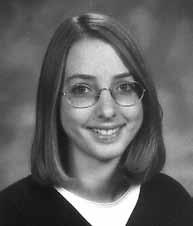
advice to a newbie. students really enjoy writing about things they are passionate about; it sure beats a paper about a book that had to be read.
The last bit of advice I will give is about how to really find out what is going on in your district. I have a small parent group, Band Parent Council, which meets once a month. We have divided up the Budget Committee meetings so one of us is always in attendance. Budget meetings must be public meetings and they are where a lot of directions and decisions are made about the budget.
I don’t believe school board testimony will really save our music programs. By the time the budget is submitted to the school board the decisions are pretty well made. But I do believe in looking for opportunities to be proactive like sending the personal statements to the board members and going to Budget Committee meetings. If a music program was in danger of being cut, you would first hear of it through the Budget Committee meeting before it becomes too late to save.
At our Band Parent Council, the parent that attended, reports and then we move to next steps if needed. By law, parents can also make statement and comments in the public part of the meeting. I have seen many athletic directors and sport parents make statements at every meeting about how important sports are which then reminds the committee that the community wants these things. This is just a tip I have picked up since I have begun to attend some of these meetings.
Music Advocacy is a huge topic and we hope to have some toolkits, suggestions, letters, videos and much more on the website. In the meantime I was encouraged to write this article to give high school teachers some ideas on how to get on the boat; while the boat might be travelling to the North Pole, if that is the destination then I would much rather ride than be paddling by myself.
“The Power of Music ... Changing Lives” is a series of four advocacy brochures designed by MENC for distribution to parents, school board members, elementary and secondary school principals, and anyone else who needs to understand and articulate the importance of music education. This article contains quotes and research from
Choices or Tough Times: The report of the new commission on the skills of the American workforce, 2007, page 29; www.skillscommision.org
the brochures for you to use to advocate for your music program. We hope that this information will help you prepare public statements about the importance of music. You need to become your own best advocate! We found this information to be very valuable and received permission to reprint the content of Music Matters brochures from MENC.
The brochures can be downloaded at http:// www.menc.org/resources/view/the-powerof-music-advocacy-brochure-series in PDF format so you can reproduce copies to hand out. Print copies are also available for purchase; visit http://www.menc.org/gp/menc-store or call 800-828-0229.
Perhaps the basic reason that every child must have an education in music is that music is a part of the fabric of our society. The intrinsic value of music for each individual is widely recognized in the many cultures that make up American life — indeed, every human culture uses music to carry forward its ideas and ideals. The importance of music to our economy is without doubt. And the value of music in shaping individual abilities and character are evident. – MENC
Data show that high earnings are not just associated with people who have high technical skills. In fact, mastery of the arts and humanities is just as closely correlated with high earnings, and, according to our analysis, that will continue to be true. History, music, drawing, and painting, and economics will give our students an edge just as surely as math and science will. – Tough
The arts provide one alternative for states looking to build the workforce of tomorrow - a choice growing in popularity and esteem. The arts can provide effective learning opportunities to the general student population, yielding increased academic performance, reduced absenteeism, and better skill building. An even more compelling advantage is the striking success of artsbased educational programs among disadvantaged populations, especially at-risk and incarcerated youth. For at-risk youth, that segment of society most likely to suffer from limited lifetime productivity, the arts contribute to lower recidivism rates; increased self-esteem; the acquisition of job skills; and the development of much needed creative thinking, problem solving and communications skills. Involvement in the arts is one avenue by which at-risk youth can acquire the various competencies necessary to become economically self-sufficient over the long term, rather than becoming a financial strain on their states and communities. – The Impact of Arts Education on Workforce Preparation, May 2002, The National Governors Association; http://www. nga.org/cda/files/050102ARTs ED.pdf
tion and authority if they are going to express themselves well. The sort of community created by the arts is non-hierarchical – a model of the responsiveness and interactivity that a good democracy will also foster in its political processes. And not the least, the arts can be a great source of joy. Participation in plays, songs and dances fills children with happiness that can carry over into the rest of their education.
We need to favor an education that cultivates the critical capacities, that fosters a complex understanding of the world and its peoples and that educates and refines the capacity for sympathy. In short, an education that cultivates human beings rather than producing useful machines. If we do not insist on the crucial importance of the humanities and the arts, they will drop away. They don’t make money; but they do something far more precious; they make the world worth living in. – Martha Nussbaum, Ernst Freund Distinguished service Professor of Law and Ethics, university of Chicago; Newsweek International, August 21 – 18, 2006; “Teaching Humanity”; http:// www.msnbc.msn.com/id/14322948/print/1/ displaymode/1098/
secondary students who participated in band or orchestra reported the lowest lifetime and current use of all substances (alcohol, tobacco, illicit drugs). – Texas Commission on Drug and Alcohol Abuse Report. Reported in Houston Chronicle, January 1998
The abilities associated with the humanities and the arts are vital, both to the health of individual nations and to the creation of a decent world culture. These include the ability to think critically, to transcend local loyalties and to approach international problems as a “citizen of the world”. And, perhaps most important, the ability to imagine sympathetically the predicament of another person. One of the best ways to cultivate sympathy is through instruction in literature, music, theatre, fine arts and dance.
When people put on a play, perform a dance piece together, or play music they learn to cooperate – and find they must go beyond tradi -

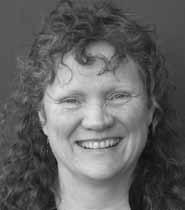
The u s. Department of Education lists the arts as subjects that college-bound middle and junior high school students should take, stating “Many colleges view participation in the arts and music as a valuable experience that broadens students’ understanding and appreciation of the world around them. It is also well known and widely recognized that the arts contribute significantly to children’s intellectual development.” In addition, one or two years of Visual and Performing Arts are recommended for collegebound high school students. – Getting Ready for College Early: A Handbook for Parents of students in the Middle and Junior High school
continued on page 66...
s econdary students who participated in band or orchestra reported the lowest lifetime and current use of all substances (alcohol, tobacco,
Years, u s . Department of Education, 1997; http://www.ed.gov/pubs/GettingReadyCollegeEarly/step2.html
The fact that choral singing is a communal activity is especially significant today when we increasingly rely on internet-based communications, rather than face-to-face interaction. several recent studies have shown a significant decline in civic engagement in our communities. Robert Putnam, Harvard university’s Kennedy school of Government scholar, asserts that the significance of choral singing goes beyond music making, and even beyond the arts. He sees group performing as contributing directly to the social trust and reciprocity that is the basis of civic engagement. His work shows that the mere existence of choral groups helps foster America’s democratic culture…
Chorus America found that choral singers are far more likely to be involved in charity work, as volunteers and as donors (76 %), than the average person (44% according to a 2001 report by Independent sector). Choral singers are also more than twice as likely as non-participants to be aware of current events and involved in the political process. They are also twice as likely as the general public to be major consumers
of other arts – and not just music. – America’s Performing Art: A s tudy of Choruses, Choral singers, and their Impact (Chorus Impact study, 2003); www.chorusamerica.org
Chorus America found that choral singers are far more likely to be involved in charity work, as volunteers and as donors (76 %), than the average person (44% according to a 2001 report by Independent sector). Choral singers are also more than twice as likely as non-participants to be aware of current events and involved in the political process.
s uccess in society, of course, is predicated on success in school. Any music teacher or parent of a music student can call to mind anecdotes about effectiveness of music study in helping children become better students. skills learned through the discipline of music, these stories commonly point out, transfer to study

skills, communication skills, and cognitive skills useful in every part of the curriculum. Another common variety of story emphasizes the way that the discipline of music study — particularly through participation in ensembles — helps students learn to work effectively in the school environment. – MENC
The term ‘core academic subjects’ means English, reading or language arts, mathematics, science, foreign languages, civics and government, economics, arts, history, and geography.”
– No Child Left Behind Act of 2002, Title IX, Part A, sec. 9101 (11)
“When I hear people asking how do we fix the education system, I tell them we need to do the opposite of what is happening, cutting budgets by cutting music programs…. Nothing could be stupider than removing the ability for the left and right brains to function. Ask a CEO what they are looking for in an employee and they say they need people who understand teamwork, people who are disciplined, people who understand the big picture. You know what they need? They need musicians.” – Former Arkansas Governor Mike Huckabee, MENC Centennial Congress, Orlando, Florida, June 2007
continued on page 68...

s chools that have music programs have significantly higher graduation rates than do those without programs (90.2% as compared to 72.9%). In addition, those that rate their programs as “excellent” or “very good” have an even higher graduation rate (90.9%). schools that have music programs have significantly higher attendance rates than do those without programs (93.3% as compared to 84.9%).
--Harris Interactive poll of high school principals conducted spring 2006; funded by MENC and NAMM. For more info, contact info@menc.org.
students in high-quality school music programs score higher on standardized tests compared to students in schools with deficient music education programs, regardless of the socioeconomic level of the school or school district. students in top-quality music programs scored 22% better in English and 20% better in math than students in deficient music programs. students in top-quality instrumental programs scored 19% higher in English than students in schools without a music program. students in top quality instrumental programs scored 17% higher in math than children in schools without a music program. s tudents at schools with excellent music programs had higher English and math test scores across the country than students in schools with low-quality music programs. students in all regions with lower-quality instrumental programs scored higher in English and math than students who had no music at all. – MENC Journal of Research in Music Education, Winter 2006, vol. 54, No. 4, pgs. 293- 307; “Examination of Relationship between Participation in school Music Programs of Differing Quality and standardized Test Results” Christopher M. Johnson and Jenny E. Memmott, university of Kansas

students of the arts continue to outperform their non-arts peers on the sAT, according to reports by the College Entrance Examination Board. In 2006, sAT takers with coursework/experience in music performance scored 57 points higher on the verbal portion of the test and 43 points higher on the math portion than students with no coursework or experience in the arts. scores for those with coursework in music apprecia-
tion were 62 points higher on the verbal and 41 points higher on the math portion. – The student Descriptive Questionnaire, a self-reported component of the sAT that gathers information about students’ academic preparation, gathered data for these reports. source: The College Board, Profile of College-Bound seniors National Report for 2006; www.collegeboard.com
Nearly 100% of past winners in the prestigious s iemens Westinghouse Competition in Math, science and Technology (for high school students) play one or more musical instruments.
schools that have higher levels of student participation in the fine arts receive higher academic ratings and have lower drop out rates. Average student enrollment in fine arts courses is 17 percent points higher in high schools that are rated “exemplary” than in those rated “low performing”, based on data from the Texas Education Agency on 951 high schools. schools with the lowest drop out rates on average have 52% of their students enrolled in fine arts classes while schools with the highest drop out rates have only 42% of their students in fine arts courses. The data from 864 middle schools followed the same trend as high schools. – Analysis conducted by the Texas Coalition for Quality Arts Education and the Texas Music Educators Association (www.tmea.org). Full report: www.music-for-all. org/WME/documents/TexasArtsstudy.pdf
Nearly 100% of past winners in the prestigious siemens Westinghouse Competition in Math, science and Technology (for high school students) play one or more musical instruments. This led the siemens Foundation to host a recital at Carnegie Hall in 2004, featuring some of these young people, after which a panel of experts debated the nature of the apparent science/ music link. – The Midland Chemist (American Chemical s ociety) Vol. 42, No.1, Feb. 2005
The Georgia Project found that school districts in Georgia that made staffing and funding of their arts programs a priority tended to have higher overall rates of student participation in the arts, and higher rates of student retention. such districts tend to have lower dropout rates in grades 9 – 12 and thus keep their students in school longer and graduate more of them. students tended to score higher on achievement and performance tests, such as the sAT and Georgia High school Graduation Test. They tended to graduate more of their students with college prep diplomas, percentages increasing with diversity of arts curriculum and percent of students participating. While these findings do not prove a cause and effect relationship, they do indicate “strong arts programs need not come at the expense of academic achieve -
ment. Rather, the arts are an important factor in achieving academic excellence.” – Executive summary, The Georgia Project: A status Report on Arts Education in the state of Georgia, 2004; Dr. John Benham, President, Music in World Cultures Program, Bethel university, st. Paul, MN
ing of music, so that there is a dialogue between the different kinds of learning.” – from the Music in Education National Consortium, Journal for Learning through Music, second Issue, summer 2003, “What Makes Music Work for Public Education?” - pg. 87 Dr. Martin F. Gardiner, Brown university;http://www.music-in-education.org/
“Music is an extremely rich kind of experience in the sense that it requires cognition, it requires emotion, it requires aesthetics, it develops performance skills, individual capabilities. These things have to be developed and all have to be synchronized and integrated so that, as a person learns music, they stretch themselves mentally in a variety of ways. What we are finding is that the kind of mental stretching that takes place can be of value more generally, that is, to help children in learning other things. And these other things, in turn, can help them in the learn -
Harvard Project Zero (http://pzweb.harvad. edu/) researcher Larry s cripp investigated how intensive music study could serve as the basis for academic excellence. His research at Conservatory Lab Charter school (http://www. conservatorylab.org/learning.html) attempted to identify innovative ways to incorporate music into the curriculum and then measure its impact. Among his findings: notational skills in music, not musical performance, correlate positively with achievement in math and reading. According to scripp, “The ability to process musical symbols and representations, a skill relegated to the training of the talented few in the past, is a leading predictor of music’s association with learning in other subject areas”. He also found that musical pitch is more predictive of mathematical ability while rhythm is more predictive of reading ability.
James Catterall (Prof. of Education, u CLA) stated, in response to scripp, that “since our education systems ideally focus on academic and social development, the arts should legitimately be considered in the array of potential instructional strategies contributing to these goals”. -- EXCERPTED from Terry Teitelbaum, stephanie F. Gillis, “Arts Education: A Review of the Literature”, Blueprint Research and Design, Inc.; prepared for the Performing Arts Program of the William and Flora Hewlett Foundation, 11/03, updated 2/04) http://www.hewlett.org
success in school and in society depends on an array of abilities. Without joining the intense ongoing debate about the nature of intelligence as a basic ability, we can demonstrate that some measures of a child’s intelligence are indeed increased with music instruction. Once again, this burgeoning range of data supports a
“The ability to process musical symbols and representations, a skill relegated to the training of the talented few in the past, is a leading predictor of music’s association with learning in other subject areas”.
long-established base of anecdotal knowledge to the effect that music education makes kids smarter. What is new and especially compelling, however, is a combination of tightly controlled behavioral studies and groundbreaking neurological research that show how music study can actively contribute to brain development.
– MENCResults of an IQ test given to groups of children (total: 144) who were provided with lessons in keyboard, voice, drama or no lessons at all, showed that the IQ of students in the keyboard or voice classes increased from their pre-lesson IQ score, more than the IQ of those students taking drama or no lessons. Generally these increases occurred across IQ subtests, index scores, and academic achievement. -- summary by MENC; Original source: August 2004, Psychological science, a journal of the American Psychological s ociety; http://www. psychologicalscience.org/pdf/ps/musiciq.pdf; Dr. E. Glenn schellenberg (university of Toronto)
C., & Chan, A. Music training improves verbal but not visual memory: cross-sectional and longitudinal explorations in children (2003) Neuropsychology, 12, 439-450.
A 2004 stanford university study showed that mastering a musical instrument improves the way the human brain processes parts of spoken language. In two studies, researchers demonstrated that people with musical experience found it easier than non-musicians to detect small differences in word syllables. They also discovered that musical training helps the brain work more efficiently in distinguishing splitsecond differences between rapidly changing sounds that are essential to processing language. About 40 adults, divided into groups of musicians and non-musician, matched by age, sex, general language ability and intelligence, were tested. To qualify, the musicians need to have started playing instruments before age 7 and never stopped, practicing several hours/
week. Functional magnetic resonance imaging showed the musicians had more focused, efficient brain activity. “This is the first example showing how musical training alters how your brain processes language components.” – Prof. John Gabrieli, former stanford psychology professor, now associate director of MIT’s Athinoula A. Martinos Center for Biomedical Imaging. (http://news-service.stanford.edu, Nov. 2005)
Young children who take music lessons show different brain development and improved memory over the course of a year, compared to children who do not receive musical training. The brains of musically trained children respond to music in a different way than those of untrained children, and that the musical training improves their memory. After one year the musically trained children performed better in a memory test that is correlated with general intelligence skills such as literacy, verbal memory, Visio spatial processing, mathematics and IQ. Dr. Laurel Trainor, Prof.
Children with music training had significantly better verbal memory than those without such training, and the longer the training, the better the verbal memory. Researchers studied 90 boys between the ages of 6 and 15. Half had musical training as members of their school’s string orchestra program, plus lessons in playing classical music on Western instruments like the flute or violin for one to five years. The other 45 students had no training. students with musical training recalled more words in a verbal memory test than did untrained students, and after a 30-minute delay, students with training also retained more words than the control group. In a follow-up one year later, students who continued training and beginners who had just started learning to play both showed improvement in verbal learning and retention. -- summary by MENC. Original source: Ho, Y. C., Cheung, M.

After one year the musically trained children performed better in a memory test that is correlated with general intelligence skills such as literacy, verbal memory, Visio spatial processing, mathematics and IQ.
of Psychology, Neuroscience, and Behaviour at McMaster university, Director of the McMaster Institute for Music and the Mind; Canada; published 9/20/06; http://www.sciencedaily.com/ releases/2006/09/060920093024.htm
Playing a musical instrument significantly enhances the brainstem’s sensitivity to speech sounds. This relates to encoding skills involved with music and language. Experience with music at a young age can “fine-tune” the brain’s auditory system. – from a study supported by Northwestern university, grants from the National Institutes of Health, and the National science Foundation. Nina Kraus, director of NWu’s Auditory Neuroscience Laboratory and senior author of the study, which appeared in April 2007 Nature Neuroscience. Other contributing researchers/authors: Patrick Wong, primary author “Musical Experience s hapes Human Brainstem Encoding of Linguistic Pitch Patterns” Other researchers Erika s koe, Nicole Russo, Tasha Dees; info from www.sciencedaily.com
A study of 31 children found that children who received keyboard instruction for two years beginning at age 3 continued to score higher on spatial-temporal and arithmetic tasks two years after the instruction was terminated (Rauscher & LeMieux, 2003). The age at which children begin instruction appears to affect the duration of extra-musical cognitive outcomes, and longitudinal research suggests that at least two years of music instruction are required for sustained enhancement of spatial abilities (Rauscher, 2002); ERIC Clearinghouse on Early Education and Parenting , Can Music Instruction Affect Children’s Cognitive Development? ERIC Digest; Frances H. Rauscher; ERIC Identifier: ED480540, Publication Date: 09/2003. http:// www.ericdigests.org/2004-3/cognitive.html
“Academic work is really about certain types of deductive reasoning, especially some forms of verbal and mathematical reasoning. Developing these abilities is an essential part of education. But if intelligence were limited to academic ability most of human culture would never have happened. There’d be no practical technology, business, music, art, literature, architecture, love, friendship or anything else. These are big ideas to leave out of our common-sense view
of intelligence and educational achievement.” sir Ken Robinson, s enior Advisor, Education Policy, Getty Foundation, in an Arts and Minds: Conversations about the Arts interview; Education Commission of the states, April 2005 How Creativity, Education and the Arts s hape a Modern Economy; http://www.ecs.org/clearinghouse/60/51/6051.pdf
Each of us wants our children — and the children of all those around us — to achieve success in school, success in employment, and success in the social structures through which we move. But we also want our children to experience “success” on a broader scale. Participation in music, based on grounding in music education during the formative school years, brings countless benefits to each individual throughout life. The benefits may be psychological or spiritual, and they may be physical as well. – MENC
plexity, pattern recognition and development, symbolic and metaphoric representation, and qualitative judgment. We use these same thinking tools in science, philosophy, math and history. The advantage of the arts is that they link cognitive growth to social and emotional development. students care more deeply about what they study, they see the links between subjects and their lives, their thinking capacities grow, they work more diligently, and they learn from each other.” -- Nick Rabkin, Executive Director of the Center for Arts Policy, Columbia College Chicago; Robin Redmond, associate director of CAP. “The Art of Education success”, Washington Post, January 8, 2005, pg. A19
To put it simply, we need to keep the arts in education because they instill in students the habits of mind that last a lifetime: critical analysis skills, the ability to deal with ambiguity and to solve problems, perseverance and a drive for excellence. Moreover, the creative skills children develop through the arts carry them toward new ideas, new experiences, and new challenges, not to mention personal satisfaction. This is the intrinsic value of the arts, and it cannot be overestimated. -- Education Week, Issue 20, vol. 24, pg. 40, 52; Jan 26, 2005, Rod Paige (former u.s. secretary of Education), Mike Huckabee, former Governor of Arkansas, Education Commission of the states Chairman (www.ecs.org), Chairman’s Initiative on the Arts in Education
“The arts are not just affective and expressive. They are also deeply cognitive. They develop the tools of thinking itself: careful observation of the world, mental representation of what is observed or imagined, abstraction from com -
An education rich in the arts and humanities develops skills that are increasingly crucial to the productivity and competitiveness of the nation’s workforce: the ability to think creatively, communicate effectively and work collaboratively, and to deal with ambiguity and complexity. Just as important, exposure to the arts and humanities fosters cultural literacy: the ability to understand and appreciate other cultures, perspectives and traditions; to read and understand music and literature; to craft a letter or essay; to design a Web site; and to discern the “hidden persuaders” in a political or commercial advertisement. Arts and humanities education also develops skills necessary to participate in one of the fastest-growing, economically significant set of occupations and industries in the American economy – the arts, cultural and intellectual property section. The “creative workforce” – which includes traditional artist categories (dancers, musicians, painters, actors, photographers, authors), as well as individuals employed in advertising, architecture, fashion design, film, video, music, publishing and software development – is growing at a rate more than double that for the rest of the nation’s workforces. -- summary of paper by Prof. Ann M. Galligan, Northeastern university, in her paper “Creativity, Culture, Education and the Workforce”, Center for Arts and Culture, December 2001, www.culturalpolicy.org; summary provided/written by s uzanne Weiss, in the “Progress of Education Reform 2004: The Arts in Education”; vol. 5, no. 1, January 2004,
continued on page 72...
“I dream of a day when every child in America will have in his or her hand a musical instrument, be it a clarinet, a drumstick or a guitar."
Education Commission of the s tates; http:// www.ecs.org/clearinghouse/49/91/4991.pdf
While many executives turn to golf, tennis or boating for recreation, some unwind by making music together. They may be members of relatively large organizations like the Park Avenue Chamber symphony, whose 55 members are almost all executives, or of smaller outfits, like a rock ‘n roll band or a jazz ensemble. Beyond the pure pleasure the music brings, some executives say, there can be chances to advance a career. And creating a performance can help executives develop basic management skills. “If you are in an improv jazz ensemble or a small chamber group, you learn to think fast on your feet and how to be flexible and to collaborate and compromise, and that may yield a creative outcome.” (J. Richard Hackman, a professor of organizational psychology at Harvard university who has studied symphony orchestras). Amy Zipkin, “Learning Teamwork by Making Music”, for the New York Times, 11/16/03.
“I dream of a day when every child in America will have in his or her hand a musical instrument, be it a clarinet, a drumstick or a guitar. And I dream of a day when there’s no state legislature that would even consider cutting funding for music and the arts because they realize that it’s a life skill that changes the lives of students and gives them not only better academic capability, but it makes them better people. We
sometimes forget that many of us in this room, including this guy standing right in front of you, would not be where he is today if not for having music introduced in my life because it gave me the understanding of teamwork, discipline and focus.” -- Mike Huckabee, Former Arkansas Governor; NAMM university Breakfast sessions 2007, NAMM Playback Magazine, spring 2007, pg. 36; www.namm.com
is
“Music has a great power for bringing people together. With so many forces in this world acting to drive wedges between people, it’s important to preserve those things that help us experience our common humanity.” – Ted Turner, Turner Broadcasting system
“Music is one way for young people to connect with themselves, but it is also a bridge for connecting with others. Through music, we can introduce children to the richness and diversity of the human family and to the myriad rhythms of life.” –
Daniel A. Carp, Eastman Kodak Company Chairman and CEO“Casals says music fills him with the wonder of life and the ‘incredible marvel’ of being a human. Ives says it expands his mind and challenges him to be a true individual. Bernstein says it is enriching and ennobling. To me, that sounds like a good cause for making music and the arts an integral part of every child’s education. studying music and the arts elevates children’s education, expands students’ horizons, and teaches them to appreciate the wonder of life.”
– u s secretary of Education Richard W. Riley, July 1999
I have made a career doing things that weren’t even invented when I graduated from high school 40 years ago. It will be the same for today’s graduates, only on a sharply accelerating timeline. Much of what I learned in the classroom is obsolete or, at best, only marginally useful. What has made a difference in my life has been the ability to learn as I go, to adapt to new ideas, to have the courage to take risks, and to feel confident I will be able to perform and successfully meet the challenges of new situations. These skills I learned through participation in band and drama. - Fred Behning retired from IBM Corporation after a 32-year career that included assignments in systems engineering, product development, management, and customer technology briefings, and is still an IBM consultant. A life-long musician, Fred plays oboe and English horn in the Williamson County symphony Orchestra and the Austin symphonic Band. http://www.supportmusic.com
“The life of the arts, far from being an interruption, a distraction, in the life of the nation,
close to the center of a nation’s purpose - and is a test to the quality of a nation’s civilization.” – John F. Kennedy